Sites: news | india | latam | brasil | indonesia
Feeds: news | india | latam | brasil | indonesia
topic: Biofuels
Social media activity version | Lean version
Can land titles save Madagascar’s embattled biodiversity and people?
- Through its Titre Vert or Green Title initiative, the Malagasy government is opening up a path to land ownership for its most vulnerable citizens in the hopes it will help tackle hunger, internal migration, and forest loss.
- The state is using the initiative to lean on potential migrants to remain in the country’s deep south, where five years of failed rains have left 2 million people hungry, instead of migrating north, where they are often blamed for social tensions and for destroying forests.
- This March, the Malagasy government started work on a Titre Vert enclave in the Menabe region, a popular destination for migrants from the drought-hit south, to dissuade them from clearing unique dry forests to grow crops.
- Critics say the government is holding people back in a rain-starved region without providing enough support; in Menabe, backers of the project hope to provide ample assistance to get migrants out of the forests and onto their feet.
Forests in the furnace: Can fashion brands tackle illegal logging in their Cambodian supply chains?
- Global fashion brands touting sustainability claims continue to buy from their contract factories in Cambodia that burn illegally logged wood in their boilers.
- Mongabay reached out to 14 international brands that listed factories identified in a report as using illegal forest wood, but they either didn’t respond or evaded questions on illegal logging in their supply chains.
- One prominent brand, Sweden’s H&M, has developed an app that allows its partner factories to identify deliveries of forest wood, but industry insiders say there are ways to circumvent it, and that the government should be playing a bigger role in the issue.
- This story was supported by the Pulitzer Center’s Rainforest Investigations Network where Gerald Flynn was a fellow. *Names have been changed to protect sources who said they feared reprisals from the authorities.
Villagers turn to charcoal made from bamboo to save a protected forest in Madagascar
- Rice paddies have become silted up around Ankarafantsika National Park in northwestern Madagascar. To survive, local residents are forced to illegally exploit the forest’s natural resources.
- To reduce their dependency on the forest, local communities are planting the versatile bamboo species from Asia to make charcoal and restore watersheds.
- Although the exotic bamboo species can be used to protect the forest and watersheds, scientists raise concerns about the ecological impacts of its use.
Seas of grass may be dark horse candidate to fuel the planet — or not
- Several kinds of grasses and woody shrubs, such as poplar and willow, have undergone U.S. testing for years to see if they can achieve high productivity as cellulose-based liquid biofuels for cutting greenhouse gas emissions in the global transportation sector. Some of these grasses also would have value as cover crops.
- While these experiments showed promise, the challenges for scaling up production of grass and woody shrub-derived biofuels over the next few decades remain significant. And time is short, as climate change is rapidly accelerating.
- Another roadblock to large-scale production: Millions of acres of land in the U.S. Southeast and Great Plains states would need to be earmarked for grass cultivation to make it economically and commercially viable as a biofuel.
- If many of those millions of acres required conversion of natural lands to agriculture, then deforestation and biodiversity loss due to biofuel monoculture crop expansion could be a major problem. On the plus side, grass biofuel crops likely wouldn’t directly displace food crops, unlike corn to make ethanol, or soy to make biodiesel.
Sargassum surges in Mexico: From nuisance to new green industry?
- Since 2011, sargassum has worsened as a nuisance — possibly due to an influx of synthetic fertilizers into the Atlantic Ocean — with the brown algae washing up on Caribbean beaches where it rots, stinks like rotten eggs and devastates tourism, including in Mexico where 30 million go for beach holidays annually.
- Sea currents have made the beaches of the Mexican state of Quintana Roo a leading arrival point for the annual surge. So early on, scientists, members of civil society, politicians and businesspeople worked together to find solutions and turn the huge waste problem into an opportunity for new green businesses.
- Once cleaned of heavy metals, microplastics, sand and other detritus, sargassum is finding many uses, particularly as biogas, but also biofertilizer, cellulose packaging and even artificial vegan leather. But a national law regulating sargassum remains elusive, with the issue tangled up in Mexican bureaucracy.
- Debate is ongoing as to who should pay for disposal, for expensive recollection and transport of the algae. As entrepreneurs experiment, Mexico has become a regional leader in creating a sargassum industry, with other Caribbean nations seeking to learn from Mexico’s business mistakes and copying its successes.
From palm oil waste to cellulosic ethanol: Indonesia’s opportunity (commentary)
- Many Indonesian farmers say they haven’t seen benefits from the country’s biofuel program. Cellulosic ethanol could help fix the problem, a new op-ed says.
- Tenny Kristiana of the International Council on Clean Transportation argues Indonesia could develop a domestic cellulosic ethanol industry that would use leftover plant residues such as palm trunks, empty palm fruit bunches and palm press fiber.
- Currently, Indonesia exports these leftovers to countries like Japan, but developing an industry at home could aid local farmers and create new jobs in factories, transportation and plantation work.
- This post is a commentary. The views expressed are those of the author, not necessarily of Mongabay.
Crud-to-crude: The global potential of biofuels made from human waste
- Creating liquid biofuels from human waste shows promise as a way to meet one of alternative energy’s greatest challenges: reducing the transportation sector’s heavy carbon footprint. The good news is there is a steady supply stream where waste is treated.
- Humanity produces millions of tons of sewage sludge annually via wastewater treatment. Existing disposal methods include landfilling, application on agricultural land, and incineration; each with social and environmental consequences.
- Harnessing the carbon-rich potential of sludge as a transportation fuel for planes, ships and trucks is part of a drive toward zero waste and creating a circular economy, say experts. A host of projects are underway to prove the effectiveness of various methods of turning all this crud into biocrude.
- Some techniques show promise in lab and pilot tests, but large-scale industrial plants have yet to be built. Using pollutant-laden sewage sludge as a biofuel comes with its own environmental concerns, but lacking a silver-bullet solution to the human waste problem, it could be part of a suite of best alternatives.
As Exxon bows out, industry takes step toward sustainable algae biofuels
- In February, ExxonMobil gave up its decade-long attempt to cultivate algae as a profitable and scalable feedstock for biofuel — a liquid alternative energy source needed to power aviation, ocean-going ships, and long-distance trucking, while also combating climate change.
- That corporate setback was offset by advances elsewhere in the industry: California-based algae biofuel company Viridos, which lost ExxonMobil as its partner, raised $25 million this year as it gained United Airlines, Chevron and Breakthrough Energy Ventures as investors to keep its algae project moving toward commercialization.
- Also, this year, the U.S. Department of Energy Bioenergy Technologies Office (BETO) funded four major algae biofuel and biomass projects to chart scalable production processes and achieve low-carbon intensity efficiency.
- Several of these algae initiatives are now moving from basic R&D into pilot programs, with scaled-up commercial production possibly just a few years away, according to industry experts. Environmentalists are concerned about future land, energy and fertilizer impacts during production, though say it is too early to assess potential commercialization effects.
Jatropha: The biofuel that bombed seeks a path to redemption
- Earlier this century, jatropha was hailed as a “miracle” biofuel. An unassuming shrubby tree native to Central America, it was wildly promoted as a high-yielding, drought-tolerant biofuel feedstock that could grow on degraded lands across Latin America, Africa and Asia.
- A jatropha rush ensued, with more than 900,000 hectares (2.2 million acres) planted by 2008. But the bubble burst. Low yields led to plantation failures nearly everywhere. The aftermath of the jatropha crash was tainted by accusations of land grabbing, mismanagement, and overblown carbon reduction claims.
- Today, some researchers continue pursuing the evasive promise of high-yielding jatropha. A comeback, they say, is dependent on cracking the yield problem and addressing the harmful land-use issues intertwined with its original failure.
- The sole remaining large jatropha plantation is in Ghana. The plantation owner claims high-yield domesticated varieties have been achieved and a new boom is at hand. But even if this comeback falters, the world’s experience of jatropha holds important lessons for any promising up-and-coming biofuel.
A liquid biofuels primer: Carbon-cutting hopes vs. real-world impacts
- Liquid biofuels are routinely included in national policy pathways to cut carbon emissions and transition to “net-zero.” Biofuels are particularly tasked with reducing emissions from “hard-to-decarbonize” sectors, such as aviation.
- Three generations of biofuel sources — corn, soy, palm oil, organic waste, grasses and other perennial cellulose crops, algae, and more — have been funded, researched and tested as avenues to viable low-carbon liquid fuels. But technological and upscaling challenges have repeatedly frustrated their widespread use.
- Producing biofuels can do major environmental harm, including deforestation and biodiversity loss due to needed cropland expansion, with biofuel crops sometimes displacing important food crops, say critics. In some instances, land use change for biofuels can add to carbon emissions rather than curbing them.
- Some experts suggest that the holy grail of an efficient biofuel is still obtainable, with much to be learned from past experiments. Others say we would be better off abandoning this techno fix, investing instead in electrifying the transportation grid to save energy, and rewilding former biofuel croplands to store more carbon.
Indonesia’s biofuel push must go beyond palm oil to reduce risk, experts say
- Indonesia faces deforestation, energy and security risks from its overreliance on palm oil as a feedstock for its biofuel transition program, observers say.
- The government will in February increase the biofuel blend in diesel to 35%, from the current 30%, with an eye on a 50:50 blend by 2025 — and eventually fossil-free biodiesel.
- But the program calls for a massive increase in palm oil production — and with yields largely stagnant, this will almost certainly mean clearing more land to establish new oil palm plantations.
- Experts say the government should diversify its sources of biofuel feedstock to curb the expansion of plantations into forests and to reduce the other risks that comes from relying on a single feedstock.
Nigerian refugees in Cameroon turn biomass into charcoal to spare trees
- An initiative producing charcoal from food waste aims to ease pressure on forests around the Minawao refugee camp in Cameroon.
- An influx of refugees from neighboring Nigeria fleeing Boko Haram has led to a surge in tree felling for fuelwood and sparked conflict with local residents.
- The eco-charcoal initiative relies on feedstock such as corn cobs, groundnut shells, rice husks, grass, fallen tree leaves, and other organic household waste to make the briquettes.
- The program has also trained at least 8,000 families to make their own eco-charcoal, but getting it to a price that’s competitive with firewood and ensuring a sustainable supply of feedstock remain challenges.
Slick operator: Indonesian cooking oil probe may spread to biodiesel industry
- A top economist in Indonesia has been charged for his alleged role in helping palm oil companies export the commodity instead of selling it domestically — a practice blamed for a shortage of cooking oil in the world’s top producer of palm oil.
- The arrest of Lin Che Wei, who prosecutors allege was “involved in every palm oil policy,” also puts the spotlight on the state palm oil fund that he helped create and that disproportionately channels subsidies to many of the same companies implicated in the cooking oil scandal.
- President Joko Widodo has called for a thorough investigation to “find out who is playing a game here,” but the palm oil lobby has pushed back against what it says is a vilification of the industry — even threatening to stop producing cooking oil for the domestic market.
- The cooking oil shortage has battered domestic trust in Indonesia’s powerful palm oil industry, whose reputation abroad has long been tarnished by its links to deforestation, labor abuses, and conflicts with Indigenous and local communities.
For Indonesians, palm oil is everywhere but on supermarket shelves
- Indonesia is the world’s top producer of palm oil, but has in recent months been hit by scarce supplies and high prices for vegetable oil.
- The country’s business competition regulator points to indications of cartel practices by the handful of conglomerates that dominate the industry.
- But government policies may also be to blame, experts say, including incentivizing palm oil producers to sell to the government’s biofuel program instead of to cooking oil refiners.
- Parliament has called hearings on the issue, while the competition watchdog has launched a formal investigation.
Can the little-known tamanu tree replace palm oil in Indonesia’s biofuel bid?
- Government researchers in Indonesia believe oil from the tamanu tree (Calophyllum inophyllum) could serve an alternative feedstock for biofuel to palm oil.
- They say the plant has shown the ability to grow in burned areas and former mining sites, as well as in waterlogged peat soils.
- Oil from the tree, native to tropical Asia, has been used for centuries across the region as a salve for wounds and scars, and in lotions and balms.
- With the Indonesian government’s ambitious biodiesel program requiring the establishment of more oil palm plantations, alternative feedstocks like tamanu could help stave off the associated deforestation.
Brazil’s biofuel program sputters on weak emissions accounting
- The RenovaBio program has been encouraging biofuel producers in Brazil to emit less carbon dioxide since the end of 2019.
- The program survived a rocky first year brought on by the COVID-19 pandemic and volatility in the carbon credit market, but still has some weaknesses that must be addressed, experts say.
- For one thing, the program doesn’t account for emissions from land use and indirect deforestation, which are significant factors in the production of soybeans, from which 70% of Brazil’s biodiesel is derived.
- While Brazil is investing heavily in biofuels as an energy solution, a new report by the International Energy Agency suggests that by 2050, half of emission cuts should come from experimental technologies like advanced batteries for electric vehicles and hydrogen production systems.
From a nuisance to a benefit, ‘world’s worst weed’ finds new use as biofuel
- A startup in western Kenya has developed a process of making bioethanol from water hyacinths, addressing both the need for a clean fuel alternative to charcoal and fuelwood, and the spread of the invasive hyacinths.
- Proponents say a key advantage of this “second-generation” bioethanol over traditional feedstocks such as sugarcane and corn is that it avoids competition for limited agricultural land.
- But although this new bioethanol relies on a plentiful feedstock and is cheaper to produce than charcoal, it’s still more expensive for end users because of limited distribution and the need to buy a compatible stove.
- Proponents say they’re determined to scale up production and distribution, pointing out that they’re “turning something harmful into something beneficial.”
Turning Kenya’s problematic invasive plants into useful bioenergy
- The shores of Lake Victoria are clogged with water hyacinth, a South American invasive plant that is hurting Kenya’s freshwater fishery, economy and people’s health. While manual removal is effective, it is labor intensive and can’t keep up with the spreading plant.
- Kenyans are innovating to find ways to reduce water hyacinth by finding practical uses for the invader. In 2018, a program was launched to turn the exotic species into biogas which is then offered to economically vulnerable households to use as a biofuel for cooking.
- One proposal being considered: a scaled up industrial biogas plant that would use water hyacinth as a primary source of raw material. Efforts are also underway to convert another invasive plant, prickly pear into biogas used for cooking. A biocontrol insect is also proving effective, though slow, in dealing with prickly pear.
- These economically viable and sustainable homegrown solutions are chipping away at Kenya’s invasive species problem, though to be truly effective, these various projects would need to be upscaled.
Indonesia bets on biofuels over oil, but EVs could render both moot
- Increased adoption of electric vehicles could render redundant Indonesia’s biofuel infrastructure, which the government is touting as its chosen alternative to fossil fuels.
- A new report projects demand for biofuel more than halving as EVs take hold, even as the government continues to invest heavily in refineries and other infrastructure for producing and distributing palm oil-based biodiesel.
- The report calls for a long-term plan for biofuel that takes into account the rapid development of EVs and that doesn’t rely solely on palm oil for feedstock.
Playing the long game: ExxonMobil gambles on algae biofuel
- Algae biofuel initially looked promising, but a few key problems have thwarted major research efforts, including development of a strain of algae able to produce plentiful cheap fuel, and scaling up to meet global energy demand.
- Other alternative energy solutions, including wind and solar power, are outpacing algae biofuel advances.
- Much more investment in money and time is needed for algae biofuel to become viable, even on an extended timeline out to mid-century. While big players like Shell and Chevron have abandoned the effort, ExxonMobil continues work.
- In 2017, ExxonMobil, with Synthetic Genomics, announced they had used CRISPR gene-editing technology to make an algal strain that could pave the way to a low-carbon fuel and a sustainable future. But many environmentalists met the claim with skepticism, suspecting greenwashing.
Biofuel in Mexico: Uphill battle against bureaucracy, organized crime
- Biofuels based on pressed plant oils, and made especially from used cooking oil, could help Mexico’s public transport sector transition to a cleaner and climate-friendly energy era, according to researchers and industry entrepreneurs.
- But there is a lack of government regulatory support, while the nation’s new president is betting on fossil fuels and neglecting biodiesel options and nature-based climate solutions.
- As a result, small biodiesel producers have to operate in a legal gray zone, while industry entrepreneurs are held back in the development of the technology and the market.
- Mexico isn’t alone: Many nations large and small are struggling with hurdles imposed by fossil fuel-friendly governments and a lack of supportive regulations to create a level playing field for the rapid development and deployment of biodiesel and other climate-friendly alternative energy solutions.
Converting biowaste to biogas could power cleaner, sustainable Earth future
- Biogas made from organic materials — including food and agricultural waste, and animal or human manure — is a renewable, sustainable, affordable and inclusive energy alternative becoming increasingly available to households, farms, municipalities and nations.
- Converting biowaste into biogas, via anaerobic digestion technology, is a strategy that could contribute to multiple U.N. Sustainable Development Goals and the Paris climate agreement. Biodigesters are already in use to meet a range of energy needs around the world.
- Current limiting factors to the sector’s growth include technical and adaptive challenges, lack of awareness in many regions, and unsupportive policy instruments that can discourage biogas adoption.
- Ahead of COP26, the critically important U.N. climate meeting coming this November, the World Biogas Association is urging governments to integrate biogas into their Nationally Determined Contributions — their voluntary emissions reduction targets, as agreed to under the Paris Agreement.
Cleaning up Cambodia’s kitchens could curb deforestation, climate change
- NGOs and companies across Cambodia are taking action in response to the mass use of charcoal and forest biomass in household and restaurant kitchens countrywide. The shift away from these polluting fuel sources to cleaner energy alternatives is being sparked by health and environmental concerns.
- Education is a key strategy for implementing the shift away from charcoal and wood, as their use is ingrained in the culture, with many Cambodians saying food doesn’t taste as good when cooked with other fuels.
- One innovative solution is turning the country’s coconut husks into “green charcoal,” which is already earning the nation recognition for being a global leader within the sustainable charcoal sector.
- Cambodia’s farmers are also moving away from using forest biomass for energy, and are instead utilizing biodigesters to turn household and farm waste into biogas for cooking and to make organic fertilizer.
Scientists call for solving climate and biodiversity crises together
- A new report from United Nations’ Intergovernmental Panel on Climate Change (IPCC) and the Intergovernmental Science-Policy Platform on Biodiversity and Ecosystem Services (IPBES) highlights the importance of confronting climate change and biodiversity loss together.
- Global climate change and the unprecedented loss of species currently underway result from a similar suite of human-driven causes, the report’s authors write.
- As a result, solutions that take both issues into account have the best chance of success, they conclude.
Indonesia’s biodiesel program fuels deforestation threat, report warns
- A new report adds to warnings that Indonesia’s biodiesel program will drive greater deforestation by boosting demand for palm oil.
- It says contradictory and opaque government policies “create conditions for producers to maintain business-as-usual production systems, instead of investing in more sustainable production innovations, such as increasing land productivity.”
- Experts also say the biodiesel program should only serve as a transition to more sustainable forms of renewable energy, and not the long-term solution that the government is touting.
- Palm oil plantations are the single biggest driver of deforestation in Indonesia.
Indonesian president slammed for ‘wait-and-see’ approach on climate action
- During last month’s climate summit of world leaders, top emitters announced more ambitious climate targets in a bid to combat climate change.
- Missing from that list was Indonesia, whose president, Joko Widodo, instead called on industrialized countries to set an example for other nations to follow.
- Climate and policy experts in Indonesia say his failure to announce a bold target for achieving net-zero emissions is a missed opportunity for Indonesia to show global leadership based on its success in reducing deforestation.
- They also criticized a government proposal, not yet officially endorsed by the president, to achieve carbon neutrality by 2070 — 20 years later than most other major emitters.
Belgium-sized swath of forest faces the chop from Indonesian palm oil
- Curbing deforestation associated with the palm oil industry is crucial if Indonesia wants to meet its long-term emissions reduction targets, experts say.
- There are still 3.5 million hectares (8.65 million acres) of natural forest inside existing oil palm concessions that could potentially be cleared in as little as three years as demand for palm oil continues to grow.
- Experts have called on the government to save these forests by extending and strengthening a moratorium on licensing new plantations.
- They also call for the adoption of the high conservation value and high carbon stock approaches to identifying areas to protect.
Belgium bans biofuels made from palm oil, soy
- Belgium will ban biofuels made from soy and palm oil from 2022 onward as part of its effort to combat deforestation, said Federal Minister of Environment and Climate Zakia Khattabi on Tuesday.
- In making the move, Belgium joins Denmark, France, and the Netherlands as other European nations that have barred palm oil-based biodiesel due the crop’s association with large-scale conversion of native forests and peatlands for industrial plantations, especially in Malaysia and Indonesia.
- The ban was the first measure Belgium has taken since it became a member of the Amsterdam Declaration Partnership, which aims to eliminate deforestation from agricultural commodities by 2025.
Indonesia’s five most consequential environmental stories of 2020
- 2020 has been a momentous year for Indonesia’s environment, and for the regulations and regulators put in place to protect it.
- Perhaps most far-reaching is the passage of a massive deregulation bill critics warn will cater to the business community at the expense of the environment and social interests.
- The COVID-19 pandemic has also had a significant impact on conservation efforts in the country, putting the brakes on key conservation programs and potentially driving an increase in deforestation and poaching.
- Here, Mongabay reviews five of the key stories and trends from Indonesia in 2020.
Top Indonesian palm oil developments in 2020
- A persistent pandemic, fluctuating palm oil prices and escalating conflicts failed to slow the environmental and social fallouts from the growth of the palm oil industry in Indonesia, the world’s biggest producer of the commodity.
- There’s growing fear over accelerated deforestation to clear land for more plantations as the government continues to promote palm oil-based biodiesel — even as others refuse to recognize it as a renewable fuel.
- The country’s new palm oil frontier, in the forests of Papua, is tainted by allegations of falsified permits and violence against Indigenous communities.
- At the same time, new legislation exempts plantation operators from environmental requirements and allows for the whitewashing of illegal plantations in forests.
Indonesia’s biofuel bid threatens more deforestation for oil palm plantations
- The Indonesian government says it will need to establish new oil palm plantations a fifth the size of Borneo in order to supply its ambitious biodiesel program.
- The program, through which Indonesia plans to eventually phase out the use of conventional diesel, will require planting 15 million hectares (37 million acres) of oil palms, according to the energy minister.
- Energy and environmental experts say it’s inevitable that massive swaths of forest will have to be cleared to meet this target, and have called for it to be scaled back.
- They also question the drive to ramp up the biodiesel program, given that Indonesia has expressed its ambitions to be a global production hub for electric vehicles — which don’t run on diesel, whether conventional or bio.
French Guiana soy biofuel power plants risk massive Amazon deforestation
- The French government, with the support of President Emmanuel Macron, appears eager to approve legislation that would bypass French environmental law banning large scale deforestation to build several soy-fired biofuel power plants in French Guiana — a French overseas department on the northeast coast of South America.
- Currently, 98% of this region is still covered in Amazon rainforest and mangrove forest. The largest of the proposed biofuel plants — Larivot in Cayenne, the French Guiana capital — would require between 84,000 and 140,000 metric tons of soy per year to generate enough liquid biofuel to power the 120-megawatt plant.
- Growing that much soy would require a large amount of rainforest clearing, totaling between 536 square miles and 892 square miles (nearly three times larger than the land area of New York City). Environmentalists are very concerned over the loss in forest carbon sequestration and harm to French Guiana’s Amazon biodiversity.
- “The fact that France is pushing for policy deviations in French Guiana from European Union sustainability standards is incredibly alarming.… There will be an impact on forests if they change the laws and it could be pretty massive,” said Almuth Ernsting, a biomass researcher with Biofuelwatch, an environmental NGO.
World’s plants and fungi a frontier of discovery, if we can protect them: Report
- The “State of the World’s Plants and Fungi 2020” report, released this week, was born of the collaborative effort of 200 scientists from 42 different countries and delves into a global assessment of plants and fungi as food, fuel, medicine, tools for urban resilience, and more.
- In 2019 alone, 1,942 plants and 1,886 fungi were newly described by scientists, some closely related to known medicinal species and potentially new sources of medicine.
- More than 7,000 edible plants hold potential as future crops, according to the report, meeting the criteria of being nutritious, robust and historically used as food.
- Nearly 40% of plant species are estimated to be threatened with extinction.
‘Meaningless certification’: Study makes the case against ‘sustainable’ palm oil
- Three-quarters of oil palm concessions in Indonesia and Malaysian Borneo certified by the Roundtable on Sustainable Palm Oil occupy land that was forest and/or wildlife habitat as recently as 30 years ago, a new study shows.
- While not the initial drivers of deforestation in those areas, these plantations shouldn’t be certified sustainable if that history is accounted for, the study authors say.
- “The fact that someone else did deforestation just a few years before does not absolve the palm oil plantation’s owner and definitely does not justify a sustainability label by a certification scheme,” says co-author Roberto Cazzolla Gatti.
- He adds the RSPO’s failure to account for past deforestation means that “every logged area ‘today’ could be certified as a sustainable plantation ‘tomorrow,’ in an infinite loop of meaningless certification.”
Indonesia lavishes $195m subsidy on palm biodiesel producers over smallholders
- The Indonesian government is allocating $195 million from the state budget to subsidize producers of palm oil biodiesel, justifying the move as necessary to boosting the economy out of a pandemic-induced slump.
- Campaigners have blasted the move, noting that the fund through which the money will be channeled is meant to empower small oil palm farmers and not subsidize the giant multinationals that produce biodiesel.
- Since 2015, the government has used the fund to both subsidize producers and artificially lower the price of biodiesel at the pump to keep it competitive with regular diesel.
- Studies have shown that the deforestation inherent in the production of palm biodiesel means it emits up to three times as much CO2 as fossil fuels, making crop-based biofuels counterproductive to efforts to cut emissions.
Scientists warn U.S. Congress against declaring biomass burning carbon neutral
- Some 200 U.S. environmental scientists have sent a letter to congressional committee chairs urging they reject new rules proposed in April under the Clean Air Act that would define biomass, when burned to produce energy, as being carbon neutral.
- The scientists say that biomass burning — using wood pellets to produce energy at converted coal-burning power plants — is not only destructive of native forests which store massive amounts of carbon, but also does not reduce carbon emissions.
- A long-standing UN policy, recognizing biomass burning as carbon neutral, has caused the U.S. forestry industry to gear up to produce wood pellets for power plants in Britain, the EU, South Korea and beyond. Scientists warn that the failure to count the emissions produced by such plants could help destabilize the global climate.
- The letter from environmental scientists concludes: “We are hopeful that a new and more scientifically sound direction will be considered by Members [of Congress] that emphasizes forest protections, and a shift away from consumption of wood products and forest biomass energy to help mitigate the climate crisis.”
As COVID-19 spreads, commodity markets rumble
- Projections of a construction slowdown caused the price of lumber to plummet on global markets.
- While palm oil prices have dropped by 15 percent on lower demand for biofuels, most agricultural commodity prices have remained relatively stable so far.
- Economists say the impact of the Covid-19 pandemic on the environment is hard to forecast, but warn that the global economy could be on the brink of collapse.
As we act on climate, we mustn’t neglect nature (commentary)
- The discussion of the environment has been unbalanced. While all the talk is about carbon and climate, that is actually only half the story when it comes to our environmental crisis. The other catastrophe is of course the destruction of the natural world, the ecological crisis which threatens a million species with extinction over the coming decades.
- These twin evils are as important and serious as each other, but you wouldn’t think it from a glance at the papers – media coverage of the ecological crisis is being completely eclipsed by the climate, which received eight times more press attention in recent years.
- This imbalance needs to be rectified, and we must start treating our twin crises equally, because we cannot address them in isolation. Natural ecosystems, such as forests, wetlands, and seagrass beds, store huge amounts of carbon, and protecting and restoring them is the cheapest and most effective action we can take to lessen the climate crisis. The trouble is, our efforts to mitigate and adapt to climate change can seriously undermine these key natural ecosystems.
- This post is a commentary. The views expressed are those of the author, not necessarily Mongabay.
Rainforests in 2020: 10 things to watch
- This is Mongabay founder Rhett Butler’s annual look ahead at the year in rainforests.
- After a decade of increased deforestation, broken commitments, and hundreds of murders of rainforest defenders, the 2020s open as a dark moment for the world’s rainforests.
- Here are some key things to watch for the coming year: Brazil, destabilization of tropical forests, U.S. elections, the global economy, Jokowi’s new administration in Indonesia, market-based conservation initiatives, zero deforestation commitments, ambition on addressing the biodiversity crisis, Congo Basin, and assessment of 2019’s damage.
- Share your thoughts via the comment function at the bottom of the post.
2019: The year rainforests burned
- 2019 closed out a “lost decade” for the world’s tropical forests, with surging deforestation from Brazil to the Congo Basin, environmental policy roll-backs, assaults on environmental defenders, abandoned conservation commitments, and fires burning through rainforests on four continents.
- The following review covers some of the biggest rainforest storylines for the year.
Dodgy science and corporate concessions in Indonesia’s bid for clean palm oil
- Environmental activists and experts have questioned a new initiative by the Indonesian government to clean up the reputation of the country’s palm oil, which they warn could lead to an even less sustainable industry than at present.
- The plan risks permitting the legitimization of illegal plantations inside forests, effectively rewarding environmental violators.
- It also seeks to count palm oil-based biodiesel as a green offset to fossil fuels, despite overwhelming evidence showing that the production of the fuel will lead to greater deforestation and a net increase in carbon emissions.
- The plan also gives mining and other extractives companies an easy way out of their obligation to rehabilitate their degraded concessions, by permitting these areas to be planted with oil palms instead of being reforested.
Sugarcane threatens Amazon forest and world climate; Brazilian ethanol is not clean (commentary)
- On November 6, 2019, Brazilian President Jair Bolsonaro signed an administrative decree abolishing the environmental zoning of sugarcane which has until now restrained the advance of this crop — largely used to produce ethanol — into the Amazon rainforest and Pantanal wetlands.
- Sugarcane expansion into these two ecologically sensitive biomes will generate unprecedented impacts — including deforestation and carbon emissions adding to climate change — meaning that Brazilian biofuels can no longer be claimed to be environmentally “clean.”
- In 2018, the European Union imported more than 43 million liters of Brazilian cane ethanol. As with all commodities, importing countries need to assess the environmental impact that the production of these commodities have on the global climate via the destruction of Amazon and Pantanal native vegetation.
- This post is a commentary. The views expressed are those of the author, not necessarily Mongabay.
‘Bring it on,’ EU MP says of trade fight over palm biofuel phase-out
- A European member of parliament says the bloc isn’t concerned about threats by Indonesia and Malaysia to file a trade complaint over an EU policy to phase out palm oil-based biofuels by 2030.
- The two Southeast Asian countries supply 85 percent of the world’s palm oil, and have denounced the EU policy as discriminatory.
- The EU has justified its decision on the environmental impact of palm oil production, notably the large-scale deforestation to clear land for palm plantations.
- Concerns have also been raised that Indonesia’s response of boosting its domestic production of palm-based biodiesel, which a minister calls “green fuel,” could actually result in a net increase in carbon emissions.
Indonesia eyes palm oil export boost to China amid mounting U.S. trade war
- Indonesia has welcomed a move by China to remove palm oil from its import tariff quota management.
- That would allow Indonesia, the world’s biggest producer of palm oil, to increase its exports to China, its No. 3 market.
- A senior Indonesian official said there would be no forest-clearing to support any anticipated increase in exports, with higher yields expected to come from better technology and seeds.
- The move presents a respite for Indonesia, which faces a biofuel phase-out in the EU and a likely increase in duties in India, its top two export markets.
Norway sees sharp drop in palm oil biofuel consumption after ban on government purchasing
- Norway saw drop in palm oil consumption following new regulations limiting sales in response to concerns about deforestation for plantations.
- The decrease has been lauded by a Norwegian rainforest advocacy group, which called it a “big win for rainforests.”
- Indonesia and Malaysia, the world’s two biggest palm oil producers, have warned of retaliation if a Europe-wide phase-out of the commodity from biofuels by 2030 goes ahead.
Indonesia calls on palm oil industry, obscured by secrecy, to remain opaque
- The Indonesian government has called on the country’s palm oil companies to refrain from releasing their plantation data, citing national security, privacy and competition reasons.
- The publication of the data is a necessary part of sustainability certification under the Roundtable on Sustainable Palm Oil (RSPO).
- Activists say they fear that withholding the information will further damage the reputation of Indonesia’s palm oil industry, which is already beset by allegations of deforestation, land grabbing, and labor rights abuses.
- The government has for years sent out mixed messages about whether it will make available the plantation data, which activists say is crucial in helping resolve the hundreds of land disputes across Indonesia, most of them involving palm concessions.
Malaysia calls on Southeast Asia to back palm oil against ‘unfair’ claims
- The Malaysian government has called for support from fellow members of the Association of Southeast Asian Nations (ASEAN) to support the region’s palm oil industry in the wake of a European Union policy to stop recognizing the commodity as a biofuel.
- Malaysia and fellow ASEAN member Indonesia supply more than 80 percent of the world’s palm oil, while Singapore, another ASEAN state, is home to some of the world’s biggest palm oil companies and the banks that finance the industry.
- Malaysia’s minister of primary industries, Teresa Kok, says there’s a global campaign to portray the production of palm oil as exceptionally destructive, which she calls “extremely provocative and belittling.”
- While both the Malaysian and Indonesian governments have instated policies to curb the clearing of rainforest for palm plantations, there still remain challenges to ensuring sustainability across the wider industry, environmental activists say.
Indonesia’s threat to exit Paris accord over palm oil seen as cynical ploy
- A top Indonesian minister says the country may consider pulling out of the Paris climate agreement in retaliation for a European policy to phase out palm oil from biofuels by 2030.
- Luhut Pandjaitan, the coordinating minister for maritime affairs, says Indonesia, the world’s biggest producer of palm oil, can follow in the footsteps of the United States, which has declared its withdrawal from the climate pact, and Brazil, which is considering doing the same.
- The threat is the latest escalation in a diplomatic spat that has also seen Indonesia and Malaysia, the No. 2 palm oil producer, threaten retaliatory trade measures against the European Union.
- The EU says its policy is driven by growing consumer concerns about the sustainability of palm oil, which in Indonesia is often grown on plantations for which vast swaths of rainforest have had to be cleared.
Audio: What underwater sounds can tell us about Indian Ocean humpback dolphins
- On today’s episode, we speak with marine biologist Isha Bopardikar, an independent researcher who is using bioacoustics to study humpback dolphins off the west coast of India.
- Last month, Mongabay’s India bureau published an article with the headline “What underwater sounds tell us about marine life.” As Mongabay contributor Sejal Mehta notes in the piece, the world beneath the ocean’s surface is a noisy place, with animals sounding off for a number of purposes. Now, of course, humanity is interjecting more and more frequently, intruding on the underwater soundscape.
- As Isha Bopardikar tells Mehta in the Mongabay India piece, in order to understand how marine animals use the underwater space and how human activities affect their behavior, we need hard data. That’s where her current work off the west coast of India comes in. In this Fields Notes segment, Bopardikar plays for us some of her dolphin recordings and explains how they are informing her research.
Europe, in bid to phase out palm biofuel, leaves fans and foes dismayed
- Both palm oil producers and environmental activists alike have expressed dismay with a move by European officials to phase out palm-oil based biofuel by 2030.
- Officials in Indonesia and Malaysia, which together produce 85 percent of global supply of the commodity, say the move is discriminatory and have vowed a vigorous response, including lobbying EU member states to oppose it, bringing the matter before the WTO, and imposing retaliatory measures on goods from the EU.
- Environmental activists say the policy doesn’t go far enough, leaving loopholes that will allow palm oil produced under certain circumstances to continue being treated as a renewable fuel, thereby allowing for the expansion of palm estates into peat forests.
- They have also criticized the policy’s failure to label soybean oil as high risk, in light of growing evidence that deforestation linked to the cultivation of soy may be just as bad as or worse than that of palm oil.
Malaysia to ban oil palm expansion?
- Malaysia may ban further expansion of oil palm plantations in an effort to improve the oilseed’s reputation abroad, Minister of Primary Industries Teresa Kok told Bloomberg.
- Kok said the prime minister’s cabinet will weigh a proposal to cap Malaysia’s palm oil estate at 6 million hectares (14.8 million acres). Malaysia currently has 5.85 million hectares, so the cap provides allowances for about 150,000 hectares of expansion already underway.
- Kok said that Malaysia could continue to increase palm oil production despite the cap by improving yields of existing plantations.
- The proposed move comes in response to criticism over palm oil’s link to large-scale deforestation in Southeast Asia.
Indonesian candidates find common ground in support for palm oil
- Indonesia’s two presidential candidates, Joko Widodo and Prabowo Subianto, have both pledged to increase the production and consumption of palm oil should they win the April 17 election.
- Environmental activists and experts have criticized the candidates for not addressing the negative aspects of palm oil production, which both are pushing as a feedstock for biodiesel, in what is seen as a voter-pleasing appeal to resource nationalism.
- Nearly 200 million people in Indonesia, home to the world’s third-largest rainforest and also the biggest producer of palm oil, are eligible to vote in the upcoming election.
Policymakers are not adequately factoring land use and human diets into climate mitigation strategies: Study
- A recent study finds that governments and researchers routinely underestimate the potential for changes to land use and human diets to reduce greenhouse gas emissions and mitigate the impacts of global warming.
- Published in Nature last month, the research suggests that policymakers are not adequately accounting for the amount of carbon that could be stored in forests and other natural vegetation if those lands weren’t used for producing food, and are also failing to recognize the carbon emissions that will result from increased agricultural production.
- According to the study’s lead author, Tim Searchinger, a research scholar at Princeton University and a senior fellow at the World Resources Institute, these oversights on the part of climate policymakers are particularly crucial because successfully mitigating climate change will require more carbon be stored in forests and other native vegetation, even while the world will have to produce as much as 50 percent more food every year in order to feed the growing global population.
COP24: Green groups warn of pitfalls in ‘forests for climate’ deal
- A declaration to protect and use forests as a tool to combat climate change has been lambasted by environmentalists.
- The declaration, initiated by the Polish government during the COP24 climate summit, could promote the burning of wood pellets for bioenergy, the environmentalists warn.
- Wood-based biomass is a controversial and hotly debated topic in climate discussions, with scientists finding it emits up to 50 percent more CO2 than coal. But its proponents, including the U.S. EPA, champion it as a “carbon neutral” source of energy.
Rainforests: storylines to watch in 2019
- 2018 wasn’t a great year for tropical rainforests, with major conservation setbacks in Brazil, Democratic Republic of Congo, Madagascar, and the United States coming on top of back-to-back years of high forest cover loss.
- Here are ten storylines we’re watching in the world of rainforests as we begin 2019.
- Brazil’s Bolsanaro, Democratic Republic of Congo election outcome, global economic health, Indonesia’s election, biofuel mandates, California forest carbon decision, forest monitoring technology, U.S. politics, and political momentum for biodiversity.
The biggest rainforest news stories in 2018
- This is our annual rainforests year in review post.
- Overall, 2018 was not a good year for the planet’s tropical rainforests.
- Rainforest conservation suffered many setbacks, especially in Brazil, the Congo Basin, and Madagascar.
- Colombia was one of the few bright spots for rainforests in 2018.
Deforestation-linked palm oil still finding its way into top consumer brands: report
- A new report by Greenpeace finds that palm oil suppliers to the world’s largest brands have cleared more than 1,300 square kilometers (500 square miles) of rainforest — an area the size of the city of Los Angeles — since the end of 2015.
- Greenpeace says palm oil-fueled deforestation remains rampant in countries like Indonesia and Malaysia because global consumer brands like Unilever, Nestlé and PepsiCo continue to buy from rogue producers.
- These brands have failed to commit to their zero-deforestation pledges and are poised to fall short of their own 2020 deadlines of cleaning up their entire supply chain from deforestation, Greenpeace says.
- Greenpeace has called for a transformation in the palm oil industry, particularly in Indonesia, the world’s biggest producer of the commodity.
Indonesia seeks to get palm oil used as jet fuel in U.S., France
- Indonesia wants the U.S. and France to let Indonesian companies build palm oil jet fuel plants in the Western countries.
- Indonesia’s trade minister said he had conveyed this request to the U.S. and French governments, and made it a condition for future purchases of Boeing and Airbus planes.
- The request comes amid a wider campaign by the Indonesian government to prop up demand for palm oil, of which it is the world’s top producer.
Audio: The dialogue between science and indigenous knowledge
- On today’s episode, we discuss traditional indigenous knowledge and climate change with Snowchange Cooperative director Tero Mustonen.
- Through Snowchange, which is based in Finland, Mustonen works with indigenous communities around the world on projects related to climate change. He will also be one of the lead authors of the Intergovernmental Panel on Climate Change’s next assessment report, due out in the early 2020s. We were interested to hear how Mustonen thinks traditional indigenous knowledge can inform climate science.
- We also speak with Mustonen about Snowchange’s work with indigenous communities, from ecological restoration to solar initiatives, the latter of which are specifically designed to empower women in remote indigenous communities.
Do environmental advocacy campaigns drive successful forest conservation?
- How effective are advocacy campaigns at driving permanent policy changes that lead to forest conservation results? We suspected this might be a difficult question to answer scientifically, but nevertheless we gamely set out to see what researchers had discovered when they attempted to do so as part of a special Mongabay series on “Conservation Effectiveness.”
- We ultimately reviewed 34 studies and papers, and found that the scientific evidence is fairly weak for any claims about the effectiveness of advocacy campaigns. So we also spoke with several experts in forest conservation and advocacy campaigns to supplement our understanding of some of the broader trends and to fill in some of the gaps in our knowledge.
- We found no evidence that advocacy campaigns on their own drive long-term forest conservation, though they do appear to be valuable in terms of raising awareness of environmental issues and driving people to take action. But it’s important to note that, of all the conservation interventions we examined for the Conservation Effectiveness series, advocacy campaigns appear to have the weakest evidence base in scientific literature.
Biofuel boost threatens even greater deforestation in Indonesia, Malaysia: Study
- A new report projects the global demand for palm oil-based biofuel by 2030 will be six times higher than today if existing and proposed policies in Indonesia, China and the aviation industry hold.
- That surge in demand could result in the clearing of 45,000 square kilometers (17,374 square miles) of forest in Indonesia and Malaysia, the world’s biggest palm oil producers, and the release of an additional 7 billion tons of CO2 emissions a year — higher than current annual emissions by the U.S.
- That impact could be tempered to some degree by the European Union, which plans to phase out all use of palm oil in its biofuel over the next three years, citing environmental concerns.
Biofuel project near India’s rhino heartland sparks protests
- India’s state-owned Numaligarh Refinery Limited and Finnish firm Chempolis Oy plan to build a bioethanol refinery near Kaziranga National Park in India’s Assam State.
- The project is touted as green and sustainable, but faces opposition from local activists who fear it will cause pollution, increase human-wildlife conflict, and negatively impact the habitat of elephants, rhinos and other wildlife.
- Activists also cite concerns about the project’s environmental impact assessment process, and its proposed location in an officially designated “no-development zone.”
Philippine palm oil plan ‘equals corruption and land-grabbing,’ critics say
- With its renewed promotion of what it calls the “Sunshine Industry,” the Philippine government is looking to cultivate another one million hectares of oil palm, 98 percent of which would be on the island of Mindanao.
- Proponents say increasing palm oil production will alleviate poverty and armed conflict through large investments from Malaysian, Indonesian and Singaporean firms and other foreign and domestic companies, and tout potential revenue brought by palm oil’s increasing demand as a food and cosmetic ingredient and biofuel.
- But critics worry expansion of the country’s palm oil industry will benefit large companies at the expense of small farmers, forests, and water quality.
NOAA announces largest-ever Gulf of Mexico ‘dead zone’
- The dead zone is primarily the result of nutrient pollution that stimulates massive blooms of algae. This algae is fed by nutrient runoff from agricultural areas in the U.S. Midwest carried down by the Mississippi River.
- An investigation found meat production largely to blame for this nutrient runoff.
- However, representatives with the meat industry say the report failed to consider the impact of ethanol production.
- NOAA scientists say the dead zone is likely to continue growing if nutrient levels aren’t reduced.
Aggressive forest protection needed to meet US climate goals
- Despite how critical forest protection is to meeting climate goals, it is not currently seen as a climate priority in the U.S.
- In fact, the report notes, some government and forestry industry actors even promote increased logging as a solution to climate change, which has led to the forests of the coastal Southern United States becoming the largest source of wood pellet exports to Europe in recent years.
- Forest disturbance from logging in the Southern U.S. occurs at four times the rate that it does in the rainforests of South America, the authors of the report discovered, which is reducing the ability of the country’s forests to act as carbon sinks by at least 35 percent.
What happens when the soy and palm oil boom ends?
- Over the past 30 years demand and production of oils crops like oil palm and soybeans has boomed across the tropics.
- This rapid expansion has in some places taken a heavy toll on native, wildlife-rich ecosystems.
- Derek Byerlee, co-author of a new book titled The Tropical Oil Crop Revolution, spoke with Mongabay about the tropical oil crop sector and what’s to come for the industry.
Investors learning to pay heed to community land rights
- Most conflicts besetting private investments in Africa – 63 percent – relate to pushing people off their lands.
- These conflicts affect agriculture, mining, and even green energy investments.
- In Southern Africa, 73 percent of conflicts turned violent and 73 percent halted work on the developments.
These Indonesian villages are powered by locally sourced sustainable energy
- An estimated 1.6 million poor households in Indonesia are not connected to the electricity grid.
- Indonesia’s national energy plan, which targets 35,000 megawatts of new generating capacity, relies primarily on coal and other fossil fuels.
- In rural, off-grid areas, the government has shown more support for renewable energy generation, but progress remains slow.
- In the meantime, villages like Reno on Flores Island have built their own small-scale renewable energy sources.
Could kelp forests keep ocean acidification at bay?
- The ocean is absorbing some of the excess carbon dioxide humankind is emitting into the atmosphere. As a result, seawater is becoming more acidic, with profound repercussions for marine life across the food web.
- Scientists theorize that by sucking up carbon dioxide from seawater just like land plants do from the air, kelp forests could help provide local refuges against ocean acidification.
- A five-year project launching this winter aims to test this theory by planting a kelp forest in the waters of Washington’s Puget Sound and monitoring its effect on water chemistry.
Amid epic drought, villagers bitter over Zimbabwean ethanol plant
- The Green Fuel plant in Chisumbanje in eastern Zimbabwe became operational in 2011.
- Since then the livelihood of local farming people, already thin, has become dire. Community members and advocacy groups offer a litany of complaints against the company.
- In April, Billy Rautenbach, the owner of the companies with a controlling stake in Green Fuel, was named in the Panama Papers as having offshore accounts, prompting calls for an investigation into his financial dealings that has yet to materialize.
Will Uganda be able to fulfill its pledge to protect its forests?
- Many Ugandans rely on charcoal as a cooking fuel, and the Uganda’s National Forest Authority estimates 80,000 hectares of forest are cleared every year to meet this demand.
- The country’s protected areas have also been affected, with several losing significant amounts of forest cover over the past decade.
- Enforcement of anti-encroachment regulations is proving a tricky issue, as forestry officials say their departments are underfunded and rural residents assert their rights to the land.
Environmentalists win ‘landmark’ case against biofuel project in Sri Lanka
- Yala National Park, on the southern coastline of Sri Lanka, is one of the nation’s most popular parks, home to dense populations of both Asian elephants and leopards, as well as nearly 100 types of waterbirds and thousands of other species.
- In 2012, environmental groups were notified that a mysterious company had began clearing vegetation in the region for a biofuel monoculture plantation.
- Three of these groups took the company to court in late 2012, accusing it of illegally clearing land, building access roads and refusing to get the required permissions.
Will Indonesia’s new palm oil subsidy undermine no-deforestation push?
- Questions remain about whether the CPO Fund will carry environmental safeguards and how its resources will be divided between its two main purposes: helping farmers increase their yields and subsidizing biodiesel.
- A senior adviser to the energy minister worries the subsidy, if administered haphazardly, could throw an unfortunate lifeline to the dwindling market for palm oil from deforestation, peatland coversion and land grabbing.
- The man who designed the fund says it’s all about sustainability because it will reduce dependence on foreign petroleum and shore up flagging palm oil prices.
Millions of dollars pumped into oil palm development in Tanzania
 A partnership with foreign investors aims to scale up the East African nation’s production of palm oil, but details on its implementation and possible consequences remain scarce. Plans for a 10,000-hectare oil palm project are underway in Tanzania, backed by a $111 million investment from a local industrialization organization and a foreign investment firm, reported […]
A partnership with foreign investors aims to scale up the East African nation’s production of palm oil, but details on its implementation and possible consequences remain scarce. Plans for a 10,000-hectare oil palm project are underway in Tanzania, backed by a $111 million investment from a local industrialization organization and a foreign investment firm, reported […]
EU votes to scale back on biofuels linked to deforestation
 Rainforest cleared for oil palm plantations. Photo by: Rhett A. Butler. The European Parliament voted overwhelmingly today on a new cap on biofuels derived from edible crops, which critics say not only compete with feeding a growing global population but also contribute to deforestation and release unacceptably high levels of greenhouse gas emissions. The new […]
Rainforest cleared for oil palm plantations. Photo by: Rhett A. Butler. The European Parliament voted overwhelmingly today on a new cap on biofuels derived from edible crops, which critics say not only compete with feeding a growing global population but also contribute to deforestation and release unacceptably high levels of greenhouse gas emissions. The new […]
Turning prairies into gas: study finds U.S. biofuel production has big impacts on grasslands
 A cornfield stretches as far as the eye can see. Photo by Rhett A. Butler. Corn and soybean cultivation soared in the late 2000s, as U.S. agribusiness rushed to respond to federal legislation rewarding biofuels production. Debate since the institution of the program has centered on the question of whether biofuel crop expansions have come […]
A cornfield stretches as far as the eye can see. Photo by Rhett A. Butler. Corn and soybean cultivation soared in the late 2000s, as U.S. agribusiness rushed to respond to federal legislation rewarding biofuels production. Debate since the institution of the program has centered on the question of whether biofuel crop expansions have come […]
Biofuels are bad news for forests, climate, food security, says report
 Oil palm fruit, which can be used for biofuel. Photo by Rhett A. Butler. A new report from the World Resources Institute finds that dedicating land to the production of biofuels, a form of renewable energy made from plants, may undermine efforts to achieve a sustainable food future, combat climate change, and protect forests. The […]
Oil palm fruit, which can be used for biofuel. Photo by Rhett A. Butler. A new report from the World Resources Institute finds that dedicating land to the production of biofuels, a form of renewable energy made from plants, may undermine efforts to achieve a sustainable food future, combat climate change, and protect forests. The […]
Indonesia to squander fuel savings on biofuel subsidies that may drive deforestation, say groups
 Crude palm oil and palm fruit. Photos by Rhett A. Butler Instead of wisely investing the windfall generated by cutting petrol subsidies, Indonesia is poised to squander funds by increasing subsidies for biofuel production that could exacerbate social conflict and drive deforestation, warn environmental groups. Late last year, newly elected president Joko Widodo, popularly known […]
Crude palm oil and palm fruit. Photos by Rhett A. Butler Instead of wisely investing the windfall generated by cutting petrol subsidies, Indonesia is poised to squander funds by increasing subsidies for biofuel production that could exacerbate social conflict and drive deforestation, warn environmental groups. Late last year, newly elected president Joko Widodo, popularly known […]
Conservationists ask, ‘Is nuclear the way to go?’
 Scientists call for a ‘non-prejudiced’ judgment on nuclear power Nuclear power at times faces antagonism from the environmental community, with opponents arguing that it produces harmful radioactive waste, leads to the proliferation of nuclear arms, and brings forth lethal disasters. Scientists from Australia say it’s time to get past myths about nuclear; they suggest in […]
Scientists call for a ‘non-prejudiced’ judgment on nuclear power Nuclear power at times faces antagonism from the environmental community, with opponents arguing that it produces harmful radioactive waste, leads to the proliferation of nuclear arms, and brings forth lethal disasters. Scientists from Australia say it’s time to get past myths about nuclear; they suggest in […]
‘A remarkable conservation achievement’: Ecuador reserve expands as forest disappears
 Less than 10 percent of Ecuadorian Chocó forest remains, many endemic species under threat from development, logging A strip of rainforest running along the northwestern Ecuadorian coast and up through Colombia is one of the most biodiverse places in the world. Yet, less than 10 percent of Ecuador’s portion remains intact, with more forest lost […]
Less than 10 percent of Ecuadorian Chocó forest remains, many endemic species under threat from development, logging A strip of rainforest running along the northwestern Ecuadorian coast and up through Colombia is one of the most biodiverse places in the world. Yet, less than 10 percent of Ecuador’s portion remains intact, with more forest lost […]
Indonesia’s national airline to start using palm oil biofuel
 Oil palm fruit. Photo by Rhett A. Butler Indonesia’s national airline, Garuda Indonesia, says it will start mixing palm oil-based biofuel with its jet fuel as part of an initiative to “reduce” carbon emissions, reports The Jakarta Post. Novianto Herupratomo, Garuda’s operational director, said crude palm oil would be mixed into avtur — aviation turbine […]
Oil palm fruit. Photo by Rhett A. Butler Indonesia’s national airline, Garuda Indonesia, says it will start mixing palm oil-based biofuel with its jet fuel as part of an initiative to “reduce” carbon emissions, reports The Jakarta Post. Novianto Herupratomo, Garuda’s operational director, said crude palm oil would be mixed into avtur — aviation turbine […]
Biomass burning accounts for 18% of CO2 emissions, kills a quarter of a million people annually
 Biomass burning takes many forms: wildfires, slash-and-burn agriculture, clearing forests and other vegetation, and even industrialized burning for energy production. Yet this burning—mostly manmade but also natural—takes a massive toll both on human health and the environment, according to a new paper in Journal of Geophysical Research: Atmospheres. “We calculate that 5 to 10 percent […]
Biomass burning takes many forms: wildfires, slash-and-burn agriculture, clearing forests and other vegetation, and even industrialized burning for energy production. Yet this burning—mostly manmade but also natural—takes a massive toll both on human health and the environment, according to a new paper in Journal of Geophysical Research: Atmospheres. “We calculate that 5 to 10 percent […]
Brazil should convert pasture, not cerrado for biofuel crops
 Sugar cane in the tropics. Photo by Rhett A. Butler. If Brazil wants to respect its commitment to reducing greenhouse gas emissions it should target low productivity cattle pasture rather than native cerrado for biofuel crops like sugar cane, argues a new paper published in Nature Climate Change. Brazil already has the world’s largest fleet […]
Sugar cane in the tropics. Photo by Rhett A. Butler. If Brazil wants to respect its commitment to reducing greenhouse gas emissions it should target low productivity cattle pasture rather than native cerrado for biofuel crops like sugar cane, argues a new paper published in Nature Climate Change. Brazil already has the world’s largest fleet […]
Commodity eco-certification skyrockets, but standards slip
 Trends in commodity certification markets Market share for certified commodities. All figures courtesy of IISD’s report The volume of commodities produced under various social and environmental certification standards jumped 41 percent in 2012, far outpacing the 2 percent growth across conventional commodity markets, finds a comprehensive new assessment of the global certification market. The report […]
Trends in commodity certification markets Market share for certified commodities. All figures courtesy of IISD’s report The volume of commodities produced under various social and environmental certification standards jumped 41 percent in 2012, far outpacing the 2 percent growth across conventional commodity markets, finds a comprehensive new assessment of the global certification market. The report […]
Migrating monarch butterflies hit shockingly low numbers
 The monarch butterfly population overwintering in Mexico this year has hit its lowest numbers ever, according to WWF-Mexico. Monarch butterflies covered just 0.67 hectares in Mexico’s forest, a drop of 44 percent from 2012 already perilously low population. To put this in perspective the average monarch coverage from 1994-2014 was 6.39 or nearly ten times […]
The monarch butterfly population overwintering in Mexico this year has hit its lowest numbers ever, according to WWF-Mexico. Monarch butterflies covered just 0.67 hectares in Mexico’s forest, a drop of 44 percent from 2012 already perilously low population. To put this in perspective the average monarch coverage from 1994-2014 was 6.39 or nearly ten times […]
The palm oil debate: can the world’s most productive oilseed be less damaging to the environment?
 On Thursday, 17 October 2013 Mongabay.com and the Roundtable on Sustainable Palm Oil (RSPO) co-hosted a discussion on environmental issues related to palm oil. The discussion involved representatives from WWF, Greenpeace and the RSPO. Mongabay.com Founder Rhett A. Butler served as the moderator. The following is an approximate transcription of the discussion. The transcription was […]
On Thursday, 17 October 2013 Mongabay.com and the Roundtable on Sustainable Palm Oil (RSPO) co-hosted a discussion on environmental issues related to palm oil. The discussion involved representatives from WWF, Greenpeace and the RSPO. Mongabay.com Founder Rhett A. Butler served as the moderator. The following is an approximate transcription of the discussion. The transcription was […]
Europe importing more palm oil for biofuels, raising risks for rainforests
 Deforestation for palm oil production in Borneo. Photo by Rhett A. Butler Palm oil imports into Europe for use as car fuel increased by more than three-fold since 2006, raising concerns than renewable fuels targets may be contributing to deforestation, displacing marginalized communities, and driving greenhouse gas emissions in Southeast Asia, finds a new study […]
Deforestation for palm oil production in Borneo. Photo by Rhett A. Butler Palm oil imports into Europe for use as car fuel increased by more than three-fold since 2006, raising concerns than renewable fuels targets may be contributing to deforestation, displacing marginalized communities, and driving greenhouse gas emissions in Southeast Asia, finds a new study […]
Logging may destabilize carbon in forest soils
 Logging in temperate zones may release more greenhouse gases than previously thought by destabilizing carbon stored in forest soils, argues a new paper published in the journal Global Change Biology-Bioenergy. The research involved analysis of carbon released from forest management practices in the northeastern United States. It found that while most models assume carbon stored […]
Logging in temperate zones may release more greenhouse gases than previously thought by destabilizing carbon stored in forest soils, argues a new paper published in the journal Global Change Biology-Bioenergy. The research involved analysis of carbon released from forest management practices in the northeastern United States. It found that while most models assume carbon stored […]
Brazil may lift ban on Amazon ethanol expansion
 In coming weeks Brazil will vote on a bill that would lift a ban on sugar cane mills across a large extent of the Amazon region, sparking fears that ethanol production could drive new deforestation and tarnish the country’s image as an attractive source biofuels for environmentally-conscious markets, reports Reuters. New cane plantations in the […]
In coming weeks Brazil will vote on a bill that would lift a ban on sugar cane mills across a large extent of the Amazon region, sparking fears that ethanol production could drive new deforestation and tarnish the country’s image as an attractive source biofuels for environmentally-conscious markets, reports Reuters. New cane plantations in the […]
Southern U.S. logging soars to meet foreign biofuel demand
 In order to meet the European Union’s goal of 20% renewables by 2020, some European utility companies are moving away from coal and replacing it with wood pellet fuel. The idea is simple: trees will regrow and recapture the carbon released in the burning of wood pellets, making the process supposedly carbon-neutral. But just like […]
In order to meet the European Union’s goal of 20% renewables by 2020, some European utility companies are moving away from coal and replacing it with wood pellet fuel. The idea is simple: trees will regrow and recapture the carbon released in the burning of wood pellets, making the process supposedly carbon-neutral. But just like […]
Sugarcane production impacting local climate in Brazil
 Intensification of Brazil’s sugarcane industry in response to rising demand for sugar-based ethanol could have impacts on the regional climate reports a new study by researchers from Arizona State University, Stanford University and the Carnegie Institution for Science. Following the conversion of cerrado grasslands into sugarcane in Brazil, a recent study in Geophysical Research Letters […]
Intensification of Brazil’s sugarcane industry in response to rising demand for sugar-based ethanol could have impacts on the regional climate reports a new study by researchers from Arizona State University, Stanford University and the Carnegie Institution for Science. Following the conversion of cerrado grasslands into sugarcane in Brazil, a recent study in Geophysical Research Letters […]
Indonesian palm oil industry would support land swaps to protect forest, while expanding production
 Indonesian palm oil companies would support land swaps as a means to reduce carbon emissions from deforestation while simultaneously expanding production, representatives from the country’s largest association of palm oil producers told mongabay.com in an interview last month. GAPKI General Secretary Joko Supriyono and Executive Director Fadhil Hasan said the Indonesian palm oil industry would […]
Indonesian palm oil companies would support land swaps as a means to reduce carbon emissions from deforestation while simultaneously expanding production, representatives from the country’s largest association of palm oil producers told mongabay.com in an interview last month. GAPKI General Secretary Joko Supriyono and Executive Director Fadhil Hasan said the Indonesian palm oil industry would […]
Nordic energy giant launches ‘no deforestation’ policy
 Neste Oil, a Finnish energy giant, has announced a new “no deforestation” policy [PDF] for sourcing palm oil. The company, which is one of the world’s largest buyers of palm oil, had faced criticism from environmentalists for purchasing palm oil potentially linked to rainforest and peatland destruction in southeast Asia. Under the new policy, Neste […]
Neste Oil, a Finnish energy giant, has announced a new “no deforestation” policy [PDF] for sourcing palm oil. The company, which is one of the world’s largest buyers of palm oil, had faced criticism from environmentalists for purchasing palm oil potentially linked to rainforest and peatland destruction in southeast Asia. Under the new policy, Neste […]
Is hemp the silver bullet for fighting climate change and creating green jobs?
 Though Obama has frequently spoken of the need for more “green jobs,” he has failed to acknowledge the inherent environmental advantages associated with a curious plant called hemp. One of the earliest domesticated crops, hemp is incredibly versatile and can be utilized for everything from food, clothing, rope, paper and plastic to even car parts. […]
Though Obama has frequently spoken of the need for more “green jobs,” he has failed to acknowledge the inherent environmental advantages associated with a curious plant called hemp. One of the earliest domesticated crops, hemp is incredibly versatile and can be utilized for everything from food, clothing, rope, paper and plastic to even car parts. […]
Scientists a step closer toward creating biofuels directly from atmospheric CO2
 Researchers have taken a step closer to using atmospheric carbon dioxide as a biofuel, potentially helping mitigate climate change while at the same time meeting rising energy demand, according to a study published in the Proceedings of the National Academy of Sciences. Scientists at the University of Georgia and the North Carolina State University are […]
Researchers have taken a step closer to using atmospheric carbon dioxide as a biofuel, potentially helping mitigate climate change while at the same time meeting rising energy demand, according to a study published in the Proceedings of the National Academy of Sciences. Scientists at the University of Georgia and the North Carolina State University are […]
Despite deforestation worries, U.K. approves palm oil for power production
 Deforestation in Borneo for palm oil production. British Parliament has approved new government subsidies for biofuel use in U.K. power stations. In a vote held yesterday, Parliament approved a Department of Energy and Climate Change (DECC) proposal to allow the burning of palm oil and wood pellets for power production. Controversially the new measure would […]
Deforestation in Borneo for palm oil production. British Parliament has approved new government subsidies for biofuel use in U.K. power stations. In a vote held yesterday, Parliament approved a Department of Energy and Climate Change (DECC) proposal to allow the burning of palm oil and wood pellets for power production. Controversially the new measure would […]
Biofuel company caught clearing elephant habitat in Sri Lanka
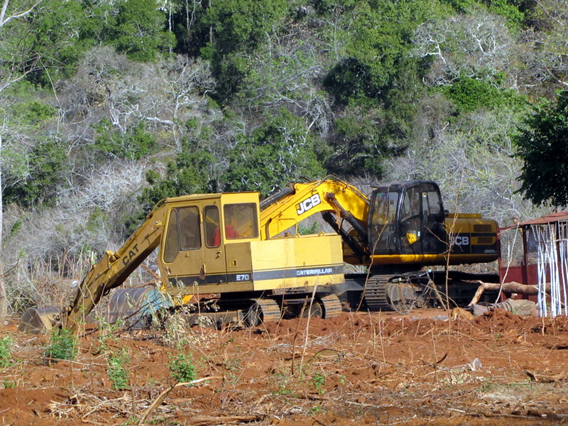 Clearing of elephant habitat at the edge of Yala National Park in Sri Lanka. Photo courtesy of the Environmental Foundation Limited (EFL). A biofuel plantation near Yala National Park has landed Lanka Orex Leasing Company PLC (LOLC) in Sri Lanka’s highest court. Environmentalists say the company is illegally bulldozing Asian elephant habitat, including scrubland and […]
Clearing of elephant habitat at the edge of Yala National Park in Sri Lanka. Photo courtesy of the Environmental Foundation Limited (EFL). A biofuel plantation near Yala National Park has landed Lanka Orex Leasing Company PLC (LOLC) in Sri Lanka’s highest court. Environmentalists say the company is illegally bulldozing Asian elephant habitat, including scrubland and […]
Biofuel boom could lead to life-threatening ozone pollution
 Not long ago biofuels were seen as one of the major tools to combat climate change, but a large number of studies in recent years have shown that many first generation biofuels may have little climate benefit—and some are actually harmful—and are also linked to rising food prices. Now, a new study in Nature Climate […]
Not long ago biofuels were seen as one of the major tools to combat climate change, but a large number of studies in recent years have shown that many first generation biofuels may have little climate benefit—and some are actually harmful—and are also linked to rising food prices. Now, a new study in Nature Climate […]
E.U. OKs biofuels produced from certified palm oil
 Palm fruit. Photo by Rhett Butler. The European Commission has approved palm oil-based biodiesel for the renewable fuels standard provided it is certified under the Roundtable for Sustainable Palm Oil (RSPO), a body that sets social and environmental criteria for palm oil production. The move, which could dramatically boost sales of palm oil in Europe, […]
Palm fruit. Photo by Rhett Butler. The European Commission has approved palm oil-based biodiesel for the renewable fuels standard provided it is certified under the Roundtable for Sustainable Palm Oil (RSPO), a body that sets social and environmental criteria for palm oil production. The move, which could dramatically boost sales of palm oil in Europe, […]
One in eight people suffer from malnutrition worldwide
 Girl in village in Madagascar. One of the world’s poorest countries, it has been estimated that about 70 percent of Malagasy people suffer from malnutrition. Photo by: Rhett A. Butler. In a world where technology has advanced to a point where I can instantly have a face-to-face conversation via online video with a friend in […]
Girl in village in Madagascar. One of the world’s poorest countries, it has been estimated that about 70 percent of Malagasy people suffer from malnutrition. Photo by: Rhett A. Butler. In a world where technology has advanced to a point where I can instantly have a face-to-face conversation via online video with a friend in […]
E.U. may eliminate subsidies for crop-based biofuels
 The palm oil industry has been lobbying Europe to allow palm oil-based biofuels to qualify as a low carbon fuel. But environmentalists say substantial amounts of palm oil production occurs at the expense of tropical forests. Here rainforest in Borneo is being cleared and burned for an oil palm plantation. Photo taken in May 2012 […]
The palm oil industry has been lobbying Europe to allow palm oil-based biofuels to qualify as a low carbon fuel. But environmentalists say substantial amounts of palm oil production occurs at the expense of tropical forests. Here rainforest in Borneo is being cleared and burned for an oil palm plantation. Photo taken in May 2012 […]
Palm oil industry hires lobbying powerhouse to overturn EPA ruling on biofuels
 Palm oil facility in Sumatra, Indonesia. The palm oil industry has hired lobbying powerhouse Holland & Knight to help overturn the Environmental Protection Agency’s finding that palm oil-based biodiesel fails to meet greenhouse gas emissions targets under the country’s Renewable Fuels Standard, reports The Hill. “Lobbying disclosure records show that the Malaysian Palm Oil Council, […]
Palm oil facility in Sumatra, Indonesia. The palm oil industry has hired lobbying powerhouse Holland & Knight to help overturn the Environmental Protection Agency’s finding that palm oil-based biodiesel fails to meet greenhouse gas emissions targets under the country’s Renewable Fuels Standard, reports The Hill. “Lobbying disclosure records show that the Malaysian Palm Oil Council, […]
Emissions from deforestation depend on fate of cleared trees
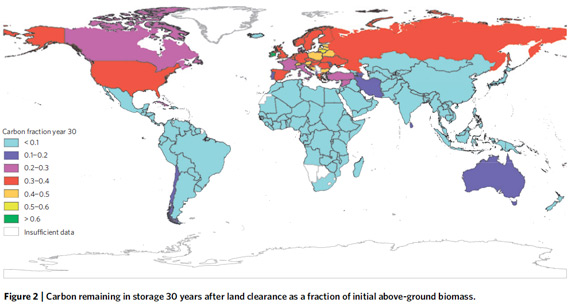 Carbon remaining in storage 30 years after land clearance as a fraction of initial above-ground biomass. Courtesy of Earles et al 2012. Click image to enlarge. Carbon emissions from deforestation vary greatly depending on whether timber stocks are turned into finished wood products, converted into bioenergy feedstocks, or burned outright, reports a new study published […]
Carbon remaining in storage 30 years after land clearance as a fraction of initial above-ground biomass. Courtesy of Earles et al 2012. Click image to enlarge. Carbon emissions from deforestation vary greatly depending on whether timber stocks are turned into finished wood products, converted into bioenergy feedstocks, or burned outright, reports a new study published […]
Palm oil industry lobbies EPA to reverse palm oil biofuel findings
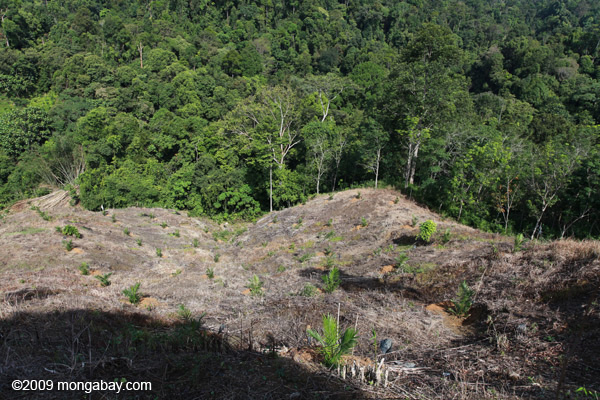 Deforestation for oil palm, which is used to produce palm oil, in Sumatra. PHoto by Rhett A. Butler Wilmar International, the world’s largest palm oil processor and trader, has hired a major lobbying firm to overturn the Environmental Protection Agency’s ruling that palm oil-based biodiesel will not meet greenhouse gas emissions standards under America’s Renewable […]
Deforestation for oil palm, which is used to produce palm oil, in Sumatra. PHoto by Rhett A. Butler Wilmar International, the world’s largest palm oil processor and trader, has hired a major lobbying firm to overturn the Environmental Protection Agency’s ruling that palm oil-based biodiesel will not meet greenhouse gas emissions standards under America’s Renewable […]
Surging demand for vegetable oil drives rainforest destruction
 Clearing for soy in the Brazilian Amazon Surging demand for vegetable oil has emerged as an important driver of tropical deforestation over the past two decades and is threatening biodiversity, carbon stocks, and other ecosystem functions in some of the world’s most critical forest areas, warns a report published last week by the Union of […]
Clearing for soy in the Brazilian Amazon Surging demand for vegetable oil has emerged as an important driver of tropical deforestation over the past two decades and is threatening biodiversity, carbon stocks, and other ecosystem functions in some of the world’s most critical forest areas, warns a report published last week by the Union of […]
International Bird Area in Kenya saved from conversion into biofuel crop
 View Larger Map A campaign by NGO Nature Kenya has saved the Dakatcha Woodland Important Bird Area (IBA) from destruction for planting biofuel crops, reports BirdLife International. Located near Kenya’s eastern coastline, the forest is home to two IUCN Red List Endangered species, Clarke’s weaver (Ploceus golandi) and sokoke pipit (Anthus sokokensis), both of which […]
View Larger Map A campaign by NGO Nature Kenya has saved the Dakatcha Woodland Important Bird Area (IBA) from destruction for planting biofuel crops, reports BirdLife International. Located near Kenya’s eastern coastline, the forest is home to two IUCN Red List Endangered species, Clarke’s weaver (Ploceus golandi) and sokoke pipit (Anthus sokokensis), both of which […]
Big oil makes $137 billion, gives 28 percent back to themselves
The world’s top five oil companies—BP, Chevron, Conoco Phillips, Exxon Mobil, and Royal Dutch Shell—made a record $137 billion in 2011 beating out the previous record in 2008, reports Climate Progress. Still even as the companies made record profits they produced 4 percent less oil than the prior year. Four of the five companies spent […]
Emissions from palm oil biodiesel highest of major biofuels, says EU
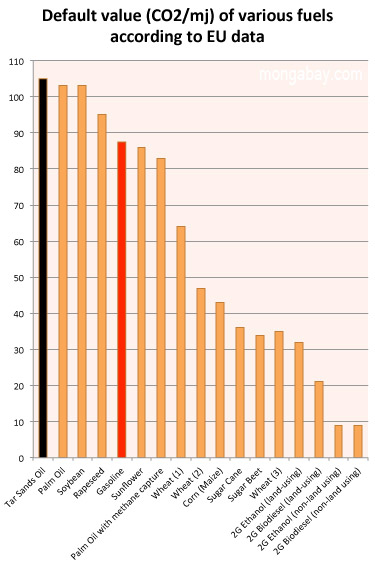 Greenhouse gas emissions from palm oil-based biodiesel are the highest among major biofuels when the effects of deforestation and peatlands degradation are considered, according to calculations by the European Commission. The emissions estimates, which haven’t been officially released, have important implications for the biofuels industry in Europe. As reported by EurActiv, the data from the […]
Greenhouse gas emissions from palm oil-based biodiesel are the highest among major biofuels when the effects of deforestation and peatlands degradation are considered, according to calculations by the European Commission. The emissions estimates, which haven’t been officially released, have important implications for the biofuels industry in Europe. As reported by EurActiv, the data from the […]
Palm oil does not meet U.S. renewable fuels standard, rules EPA
 Oil palm plantations and rainforest in Malaysia The U.S. Environmental Protection Agency (EPA) ruled on Friday that palm oil-based biofuels will not meet the renewable fuels standard due to carbon emissions associated with deforestation, reports The Hill. According to a notice published Friday in the Federal Register, palm oil-based biodiesel fails to meet a requirement […]
Oil palm plantations and rainforest in Malaysia The U.S. Environmental Protection Agency (EPA) ruled on Friday that palm oil-based biofuels will not meet the renewable fuels standard due to carbon emissions associated with deforestation, reports The Hill. According to a notice published Friday in the Federal Register, palm oil-based biodiesel fails to meet a requirement […]
Biofuel breakthrough: kelp could power cars
 Scientists have devised a new way to produce ethanol directly from seaweed, offering the potential to generate biofuels that don’t compete with terrestrial food production and won’t suck up scarce freshwater, reports a study published today in Science. Researchers from the Bio Architecture Lab in Berkeley, California engineered E. coli bacterium to digest brown seaweed […]
Scientists have devised a new way to produce ethanol directly from seaweed, offering the potential to generate biofuels that don’t compete with terrestrial food production and won’t suck up scarce freshwater, reports a study published today in Science. Researchers from the Bio Architecture Lab in Berkeley, California engineered E. coli bacterium to digest brown seaweed […]
Industrial palm oil production expands at expense of rainforests in Peru
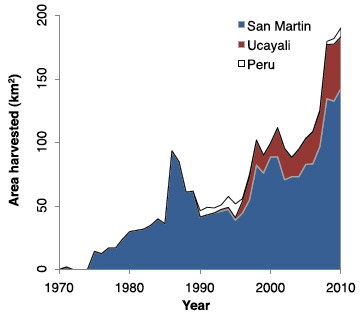 Intensive palm oil production is expanding at the expense of biolologically-rich lowland rainforests in the Peruvian Amazon, reports a study published in Environmental Research Letters. The research indicates that enthusiasm for oil palm — one of the world’s most lucrative crops — is taking a toll on forests outside of Southeast Asia, where the vast […]
Intensive palm oil production is expanding at the expense of biolologically-rich lowland rainforests in the Peruvian Amazon, reports a study published in Environmental Research Letters. The research indicates that enthusiasm for oil palm — one of the world’s most lucrative crops — is taking a toll on forests outside of Southeast Asia, where the vast […]
Biofuel aspirations spur ‘land grabs’ that hurt the poor, says report
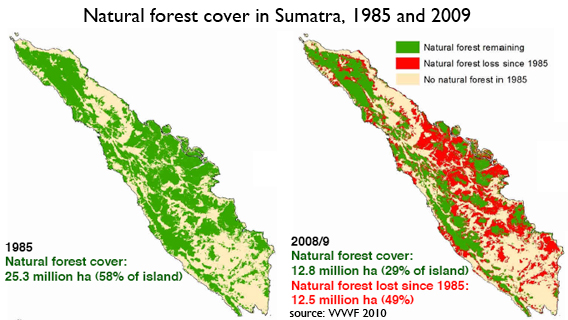 More than 40 million hectares of land has been acquired in developing countries for biofuel production in the past decade, reports a new study published by the International Land Coalition. The research looked exclusively at large land acquisitions between 2000 and 2010. These amounted to 200 million hectares of land, of which the authors were […]
More than 40 million hectares of land has been acquired in developing countries for biofuel production in the past decade, reports a new study published by the International Land Coalition. The research looked exclusively at large land acquisitions between 2000 and 2010. These amounted to 200 million hectares of land, of which the authors were […]
Carbon debt for some biofuels lasts centuries
 Draining peatland in Indonesian Borneo. Photo by: Rhett A. Butler. It has long been known that biofuels release greenhouse gas emissions through land conversion like deforestation. But an innovative new study by the Center for International Forestry Research (CIFOR) published in Ecology and Society has computed how long it would take popular biofuel crops to […]
Draining peatland in Indonesian Borneo. Photo by: Rhett A. Butler. It has long been known that biofuels release greenhouse gas emissions through land conversion like deforestation. But an innovative new study by the Center for International Forestry Research (CIFOR) published in Ecology and Society has computed how long it would take popular biofuel crops to […]
Palm oil biofuel from peatlands has big climate impact, finds study
 Biofuels produced from oil palm plantations established on tropical peatlands are a substantial source of greenhouse gas emissions, reports a comprehensive new assessment conducted for the International Council on Clean Transportation (ICCT). The research, based on a literature review and analysis of scientific methods used to derive emissions estimates, concludes that palm oil produced in […]
Biofuels produced from oil palm plantations established on tropical peatlands are a substantial source of greenhouse gas emissions, reports a comprehensive new assessment conducted for the International Council on Clean Transportation (ICCT). The research, based on a literature review and analysis of scientific methods used to derive emissions estimates, concludes that palm oil produced in […]
Five ways to feed billions without trashing the planet
 Soy fields meet Amazon rainforest in Brazil. A new study argues that the destruction of rainforests for agriculture must stop. Photo by Rhett A. Butler. At the end of this month the UN predicts global population will hit 7 billion people, having doubled from 3.5 billion in less than 50 years. Yet even as the […]
Soy fields meet Amazon rainforest in Brazil. A new study argues that the destruction of rainforests for agriculture must stop. Photo by Rhett A. Butler. At the end of this month the UN predicts global population will hit 7 billion people, having doubled from 3.5 billion in less than 50 years. Yet even as the […]
EU’s biofuel push based on ‘flawed’ science
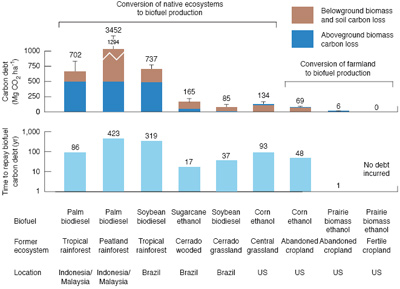 Europe’s biofuel push could exacerbate climate change unless policies are in place to accounts for emissions from indirect land use change, warns a letter signed by more than 100 scientists and economists. The letter, addressed to the European Commission, says the E.U. is deceiving itself and the public by asserting that biofuels are carbon neutral. […]
Europe’s biofuel push could exacerbate climate change unless policies are in place to accounts for emissions from indirect land use change, warns a letter signed by more than 100 scientists and economists. The letter, addressed to the European Commission, says the E.U. is deceiving itself and the public by asserting that biofuels are carbon neutral. […]
Europe should lift duty on RSPO-certified palm oil to encourage use, says Dutch group
 To encourage uptake of palm oil that is less damaging to the environment, the European Union (EU) should lift the import duty on palm oil certified under Roundtable on Sustainable Palm Oil (RSPO), said a Dutch industry group. The Dutch Product Board for Margarine, Fats and Oils (MVO), a group that has already committed to […]
To encourage uptake of palm oil that is less damaging to the environment, the European Union (EU) should lift the import duty on palm oil certified under Roundtable on Sustainable Palm Oil (RSPO), said a Dutch industry group. The Dutch Product Board for Margarine, Fats and Oils (MVO), a group that has already committed to […]
Palm oil, poverty, and conservation collide in Cameroon
- Industrial palm oil production is coming to Africa, its ancestral home. And like other places where expansion has occurred rapidly, the crop is spurring hope for economic development while generating controversy over its potential impacts.
- The world’s most productive oil seed has been a boon to southeast Asian economies, but the looming arrival of industrial plantations in Africa is raising fears that some of the same detriments that have plagued leading producers Malaysia and Indonesia—deforestation, greenhouse gas emissions, biodiversity loss, conflicts with local people, social displacement, and poor working conditions—could befall one of the world’s most destitute regions.
- While there is no question that oil palm is a highly lucrative crop that can contribute to economic development, there is also little doubt that conversion of native forests for plantations exacts a heavy toll on the environment.
Could palm oil help save the Amazon? (2011)
 This article is a longer version of story that appeared at Yale e360: In Brazil, Palm Oil Plantations Could Help Preserve Amazon. For years now, environmentalists have become accustomed to associating palm oil with large-scale destruction of rainforests across Malaysia and Indonesia. Campaigners have linked palm oil-containing products like Girl Scout cookies and soap products […]
This article is a longer version of story that appeared at Yale e360: In Brazil, Palm Oil Plantations Could Help Preserve Amazon. For years now, environmentalists have become accustomed to associating palm oil with large-scale destruction of rainforests across Malaysia and Indonesia. Campaigners have linked palm oil-containing products like Girl Scout cookies and soap products […]
Could palm oil help save the Amazon?
- For years now, environmentalists have become accustomed to associating palm oil with large-scale destruction of rainforests across Malaysia and Indonesia.
- Campaigners have linked palm oil-containing products like Girl Scout cookies and soap products to smoldering peatlands and dead orangutans.
- Now with Brazil announcing plans to dramatically scale-up palm oil production in the Amazon, could the same fate befall Earth’s largest rainforest? With this potential there is a frenzy of activity in the Brazilian palm oil sector.
- Yet there is a conspicuous lack of hand wringing by environmentalists in the Amazon. The reason: done right, oil palm could emerge as a key component in the effort to save the Amazon rainforest. Responsible production there could even force changes in other parts of the world.
A new front in the war over palm oil?
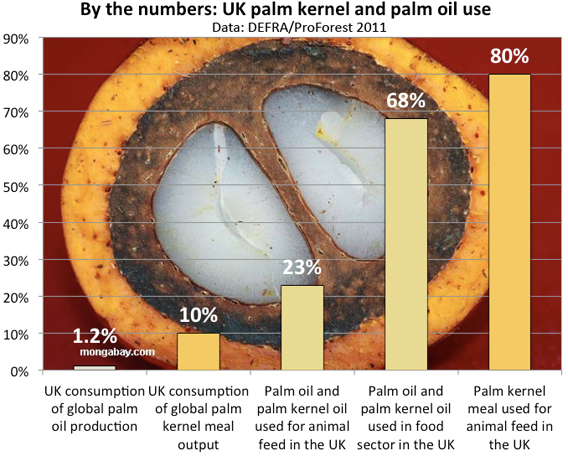 By the numbers: UK palm kernel and palm oil use A new study for the U.K. government found that in 2009 Britain imported at least 1.65 million metric tons of palm oil-related products for production of food, fuel, and cosmetics. Notably, the study, which was conducted by Proforest for the Department for Environment, Food and […]
By the numbers: UK palm kernel and palm oil use A new study for the U.K. government found that in 2009 Britain imported at least 1.65 million metric tons of palm oil-related products for production of food, fuel, and cosmetics. Notably, the study, which was conducted by Proforest for the Department for Environment, Food and […]
Sugar cane cools climate when it replaces cattle pasture
Converting cattle pasture and cropland in Brazil to sugar cane helps cool local climate reports research published in Nature Climate Change. Scientists with the Carnegie Institutions’s Department of Global Ecology at Stanford University and the University of Montana analyzed temperature, reflectivity, and evapotranspiration from satellite data across 733,000 square miles—an area larger than the state […]
Clean energy investments rise 630% in 7 years
According to a report by the US Pew Environment Group global clean energy investments, which do not include nuclear power, jumped 630% since 2004. The report detailing 2010 clean energy investments found that China remains the global leader in clean energy, while the US fell from 2nd to 3rd. This is the second year in […]
New organization seeks to make biofuels sustainable, but is it possible?
Not too long ago policy-makers, scientists, and environmentalists saw biofuels as a significant tool to provide sustainable energy to the world. However, as it became clear that biofuels were not only connected to deforestation, pollution, and greenhouse gas emissions (sometimes exceeding fossil fuels), but also competed with the global food supply and water sources, biofuels […]
Slow but steady progress on recognizing indigenous land rights is interrupted by commodity boom
 Progress over the past 25 years in recognizing indigenous peoples’ rights to land and resources has been interrupted by a worldwide commodity boom, argues a new report published by the Rights and Resources Initiative (RRI). The report, “Pushback: Local Power, Global Realignment,” says that surging food and energy prices—and associated appreciation of land values—have led […]
Progress over the past 25 years in recognizing indigenous peoples’ rights to land and resources has been interrupted by a worldwide commodity boom, argues a new report published by the Rights and Resources Initiative (RRI). The report, “Pushback: Local Power, Global Realignment,” says that surging food and energy prices—and associated appreciation of land values—have led […]
Brazilian mining giant buys Amazon palm oil company
 Vale, a Brazilian mining giant, will buy palm oil producer Biopalma da Amazonia SA Reflorestamento Industria & Comercio, reports Bloomberg. The deal, valued at $173.5 million, will enable the mining company to run more of its operations on palm oil biodiesel. Vale began its palm oil push in 2009 when it formed a partnership with […]
Vale, a Brazilian mining giant, will buy palm oil producer Biopalma da Amazonia SA Reflorestamento Industria & Comercio, reports Bloomberg. The deal, valued at $173.5 million, will enable the mining company to run more of its operations on palm oil biodiesel. Vale began its palm oil push in 2009 when it formed a partnership with […]
Greening the world with palm oil?
 This article—written in April 2010, updated in August 2010, and posted for the first time today—is part of larger “Fate of Forests” series. The commercial shows a typical office setting. A worker sits drearily at a desk, shredding papers and watching minutes tick by on the clock. When his break comes, he takes out a […]
This article—written in April 2010, updated in August 2010, and posted for the first time today—is part of larger “Fate of Forests” series. The commercial shows a typical office setting. A worker sits drearily at a desk, shredding papers and watching minutes tick by on the clock. When his break comes, he takes out a […]
Prairie grass-based biofuels could meet half current fuel demand without affecting forests, food
Biofuels could meet up to half the world’s current fuel consumption without affecting food production or forests, argues a study published last month in the journal Environmental Science and Technology. Analyzing the extent of marginal grasslands, including abandoned and degraded grassland, using data on soil, topography, climate and current land use, Ximing Cai of the […]
Dapatkah Pembayaran Konservasi Hutan Hancurkan Pertanian Organik?
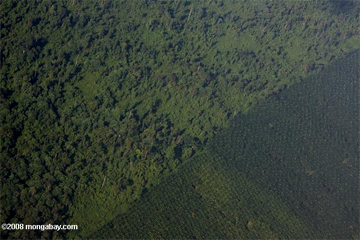 Program pembayaran karbon hutan seperti mekanisme pengurangan emisi dari penggundulan hutan dan degradasi (REDD) yang diajukan dapat memberikan tekanan pada teknik pertanian “ramah-alam liar” dengan meningkatkan kebutuhan untuk mengintensifkan produksi pertanian, sebuah makalah yang diterbitkan bulan Juni dalam Conservation Biology memperingatkan. Makalah tersebut, ditulis oleh Jaboury Ghazoul dan Lian Pin Koh of ETH Zurich dan […]
Program pembayaran karbon hutan seperti mekanisme pengurangan emisi dari penggundulan hutan dan degradasi (REDD) yang diajukan dapat memberikan tekanan pada teknik pertanian “ramah-alam liar” dengan meningkatkan kebutuhan untuk mengintensifkan produksi pertanian, sebuah makalah yang diterbitkan bulan Juni dalam Conservation Biology memperingatkan. Makalah tersebut, ditulis oleh Jaboury Ghazoul dan Lian Pin Koh of ETH Zurich dan […]
Could forest conservation payments undermine organic agriculture?
 Forest carbon payment programs like the proposed reducing emissions from deforestation and degradation (REDD) mechanism could put pressure on “wildlife-friendly” farming techniques by increasing the need to intensify agricultural production, warns a paper published this June in Conservation Biology. The paper, written by Jaboury Ghazoul and Lian Pin Koh of ETH Zurich and myself in […]
Forest carbon payment programs like the proposed reducing emissions from deforestation and degradation (REDD) mechanism could put pressure on “wildlife-friendly” farming techniques by increasing the need to intensify agricultural production, warns a paper published this June in Conservation Biology. The paper, written by Jaboury Ghazoul and Lian Pin Koh of ETH Zurich and myself in […]
EU’s biofuels target driving land grabs in Africa, says group
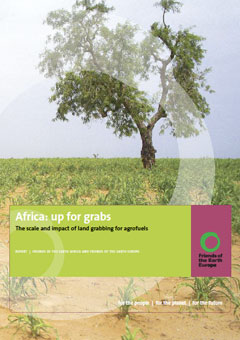 The European Union’s renewable fuels target is driving land grabs in Africa that threaten the environment and local communities, claims a new report from Friends of the Earth (FOE). Africa: up for grabs – The scale and impact of land grabbing for agrofuels [PDF] reviews a series of land deals signed across more than a […]
The European Union’s renewable fuels target is driving land grabs in Africa that threaten the environment and local communities, claims a new report from Friends of the Earth (FOE). Africa: up for grabs – The scale and impact of land grabbing for agrofuels [PDF] reviews a series of land deals signed across more than a […]
Minyak Kelapa Ramah Lingkungan Tiba di Amerika Serikat
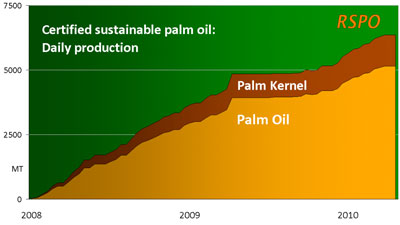 Pengiriman pertama minyak kelapa yang tersertifikasi di bawah kriteria kebersinambungan telah tiba di Amerika Serikat, menurut Roundtable on Sustainable Palm Oil (RSPO). AAK, pabrik minyak dan lemak sayur berbasis di Malmo, Swedia, mengumumkan tibanya pengiriman pertama dari minyak kelapa tersertifikasi RSPO yang terpisah di tempat pengilangannya di Port Newark, New Jersey. Minyak kelapa tersertifikasi RSPO […]
Pengiriman pertama minyak kelapa yang tersertifikasi di bawah kriteria kebersinambungan telah tiba di Amerika Serikat, menurut Roundtable on Sustainable Palm Oil (RSPO). AAK, pabrik minyak dan lemak sayur berbasis di Malmo, Swedia, mengumumkan tibanya pengiriman pertama dari minyak kelapa tersertifikasi RSPO yang terpisah di tempat pengilangannya di Port Newark, New Jersey. Minyak kelapa tersertifikasi RSPO […]
Greener palm oil arrives in the United States
 The first shipment of palm oil certified under sustainability criteria have arrived in the United States, according to the Roundtable on Sustainable Palm Oil (RSPO). AAK, a vegetable oils and fats manufacturer based in Malmo, Sweden, announced the arrival of the first shipment of segregated RSPO-certified palm oil to its refinery in Port Newark, New […]
The first shipment of palm oil certified under sustainability criteria have arrived in the United States, according to the Roundtable on Sustainable Palm Oil (RSPO). AAK, a vegetable oils and fats manufacturer based in Malmo, Sweden, announced the arrival of the first shipment of segregated RSPO-certified palm oil to its refinery in Port Newark, New […]
U.S. farms and forests report draws ire in Brazil; cutting down the Amazon does not mean lower food prices
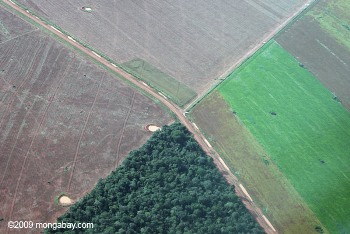 Not surprisingly, a US report released last week which argued that saving forests abroad will help US agricultural producers by reducing international competition has raised hackles in tropical forest counties. The report, commissioned by Avoided Deforestation Partners, a US group pushing for including tropical forest conservation in US climate policy, and the National Farmers Union, […]
Not surprisingly, a US report released last week which argued that saving forests abroad will help US agricultural producers by reducing international competition has raised hackles in tropical forest counties. The report, commissioned by Avoided Deforestation Partners, a US group pushing for including tropical forest conservation in US climate policy, and the National Farmers Union, […]
Saving tropical forests helps protects U.S. agriculture, argues campaign
- Reducing deforestation abroad helps protect the U.S. agricultural sector by ensuring higher prices for commodities and reducing the cost of compliance with expected climate regulations, argues a new report issued by Avoided Deforestation Partners and the National Farmers Union, a farming lobby group.
UE amanatkan standar lingkungan biofuel untuk lindungi hutan dan lahan basah
 UE kini bergerak untuk membuat standar lingkungan untuk biofuel yang digunakan di Eropa, mensyaratkan biofuel untuk memberikan “pengurangan substansial” pada emisi gas rumah kaca dan tidak menghasilkan perubahan fungsi hutan atau lahan basah, menurut pernyataan dari Komisi Eropa. Rencana ini meminta industri, pemerintah, dan LSM untuk menyiapkan “skema sukarela” yang memberikan sertifikasi bahwa biofuel yang […]
UE kini bergerak untuk membuat standar lingkungan untuk biofuel yang digunakan di Eropa, mensyaratkan biofuel untuk memberikan “pengurangan substansial” pada emisi gas rumah kaca dan tidak menghasilkan perubahan fungsi hutan atau lahan basah, menurut pernyataan dari Komisi Eropa. Rencana ini meminta industri, pemerintah, dan LSM untuk menyiapkan “skema sukarela” yang memberikan sertifikasi bahwa biofuel yang […]
Foto-foto tunjukkan daerah mirip-surga untuk lokasi pembangkit listrik batu bara di Borneo
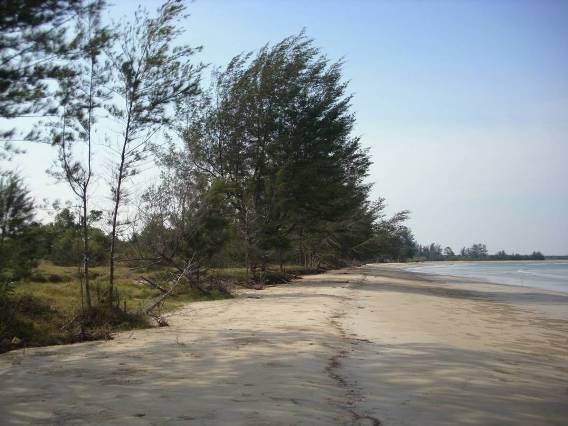 Dengan seluruh perhatian dunia sedang mengarah pada bencana lingkungan di Teluk Meksiko, banyak yang mulai merenungkan kebenaran dari tidak hanya Amerika, tapi ketergantungan dunia akan bahan bakar fossil. Meski begitu proyek-proyek pengadaan energi berbahan bakar fosil skala besar terus berjalan maju, termasuk di kota Sabah, Malaysia di Borneo yang akan membangun 300 MW pembangkit listrik […]
Dengan seluruh perhatian dunia sedang mengarah pada bencana lingkungan di Teluk Meksiko, banyak yang mulai merenungkan kebenaran dari tidak hanya Amerika, tapi ketergantungan dunia akan bahan bakar fossil. Meski begitu proyek-proyek pengadaan energi berbahan bakar fosil skala besar terus berjalan maju, termasuk di kota Sabah, Malaysia di Borneo yang akan membangun 300 MW pembangkit listrik […]
EU mandates biofuel environmental standards to protect forests, wetlands
 The E.U. today moved to establish environmental standards for biofuels used in Europe, requiring biofuels to deliver “substantial reductions” in greenhouse gas emissions and not result in conversion of forests or wetlands, according to a statement from the European Commission. The plan calls for industry, governments and NGOs to set up “voluntary schemes” which certify […]
The E.U. today moved to establish environmental standards for biofuels used in Europe, requiring biofuels to deliver “substantial reductions” in greenhouse gas emissions and not result in conversion of forests or wetlands, according to a statement from the European Commission. The plan calls for industry, governments and NGOs to set up “voluntary schemes” which certify […]
Brazil luncurkan dorongan besar untuk minyak kelapa berkelanjutan di Amazon
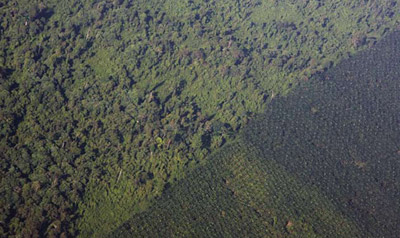 Usaha minyak kelapa “yang berkesinambungan” dapat menekan Malaysia dan Indonesia dalam prestasi di area lingkungan hidup dari minyak sayur yang banyak digunakan. Presiden Brazil Lula da Silva, hari Kamis menjelaskan rencana untuk memperluas produksi minyak kelapa di Amazon sambil meminimalkan resiko di hutan hutan terbesar di dunia, lapor Globo dan Terra Brasil. Rencana ini, disebut […]
Usaha minyak kelapa “yang berkesinambungan” dapat menekan Malaysia dan Indonesia dalam prestasi di area lingkungan hidup dari minyak sayur yang banyak digunakan. Presiden Brazil Lula da Silva, hari Kamis menjelaskan rencana untuk memperluas produksi minyak kelapa di Amazon sambil meminimalkan resiko di hutan hutan terbesar di dunia, lapor Globo dan Terra Brasil. Rencana ini, disebut […]
India menjadi pembeli minyak kelapa terbesar
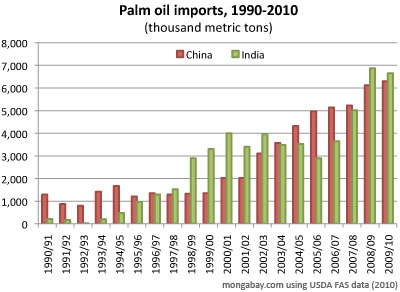 India mengalahkan Cina sebagai pembeli minyak kelapa terbesar di dunia pada tahun 2009, tulis Bloomberg. Berdasarkan angka-angka dari Solvent Extractors’ Association di India, kelompok prosesor berbasis di Mumbai, India mengimpor 7 juta metrik ton minyak kelapa pada tahun 2009. Cina mengimpor 6,4 juta ton tahun lalu. B.V Mehta, direktur eksekutif dari asosiasi, mengatakan bahwa kenaikan […]
India mengalahkan Cina sebagai pembeli minyak kelapa terbesar di dunia pada tahun 2009, tulis Bloomberg. Berdasarkan angka-angka dari Solvent Extractors’ Association di India, kelompok prosesor berbasis di Mumbai, India mengimpor 7 juta metrik ton minyak kelapa pada tahun 2009. Cina mengimpor 6,4 juta ton tahun lalu. B.V Mehta, direktur eksekutif dari asosiasi, mengatakan bahwa kenaikan […]
Photos reveal paradise-like site for coal plant in Borneo
 With the world’s eyes on the environmental catastrophe in the Gulf of Mexico, many are beginning to ponder the rightness of not just America’s, but the world’s dependence on fossil fuels. Yet large-scale fossil-fuel energy projects continue to march ahead, including one in the Malaysian state of Sabah on Borneo to build a 300 MW […]
With the world’s eyes on the environmental catastrophe in the Gulf of Mexico, many are beginning to ponder the rightness of not just America’s, but the world’s dependence on fossil fuels. Yet large-scale fossil-fuel energy projects continue to march ahead, including one in the Malaysian state of Sabah on Borneo to build a 300 MW […]
Brazil launches major push for sustainable palm oil in the Amazon
 “Sustainable” palm oil effort may pressure Malaysia and Indonesia on environmental performance of widely used vegetable oil. Brazilian President Lula da Silva on Thursday laid out plans to expand palm oil production in the Amazon while minimizing risk to Earth’s largest rainforest, reports Globo and Terra Brasil. The plan, called the Program for Sustainable Production […]
“Sustainable” palm oil effort may pressure Malaysia and Indonesia on environmental performance of widely used vegetable oil. Brazilian President Lula da Silva on Thursday laid out plans to expand palm oil production in the Amazon while minimizing risk to Earth’s largest rainforest, reports Globo and Terra Brasil. The plan, called the Program for Sustainable Production […]
Nestle’s palm oil debacle highlights current limitations of certification scheme
 Last week Nestle, the world’s largest food processor, was caught in a firestorm when it attempted to censor a Greenpeace campaign that targeted its use of palm oil sourced from a supplier accused of environmentally-damaging practices. The incident brought the increasingly raucous debate over palm oil into the spotlight and renewed questions over an industry-backed […]
Last week Nestle, the world’s largest food processor, was caught in a firestorm when it attempted to censor a Greenpeace campaign that targeted its use of palm oil sourced from a supplier accused of environmentally-damaging practices. The incident brought the increasingly raucous debate over palm oil into the spotlight and renewed questions over an industry-backed […]
Pengembang Minyak Kelapa Merengsek Hingga Perbatasan Terakhir Indonesia: Papua
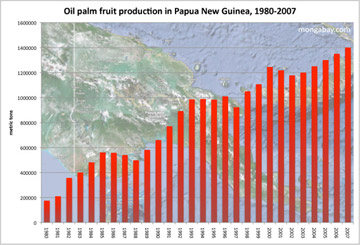 Pengembang minyak kelapa di bagian Indonesia dari Papua Nugini menandatangani perjanjian yang meragukan yang mengeksploitasi masyarakat lokal dan menempatkan ekosistem hutan yang cukup penting beresiko, menurut sebuah laporan baru dari Environmental Investigation Agency (EIA) dan Telapak. Laporan tersebut, “Up for Grabs”, memperingatkan bahwa lima juta hektar dari lahan Papua dan Papua Barat sedang menjadi target […]
Pengembang minyak kelapa di bagian Indonesia dari Papua Nugini menandatangani perjanjian yang meragukan yang mengeksploitasi masyarakat lokal dan menempatkan ekosistem hutan yang cukup penting beresiko, menurut sebuah laporan baru dari Environmental Investigation Agency (EIA) dan Telapak. Laporan tersebut, “Up for Grabs”, memperingatkan bahwa lima juta hektar dari lahan Papua dan Papua Barat sedang menjadi target […]
Conflicting signals out of Indonesia on whether palm oil plantations will be classified as forests
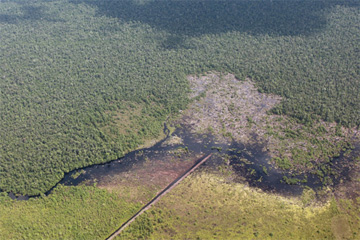 Indonesia will not allow the conversion of natural forest for oil palm plantations, claimed the country’s Forestry Minister Zulkifli Hasan in comments reported by the Jakarta Post. Speaking at a hearing on forestry and agriculture, Hasan said he has no plan to draft a decree to incorporate plantations in the forestry sector. “There won’t be […]
Indonesia will not allow the conversion of natural forest for oil palm plantations, claimed the country’s Forestry Minister Zulkifli Hasan in comments reported by the Jakarta Post. Speaking at a hearing on forestry and agriculture, Hasan said he has no plan to draft a decree to incorporate plantations in the forestry sector. “There won’t be […]
EU biofuels target will starve the poor, says anti-poverty group
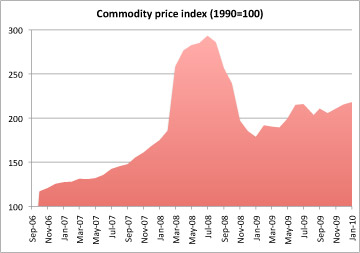 The European Union’s biofuel targets could starve up to 100 million people, warns a report from an anti-poverty charity. ActionAid estimates the E.U.’s plan to source 10 percent of transport fuels from biofuels would increase competition for agricultural lands, spurring a sharp rise in food prices. Dearer food would disproportionally affect the world’s poorest people. […]
The European Union’s biofuel targets could starve up to 100 million people, warns a report from an anti-poverty charity. ActionAid estimates the E.U.’s plan to source 10 percent of transport fuels from biofuels would increase competition for agricultural lands, spurring a sharp rise in food prices. Dearer food would disproportionally affect the world’s poorest people. […]
Amazon rainforest will bear cost of biofuel policies in Brazil
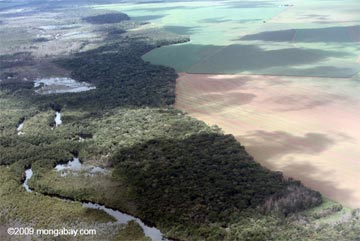 Business-as-usual agricultural expansion to meet biofuel production targets for 2020 will take a heavy toll on Brazil’s Amazon rainforest in coming years, undermining the potential emissions savings of transitioning from fossil fuels to biofuels, warns a new paper published in the Proceedings of the National Academy of Sciences (PNAS). The research suggests that intensification of […]
Business-as-usual agricultural expansion to meet biofuel production targets for 2020 will take a heavy toll on Brazil’s Amazon rainforest in coming years, undermining the potential emissions savings of transitioning from fossil fuels to biofuels, warns a new paper published in the Proceedings of the National Academy of Sciences (PNAS). The research suggests that intensification of […]
EU: rainforests can be converted to palm oil plantations for biofuel production
 The European Union may be planning to classify oil palm plantations as forests, raising fears among environmental groups of expanded conversion of tropical rainforests for biofuel production, reports the EUobserver, which cites a leaked document from the European Commission. The draft document [PDF] shows that policymakers are considering language that would specifically allow use of […]
The European Union may be planning to classify oil palm plantations as forests, raising fears among environmental groups of expanded conversion of tropical rainforests for biofuel production, reports the EUobserver, which cites a leaked document from the European Commission. The draft document [PDF] shows that policymakers are considering language that would specifically allow use of […]
UK failing to meet biofuel sustainability standard
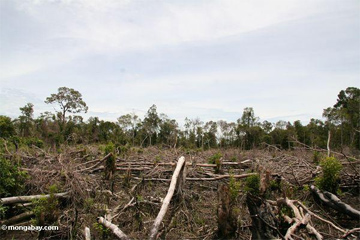 Only 4 percent of biofuel imported for use in the UK — and 20 percent of biofuel used overall — meets the environmental sustainability standard set by the Renewable Transport Fuel Obligation (RFTO), reports a new assessment from the Renewable Fuels Agency. The report found Britain exceeded its overall biofuel target of 2.5 percent of […]
Only 4 percent of biofuel imported for use in the UK — and 20 percent of biofuel used overall — meets the environmental sustainability standard set by the Renewable Transport Fuel Obligation (RFTO), reports a new assessment from the Renewable Fuels Agency. The report found Britain exceeded its overall biofuel target of 2.5 percent of […]
Company seeks to log forest reserve for palm oil in Uganda
 A company in Uganda is pressuring the environment ministry to allow it to log a protected forest reserve to establish a palm oil plantation, reports The New Vision. BIDCO, a Kenyan company, has been lobbying since 2006 to log the forest reserve on Bugala island in Lake Victoria, but has face stiff resistance due to […]
A company in Uganda is pressuring the environment ministry to allow it to log a protected forest reserve to establish a palm oil plantation, reports The New Vision. BIDCO, a Kenyan company, has been lobbying since 2006 to log the forest reserve on Bugala island in Lake Victoria, but has face stiff resistance due to […]
India becomes largest buyer of palm oil
 India surpassed China as the world’s largest buyer of palm oil in 2009, reports Bloomberg. According to figures from the Solvent Extractors’ Association of India, a processor group based in Mumbai, India imported 7 million metric tons of palm oil in 2009. China imported 6.4 million tons last year. B.V. Mehta, executive director of the […]
India surpassed China as the world’s largest buyer of palm oil in 2009, reports Bloomberg. According to figures from the Solvent Extractors’ Association of India, a processor group based in Mumbai, India imported 7 million metric tons of palm oil in 2009. China imported 6.4 million tons last year. B.V. Mehta, executive director of the […]
Consumers should help pay the bill for ‘greener’ palm oil
 A version of this article appeared today in the Jakarta Post Palm oil is one of the world’s most traded and versatile agricultural commodities. It can be used as edible vegetable oil, industrial lubricant, raw material in cosmetic and skincare products and feedstock for biofuel production. Growing global demand for palm oil and the ensuing […]
A version of this article appeared today in the Jakarta Post Palm oil is one of the world’s most traded and versatile agricultural commodities. It can be used as edible vegetable oil, industrial lubricant, raw material in cosmetic and skincare products and feedstock for biofuel production. Growing global demand for palm oil and the ensuing […]
Well-known climate change denialist labels activists in Copenhagen ‘Hitler Youth’
Prominent climate change denialist and past advisor to Margaret Thatcher, Viscount Christopher Monckton, has persisted in labeling protestors in Copenhagen ‘Hitler Youth’ despite little historical connection. The initial exchange between Monckton and climate change activists occurred when activists with the nonprofit group SustainUS and other organizations briefly gate-crashed a meeting of the global warming skeptical […]
Efforts to slow climate change may put indigenous people at risk
 Efforts to slow climate change are putting indigenous people at risk, warns a new report published by Survival International, an indigenous rights’ group. The report, ‘The most inconvenient truth of all: climate change and indigenous people,’ argues that lack of recognition of indigenous land use leaves them vulnerable to displacement and environmental harm by projects […]
Efforts to slow climate change are putting indigenous people at risk, warns a new report published by Survival International, an indigenous rights’ group. The report, ‘The most inconvenient truth of all: climate change and indigenous people,’ argues that lack of recognition of indigenous land use leaves them vulnerable to displacement and environmental harm by projects […]
Palm oil developers push into Indonesia’s last frontier: Papua
 Oil palm developers in the Indonesian half of New Guinea are signing questionable deals that exploit local communities and put important forest ecosystems at risk, alleges a new report from Environmental Investigation Agency (EIA) and Telapak. The report, “Up for Grabs”, warns that five million hectares of land in Papua and West Papua are being […]
Oil palm developers in the Indonesian half of New Guinea are signing questionable deals that exploit local communities and put important forest ecosystems at risk, alleges a new report from Environmental Investigation Agency (EIA) and Telapak. The report, “Up for Grabs”, warns that five million hectares of land in Papua and West Papua are being […]
European companies not supporting ‘greener’ palm oil
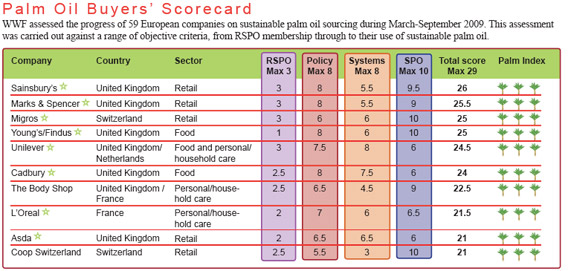 Most European consumers of palm oil are failing to buy eco-certified palm oil, undermining efforts to encourage producers to reduce their impact on the environment, reports WWF. Analyzing 59 major corporate users of palm oil in Europe, WWF found that only 10 companies are “showing real progress on their commitments to buy and use sustainable […]
Most European consumers of palm oil are failing to buy eco-certified palm oil, undermining efforts to encourage producers to reduce their impact on the environment, reports WWF. Analyzing 59 major corporate users of palm oil in Europe, WWF found that only 10 companies are “showing real progress on their commitments to buy and use sustainable […]
Carbon accounting must not neglect emissions from bioenergy production and use
 Carbon accounting used in the Kyoto Protocol and other climate legislation currently neglects CO2 emissions from the production of biofuels, a loophole that could drive large-scale destruction of tropical forests and exacerbate global warming, warned researchers writing last week in the journal Science. Jerry Melillo and a dozen co-authors noted that the Kyoto Protocol, the […]
Carbon accounting used in the Kyoto Protocol and other climate legislation currently neglects CO2 emissions from the production of biofuels, a loophole that could drive large-scale destruction of tropical forests and exacerbate global warming, warned researchers writing last week in the journal Science. Jerry Melillo and a dozen co-authors noted that the Kyoto Protocol, the […]
Palm oil both a leading threat to orangutans and a key source of jobs in Sumatra
 An interview about orangutan conservation and the complexities of palm oil with Panut Hadisiswoyo and David Dellatore of the Orangutan Information Center and Helen Buckland of the Sumatran Orangutan Society. Of the world’s two species of orangutan, a great ape that shares 96 percent of man’s genetic makeup, the Sumatran orangutan is considerably more endangered […]
An interview about orangutan conservation and the complexities of palm oil with Panut Hadisiswoyo and David Dellatore of the Orangutan Information Center and Helen Buckland of the Sumatran Orangutan Society. Of the world’s two species of orangutan, a great ape that shares 96 percent of man’s genetic makeup, the Sumatran orangutan is considerably more endangered […]
Working to save the ‘living dead’ in the Atlantic Forest, an interview with Antonio Rossano Mendes Pontes
 Fourth in a series of interviews with participants at the 2009 Association of Tropical Biology and Conservation (ATBC) conference. The Atlantic Forest may very well be the most imperiled tropical ecosystem in the world: it is estimated that seven percent (or less) of the original forest remains. Lining the coast of Brazil, what is left […]
Fourth in a series of interviews with participants at the 2009 Association of Tropical Biology and Conservation (ATBC) conference. The Atlantic Forest may very well be the most imperiled tropical ecosystem in the world: it is estimated that seven percent (or less) of the original forest remains. Lining the coast of Brazil, what is left […]
EU biofuels policy undermines governance in Indonesia, alleges report
 Indonesian authorities are failing to prevent illegal logging and conversion of protected areas for oil palm cultivation used to supply the European market with supposedly “green” biofuels, alleges a new report from Milieudefensie (Friends of the Earth Netherlands) and WALHI KalBar (Friends of the Earth Indonesia, West Kalimantan). The report, “Failing governance – Avoiding responsibilities” […]
Indonesian authorities are failing to prevent illegal logging and conversion of protected areas for oil palm cultivation used to supply the European market with supposedly “green” biofuels, alleges a new report from Milieudefensie (Friends of the Earth Netherlands) and WALHI KalBar (Friends of the Earth Indonesia, West Kalimantan). The report, “Failing governance – Avoiding responsibilities” […]
US subsidies of oil and coal more than double the subsidies of renewable energy
 During the fiscal years of 2002-2008 the United States handed out subsidies to fossil fuel industries to a tune of 72 billion dollars, while renewable energy subsidies, during the same period, reached 29 billion dollars. Conducted by the Environmental Law Institute (ELI) in partnership with the Woodrow Wilson International Center for Scholars, the research shows […]
During the fiscal years of 2002-2008 the United States handed out subsidies to fossil fuel industries to a tune of 72 billion dollars, while renewable energy subsidies, during the same period, reached 29 billion dollars. Conducted by the Environmental Law Institute (ELI) in partnership with the Woodrow Wilson International Center for Scholars, the research shows […]
Brazil may ban sugarcane plantations from the Amazon, Pantanal
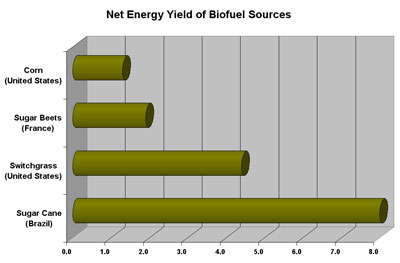 Brazil will restrict sugarcane plantations for ethanol production from the Amazon, the Pantanal, and other ecologically-sensitive areas under a plan announced Thursday by President Luiz Inacio Lula da Silva’s administration, reports the Associated Press. Environment Minister Carlos Minc said the proposal, which will be voted on by Congress next year, would limit sugar growing to […]
Brazil will restrict sugarcane plantations for ethanol production from the Amazon, the Pantanal, and other ecologically-sensitive areas under a plan announced Thursday by President Luiz Inacio Lula da Silva’s administration, reports the Associated Press. Environment Minister Carlos Minc said the proposal, which will be voted on by Congress next year, would limit sugar growing to […]
Britain bans palm oil ad campaign
 Britain’s Advertising Standards Authority (ASA), a group that regulates advertisements, has again banned a “misleading” ad by the palm oil industry, reports the Guardian. ASA ruled that a campaign run by the Malaysian Palm Oil Council (MPOC) makes dubious claims, including that palm oil is the “only product able to sustainably and efficiently meet a […]
Britain’s Advertising Standards Authority (ASA), a group that regulates advertisements, has again banned a “misleading” ad by the palm oil industry, reports the Guardian. ASA ruled that a campaign run by the Malaysian Palm Oil Council (MPOC) makes dubious claims, including that palm oil is the “only product able to sustainably and efficiently meet a […]
Concerns over deforestation may drive new approach to cattle ranching in the Amazon
 As the world’s biggest cattle producer, Brazil braces for change While you’re browsing the mall for running shoes, the Amazon rainforest is probably the farthest thing from your mind. Perhaps it shouldn’t be. The globalization of commodity supply chains has created links between consumer products and distant ecosystems like the Amazon. Shoes sold in downtown […]
As the world’s biggest cattle producer, Brazil braces for change While you’re browsing the mall for running shoes, the Amazon rainforest is probably the farthest thing from your mind. Perhaps it shouldn’t be. The globalization of commodity supply chains has created links between consumer products and distant ecosystems like the Amazon. Shoes sold in downtown […]
Start your engines with watermelon juice
Environmental disappointments under Obama

Biofuel company eyes dead zone in the Gulf of Mexico for creating fish-powered fuel
‘Dead zones’ in the ocean are called such for a reason. Every year agricultural run-off, especially fertilizer, floods the oceans with an abundance of nutrients leading to algae blooms, i.e. massive explosions of phytoplankton. The demise of these blooms, and the rise of bacteria feeding on them, eventually starves the entire area of oxygen creating […]
Oil companies in the UK are big users of palm oil biodiesel
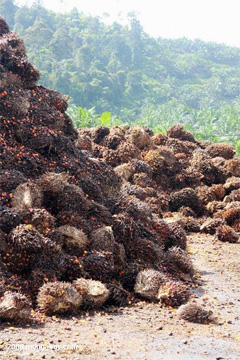 British motorists are unwittingly big consumers of palm oil produced on rainforest lands in southeast Asia, reports The Times. A dozen oil companies provided 123 million liters of palm oil to gas stations around Britain in the year ended April 2009, according to government figures obtained by The Times. 64 million liters came from from […]
British motorists are unwittingly big consumers of palm oil produced on rainforest lands in southeast Asia, reports The Times. A dozen oil companies provided 123 million liters of palm oil to gas stations around Britain in the year ended April 2009, according to government figures obtained by The Times. 64 million liters came from from […]
Will hydrocarbon biofuels replace gasoline and ethanol?
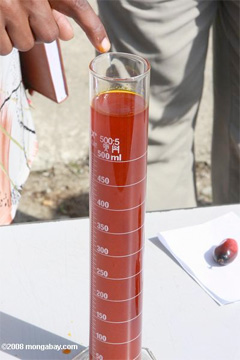 In a Perspectives piece in Science, John R. Regalbuto argues that the world will soon see a revolution in biofuels, but not those made from corn. Instead Regalbuto, program director of Catalysis and Biocatalysis at the National Science Foundation, says that the future of biofuels is in substances that can be converted into liquid hydrocarbons, […]
In a Perspectives piece in Science, John R. Regalbuto argues that the world will soon see a revolution in biofuels, but not those made from corn. Instead Regalbuto, program director of Catalysis and Biocatalysis at the National Science Foundation, says that the future of biofuels is in substances that can be converted into liquid hydrocarbons, […]
LUSH cosmetics launches campaign against palm oil
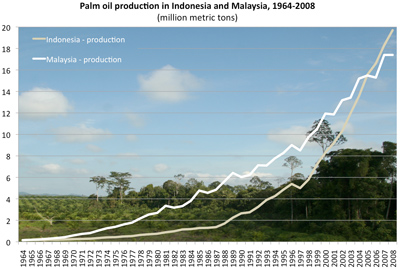 LUSH Cosmetics, a leading cosmetics-maker, will no longer use palm oil due to environmental concerns over its production. LUSH, which is now selling a palm oil-free soap, has launched a two-pronged campaign to make consumers aware of the impacts of palm cultivation on tropical forests and encourage other consumer-products companies, including Procter & Gamble, Unilever […]
LUSH Cosmetics, a leading cosmetics-maker, will no longer use palm oil due to environmental concerns over its production. LUSH, which is now selling a palm oil-free soap, has launched a two-pronged campaign to make consumers aware of the impacts of palm cultivation on tropical forests and encourage other consumer-products companies, including Procter & Gamble, Unilever […]
Limit palm oil development to lands that store less than 40 tons of carbon/ha – study
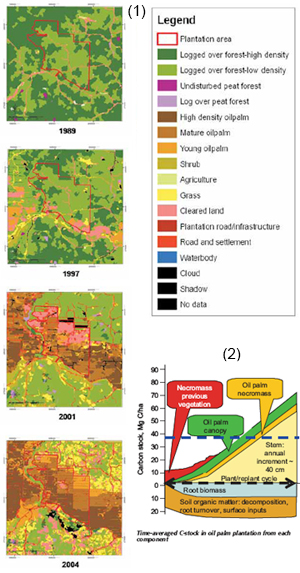 A new study finds oil palm plantations store less carbon than previously believed, suggesting that palm oil produced through the conversion of tropical forests carries a substantial carbon debt. The study, conducted at two sites in Sumatra and Kalimantan by scientists at the World Agroforestry Centre (ICRAF), found that mature oil palm plantations store less […]
A new study finds oil palm plantations store less carbon than previously believed, suggesting that palm oil produced through the conversion of tropical forests carries a substantial carbon debt. The study, conducted at two sites in Sumatra and Kalimantan by scientists at the World Agroforestry Centre (ICRAF), found that mature oil palm plantations store less […]
Beer waste to be used for home biofuel production
Southern California residents will soon be able to produce their own ethanol fuel from beer residue. GreenHouse, an alternative green energy company based in San Diego, California, has teamed with the Karl Strauss Brewing Company, to offer spent beer yeast as a biofuel feedstock for ethanol production in the E-Fuel MicroFueler, a portable ethanol micro-refinery […]
Smart biofuels that don’t hurt people or the environment are possible
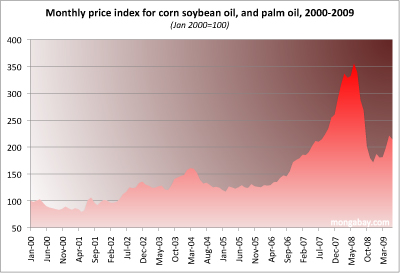 Sustainable biofuels can be a reality but only in combination with reductions in fuel demand and increased productivity on existing agricultural lands, argue researchers writing in the journal Science. Five years ago biofuels were seen as a panacea for the world’s energy hunger and the need to address climate change, but increased production of biofuels […]
Sustainable biofuels can be a reality but only in combination with reductions in fuel demand and increased productivity on existing agricultural lands, argue researchers writing in the journal Science. Five years ago biofuels were seen as a panacea for the world’s energy hunger and the need to address climate change, but increased production of biofuels […]
China to establish giant oil palm plantation in DR Congo
ZTE Agribusiness Company Ltd, a Chinese firm, plans to establish a one million hectare oil palm plantation in the Democratic Republic of Congo (DR Congo) for biofuel production, reports China state media. Zhang Peng, ZTE’s regional manager, told Xinhua that the plantation could yield up to 5 million tons of palm oil per year, 90 […]
Meeting food and energy demands by mid-century will be a challenge, says report
 Meeting food and energy demands in a world where human population is expected to reach 9 billion by mid-century will require a range of approaches that increase the sustainability of agricultural production, reports a new assessment from Deutsche Bank’s Climate Change Advisors (DBCCA). The report, titled “Investing in Agriculture: Far-Reaching Challenge, Significant Opportunity: An Asset […]
Meeting food and energy demands in a world where human population is expected to reach 9 billion by mid-century will require a range of approaches that increase the sustainability of agricultural production, reports a new assessment from Deutsche Bank’s Climate Change Advisors (DBCCA). The report, titled “Investing in Agriculture: Far-Reaching Challenge, Significant Opportunity: An Asset […]
Brazilian miner Vale signs $500M palm oil deal in the Amazon
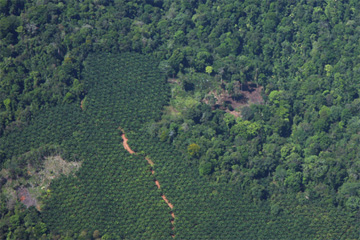 Vale, the world’s largest miner of iron ore, has signed a $500 million joint venture with Biopalma da Amazonia to produce 160,000 metric tons of palm oil-based biodiesel per year, reports Reuters. Vale says the deal will save $150 million in fuel costs starting in 2014, with palm oil biodiesel replacing up to 20 percent […]
Vale, the world’s largest miner of iron ore, has signed a $500 million joint venture with Biopalma da Amazonia to produce 160,000 metric tons of palm oil-based biodiesel per year, reports Reuters. Vale says the deal will save $150 million in fuel costs starting in 2014, with palm oil biodiesel replacing up to 20 percent […]
Bill Clinton speaks out for rainforests in Brazil
Former US president Bill Clinton spoke out against rainforest destruction on Monday in Brazil. Headlining the Ethanol Summit 2009 in Sao Paulo, Clinton spoke of the positive role ethanol could play in lowering carbon emissions, but not when at the expense of rainforest. “What people are worried about Brazil is not (whether) you have the […]
Bioelectricity bests ethanol on two fronts: land use and global warming
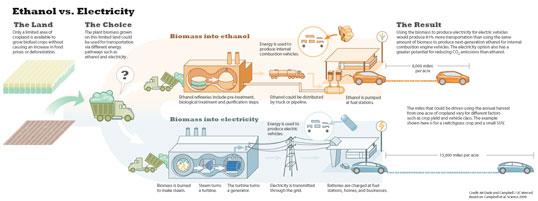 Yesterday the Obama Administration established a Biofuels Interagency Working Group to oversee implementation of new rules and research regarding biofuels. On the group’s first day they would do well to look at a new study in Science Magazine comparing the efficacy of ethanol versus bioelectricity. Researchers compared ethanol and bioelectricity in terms of miles per […]
Yesterday the Obama Administration established a Biofuels Interagency Working Group to oversee implementation of new rules and research regarding biofuels. On the group’s first day they would do well to look at a new study in Science Magazine comparing the efficacy of ethanol versus bioelectricity. Researchers compared ethanol and bioelectricity in terms of miles per […]
Sime Darby signs palm oil deal in Liberia
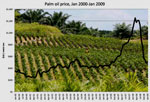 Sime Darby, a Malaysian palm oil producer, will invest $800 million in palm oil and rubber plantations in Liberia, reports Reuters. The deal will cover 200,000 hectares (500,000 acres) in the West African country. 80 percent of the investment would go towards development of Liberia’s palm oil industry, while the balance would be used to […]
Sime Darby, a Malaysian palm oil producer, will invest $800 million in palm oil and rubber plantations in Liberia, reports Reuters. The deal will cover 200,000 hectares (500,000 acres) in the West African country. 80 percent of the investment would go towards development of Liberia’s palm oil industry, while the balance would be used to […]
Environmental campaign blocks palm oil project in Cote d’ Ivoire wetland
Environmentalists have thwarted plans to establish an oil palm plantation in the Tanoe forest wetlands of southern Cote d’ Ivoire (Ivory Coast), reports AFP. In announcement Friday, Palmci, the country’s largest palm oil company, blamed environmental groups for scuttling the project. “Palmci has decided to abandon this project in the face of the refusal of […]
Malaysian palm oil targets the Amazon
 Update: Did Malaysia cancel plans for palm oil development in the Amazon? Malaysia’s Land Development Authority FELDA will soon break ground on a joint venture with a Brazilian firm to establish 30,000-100,000 hectares (75,000 – 250,000 acres) of oil palm plantations in the heart of the Amazon rainforest, reports the Malaysian Star. Brazil’s Ambassador to […]
Update: Did Malaysia cancel plans for palm oil development in the Amazon? Malaysia’s Land Development Authority FELDA will soon break ground on a joint venture with a Brazilian firm to establish 30,000-100,000 hectares (75,000 – 250,000 acres) of oil palm plantations in the heart of the Amazon rainforest, reports the Malaysian Star. Brazil’s Ambassador to […]
Economic crisis hurts forestry sector, sustainability initiatives
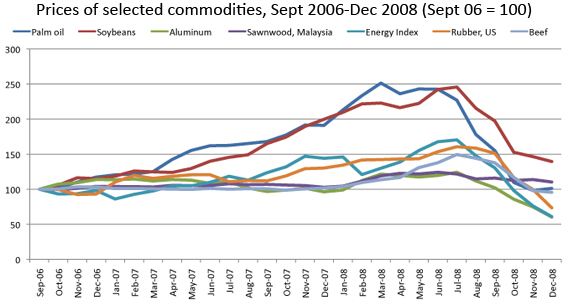
80% of agricultural expansion since 1980 came at expense of forests
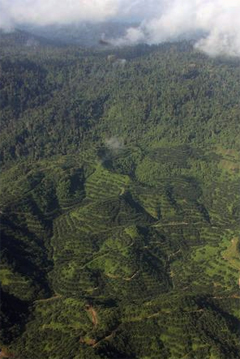 More than half of cropland expansion between 1980 and 2000 occurred at the expense of natural forests, while another 30 percent of occurred in disturbed forests, reported a Stanford University researcher presenting Saturday at the annual meeting of the American Association for the Advancement of Science (AAAS) in Chicago. Holly Gibbs, formerly of the University […]
More than half of cropland expansion between 1980 and 2000 occurred at the expense of natural forests, while another 30 percent of occurred in disturbed forests, reported a Stanford University researcher presenting Saturday at the annual meeting of the American Association for the Advancement of Science (AAAS) in Chicago. Holly Gibbs, formerly of the University […]
Cellulosic ethanol healthier, better for the environment, than corn ethanol
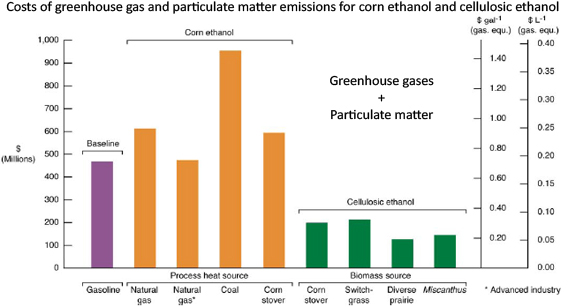 Prairie grass ethanol will kill fewer people and foul the environment less than corn ethanol
Prairie grass ethanol will kill fewer people and foul the environment less than corn ethanol
Biochar and its Role in Mitigating Climate Change
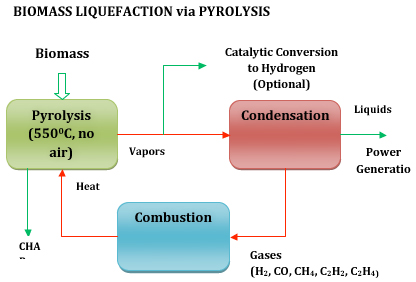 The growing concerns about climate change have brought biochar, a charcoal produced from biomass combustion, into limelight.
The growing concerns about climate change have brought biochar, a charcoal produced from biomass combustion, into limelight.
Finland, Sweden push for loophole that would drive destruction of peatlands around the world
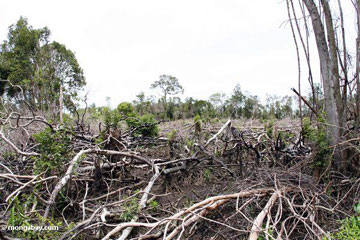 Finland, Sweden push for loophole that would drive destruction of peatlands around the world Finland, Sweden push for loophole that would drive destruction of peatlands around the world mongabay.com December 9, 2008
Finland, Sweden push for loophole that would drive destruction of peatlands around the world Finland, Sweden push for loophole that would drive destruction of peatlands around the world mongabay.com December 9, 2008
Degraded grasslands better option for palm oil production relative to rainforests, finds study
 Degraded grasslands best for palm oil biofuel production, finds study Degraded grasslands better option for palm oil production relative to rainforests, finds study Rhett A. Butler, mongabay.com December 3, 2008
Degraded grasslands best for palm oil biofuel production, finds study Degraded grasslands better option for palm oil production relative to rainforests, finds study Rhett A. Butler, mongabay.com December 3, 2008
Fall in palm oil price may lead to industry consolidation
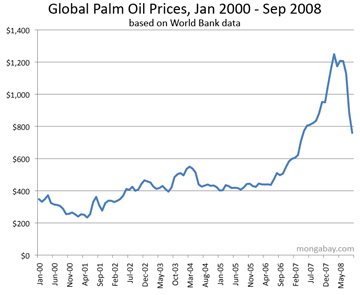 Fall in palm oil price may lead to industry consolidation Fall in palm oil price may lead to industry consolidation Rhett A. Butler, mongabay.com December 2, 2008
Fall in palm oil price may lead to industry consolidation Fall in palm oil price may lead to industry consolidation Rhett A. Butler, mongabay.com December 2, 2008
Biodiversity of rainforests should not be compared with oil palm plantations says palm oil council chief
 Scientists should not compare biodiversity of rainforests with oil palm plantations says palm oil council chief Biodiversity of rainforests should not be compared with oil palm plantations says palm oil council chief mongabay.com November 11, 2008 Dr. Yusof Basiron, the controversial CEO of the Malaysian Palm Oil Council (MPOC), blogs about the sustainability of palm […]
Scientists should not compare biodiversity of rainforests with oil palm plantations says palm oil council chief Biodiversity of rainforests should not be compared with oil palm plantations says palm oil council chief mongabay.com November 11, 2008 Dr. Yusof Basiron, the controversial CEO of the Malaysian Palm Oil Council (MPOC), blogs about the sustainability of palm […]
First RSPO-certified (“eco-friendly”) palm oil shipment to arrive in Europe
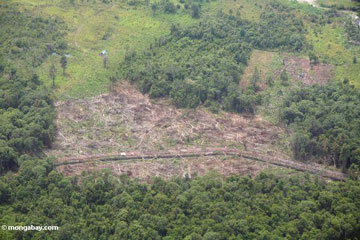 First RSPO-certified (“eco-friendly”) palm oil shipment to arrive in Europe First RSPO-certified (“eco-friendly”) palm oil shipment to arrive in Europe mongabay.com November 10, 2008
First RSPO-certified (“eco-friendly”) palm oil shipment to arrive in Europe First RSPO-certified (“eco-friendly”) palm oil shipment to arrive in Europe mongabay.com November 10, 2008
EU’s sustainable biofuels push angers Malaysia, Brazil
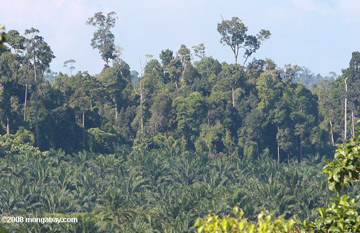 EU’s sustainable biofuels push angers Malaysia, Brazil EU’s sustainable biofuels push angers Malaysia, Brazil mongabay.com November 7, 2008
EU’s sustainable biofuels push angers Malaysia, Brazil EU’s sustainable biofuels push angers Malaysia, Brazil mongabay.com November 7, 2008
Air travel may be powered by biofuels in 3-5 years
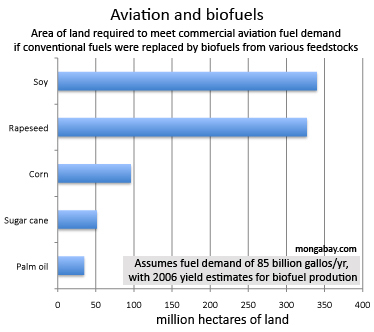 Air travel may be powered by biofuels in 3-5 years Air travel may be powered by biofuels in 3-5 years mongabay.com October 27, 2008 Boeing says biofuel-powered planes are only three-to-five years away from being a reality, reports The Guardian. “The certification will happen much sooner than anybody thought,” Darrin Morgan, Boeing’s director of environmental […]
Air travel may be powered by biofuels in 3-5 years Air travel may be powered by biofuels in 3-5 years mongabay.com October 27, 2008 Boeing says biofuel-powered planes are only three-to-five years away from being a reality, reports The Guardian. “The certification will happen much sooner than anybody thought,” Darrin Morgan, Boeing’s director of environmental […]
Cellulosic biofuels endanger old-growth forests in the southern U.S.
 Cellulosic biofuels endanger old-growth forests in the southern U.S. An interview with Scot Quandra of the Dogwood Alliance:Cellulosic biofuels endanger old-growth forests in the southern U.S. Jeremy Hance, mongabay.com October 16, 2008
Cellulosic biofuels endanger old-growth forests in the southern U.S. An interview with Scot Quandra of the Dogwood Alliance:Cellulosic biofuels endanger old-growth forests in the southern U.S. Jeremy Hance, mongabay.com October 16, 2008
Palm oil industry relies on greenwashing to mislead consumers, alleges report
 Palm oil industry relies on greenwashing to mislead consumers, alleges report Palm oil industry relies on greenwashing to mislead consumers, alleges report mongabay.com October 8, 2008
Palm oil industry relies on greenwashing to mislead consumers, alleges report Palm oil industry relies on greenwashing to mislead consumers, alleges report mongabay.com October 8, 2008
U.S. needs environmental standards for biofuels
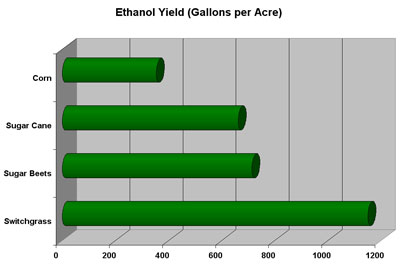 U.S. needs environmental standards for biofuels U.S. needs environmental standards for biofuels mongabay.com October 2, 2008
U.S. needs environmental standards for biofuels U.S. needs environmental standards for biofuels mongabay.com October 2, 2008
11 species of monkeys discovered in West African biodiversity hotspot
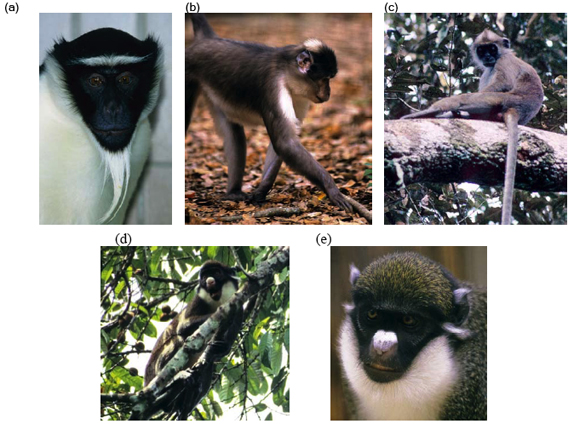 11 species of monkeys discovered in West African biodiversity hotspot 11 species of monkeys discovered in West African biodiversity hotspot mongabay.com September 15, 2008 Urgent conservation measures are needed to protect some of the world's most endangered primates from the hunting, logging, and oil palm development in a region that has only recently emerged from […]
11 species of monkeys discovered in West African biodiversity hotspot 11 species of monkeys discovered in West African biodiversity hotspot mongabay.com September 15, 2008 Urgent conservation measures are needed to protect some of the world's most endangered primates from the hunting, logging, and oil palm development in a region that has only recently emerged from […]
Threatened forest in Kenya home to a diversity of bird life
 Threatened forest in Kenya home to a diversity of bird life Threatened forest in Kenya home to a diversity of bird life mongabay.com September 15, 2008 The Tana River forest in coastal Kenya is home to a diverse array of bird species but is increasingly under threat from logging, agricultural expansion, and unsustainable harvesting of […]
Threatened forest in Kenya home to a diversity of bird life Threatened forest in Kenya home to a diversity of bird life mongabay.com September 15, 2008 The Tana River forest in coastal Kenya is home to a diverse array of bird species but is increasingly under threat from logging, agricultural expansion, and unsustainable harvesting of […]
Malaysian palm oil industry accused of child slavery by the Indonesian government
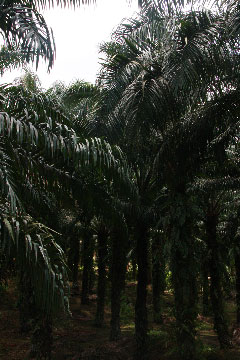 Malaysian palm oil industry accused of child slavery by Indonesia Malaysian palm oil industry accused of child slavery by Indonesia mongabay.com September 17, 2008 Indonesia’s Commission for Child Protection has accused Malaysia’s oil palm planters of enslaving migrant workers and their children at plantations in the state of Sabah on the island of Borneo, reports […]
Malaysian palm oil industry accused of child slavery by Indonesia Malaysian palm oil industry accused of child slavery by Indonesia mongabay.com September 17, 2008 Indonesia’s Commission for Child Protection has accused Malaysia’s oil palm planters of enslaving migrant workers and their children at plantations in the state of Sabah on the island of Borneo, reports […]
Rainforest conversion to oil palm causes 83% of wildlife to disappear
 Rainforest conversion to oil palm causes 83% of wildlife to disappear Rainforest conversion to oil palm causes 83% of wildlife to disappear mongabay.com September 15, 2008 Conversion of primary rainforest to an oil palm plantation results in a loss of more than 80 percent of species, reports a new comprehensive review of the impacts of […]
Rainforest conversion to oil palm causes 83% of wildlife to disappear Rainforest conversion to oil palm causes 83% of wildlife to disappear mongabay.com September 15, 2008 Conversion of primary rainforest to an oil palm plantation results in a loss of more than 80 percent of species, reports a new comprehensive review of the impacts of […]
Europe cuts biofuel targets to 4% in 2015, 6% in 2020
 Europe cuts biofuel targets to 4% in 2015, 6% in 2020 Europe cuts biofuel targets to 4% in 2015, 6% in 2020 mongabay.com September 12, 2008 The European Union significantly reduces targets for biofuels produced from food sources, while boosting goals for other renewables The E.U. voted to relax biofuels targets following widespread criticism of […]
Europe cuts biofuel targets to 4% in 2015, 6% in 2020 Europe cuts biofuel targets to 4% in 2015, 6% in 2020 mongabay.com September 12, 2008 The European Union significantly reduces targets for biofuels produced from food sources, while boosting goals for other renewables The E.U. voted to relax biofuels targets following widespread criticism of […]
Falling palm oil price makes palm biodiesel viable, may offer target for NGOs
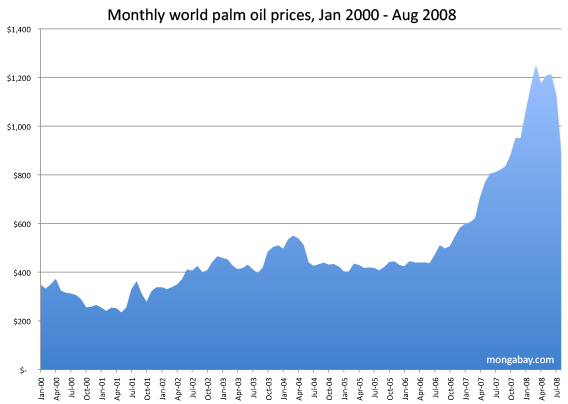 Falling palm oil price makes palm biodiesel viable, may offer target for NGOs Falling palm oil price makes palm biodiesel viable, may offer target for NGOs Commentary Rhett A. Butler, mongabay.com September 10, 2008 Plunging palm oil prices are increasing its attractiveness as a biofuel feedstock and thereby helping buoy demand for the oilseed, reports […]
Falling palm oil price makes palm biodiesel viable, may offer target for NGOs Falling palm oil price makes palm biodiesel viable, may offer target for NGOs Commentary Rhett A. Butler, mongabay.com September 10, 2008 Plunging palm oil prices are increasing its attractiveness as a biofuel feedstock and thereby helping buoy demand for the oilseed, reports […]
Republicans backtrack, call for end to ethanol requirements in gas
Republicans backtrack, call for end to ethanol requirements in gas Republicans backtrack, call for end to ethanol requirements in gas mongabay.com September 2, 2008 Meeting at the Republican National Convention in St. Paul, Minnesota, Republicans Monday called for an end to a requirement that gasoline contain a set amount of ethanol, reports Reuters. Critics have […]
Palm oil producers in Indonesia reject moratorium on forest destruction
 Palm oil producers in Indonesia reject moratorium on forest destruction Palm oil producers in Indonesia reject moratorium on forest destruction mongabay.com August 28, 2008 Palm oil companies operating in Indonesia have rejected a proposed moratorium on clearing forests and peatlands for oil palm plantations, reports the Jakarta Post. The Indonesian Palm Oil Producers Association (GAPKI) […]
Palm oil producers in Indonesia reject moratorium on forest destruction Palm oil producers in Indonesia reject moratorium on forest destruction mongabay.com August 28, 2008 Palm oil companies operating in Indonesia have rejected a proposed moratorium on clearing forests and peatlands for oil palm plantations, reports the Jakarta Post. The Indonesian Palm Oil Producers Association (GAPKI) […]
Two large populations of endangered monkeys discovered in Cambodia
 Two large populations of endangered monkeys discovered in Cambodia Two large populations of endangered monkeys discovered in Cambodia mongabay.com August 28, 2008 Conservationists have discovered “surprisingly large populations” of two globally threatened primates in a protected area in Cambodia. The yellow-cheeked crested gibbon (top) [Credit: Matt Hunt] and the black-shanked douc langur (bottom) [Credit: Allan […]
Two large populations of endangered monkeys discovered in Cambodia Two large populations of endangered monkeys discovered in Cambodia mongabay.com August 28, 2008 Conservationists have discovered “surprisingly large populations” of two globally threatened primates in a protected area in Cambodia. The yellow-cheeked crested gibbon (top) [Credit: Matt Hunt] and the black-shanked douc langur (bottom) [Credit: Allan […]
Biofuels 200 times more expensive than forest conservation for global warming mitigation
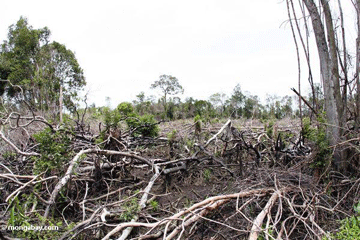 Biofuels up to 200 times more expensive than forest conservation for global warming mitigation Biofuels 200 times more expensive than forest conservation for global warming mitigation mongabay.com August 27, 2008 The British government should end subsidies for biofuels and instead use the funds to slow destruction of rainforests and tropical peatlands argues a new report […]
Biofuels up to 200 times more expensive than forest conservation for global warming mitigation Biofuels 200 times more expensive than forest conservation for global warming mitigation mongabay.com August 27, 2008 The British government should end subsidies for biofuels and instead use the funds to slow destruction of rainforests and tropical peatlands argues a new report […]
Malaysia targets Africa and the Amazon for oil palm expansion
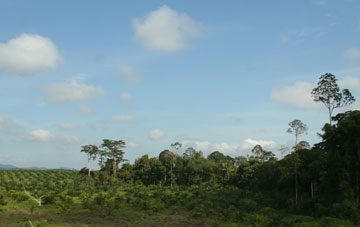 Malaysia targets Africa, the Amazon for oil palm expansion Malaysia targets Africa and the Amazon for palm oil expansion mongabay.com August 25, 2008 Facing land scarcity at home and environmental complaints, Malaysian palm oil producers should look overseas to expand operations, a high-ranking Malaysian agricultural minister said Monday. Speaking to reporters in Kuala Lumpur, Malaysian […]
Malaysia targets Africa, the Amazon for oil palm expansion Malaysia targets Africa and the Amazon for palm oil expansion mongabay.com August 25, 2008 Facing land scarcity at home and environmental complaints, Malaysian palm oil producers should look overseas to expand operations, a high-ranking Malaysian agricultural minister said Monday. Speaking to reporters in Kuala Lumpur, Malaysian […]
Brazil to establish oil palm plantations on degraded Amazon rainforest lands
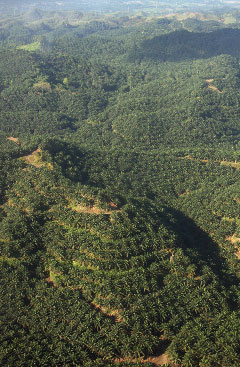 Brazil to establish oil palm plantations on degraded Amazon rainforest lands Brazil to establish oil palm plantations on degraded Amazon rainforest lands mongabay.com August 20, 2008 Brazil to compete with Malaysia in palm oil production but environmentalists worry redrawing of forest reserve law will hurt biodiversity conservation efforts. Brazil will allow the establishment of oil […]
Brazil to establish oil palm plantations on degraded Amazon rainforest lands Brazil to establish oil palm plantations on degraded Amazon rainforest lands mongabay.com August 20, 2008 Brazil to compete with Malaysia in palm oil production but environmentalists worry redrawing of forest reserve law will hurt biodiversity conservation efforts. Brazil will allow the establishment of oil […]
Algae could yield 30 times more biofuel than soybeans, while cleaning the environment
Algae could yield 30 times more biofuel than soybeans, while cleaning the environment Algae could yield 30 times more biofuel than soybeans, while cleaning the environment mongabay.com August 15, 2008 Algae could be used as a biofuel while simultaneously cleaning up the environment, report researchers at the University of Virginia. By feeding algae extra carbon […]
Brazil may ban new sugar cane cultivation in the Pantanal
 Brazil may ban new sugar cane cultivation in the Pantanal Brazil may ban new sugar cane cultivation in the Pantanal mongabay.com August 6, 2008 Brazil would restrict sugar cane cultivation in the world’s largest tropical wetland under a proposed plan to protect the Pantanal, reports Reuters. The proposal would ban new ethanol plants in the […]
Brazil may ban new sugar cane cultivation in the Pantanal Brazil may ban new sugar cane cultivation in the Pantanal mongabay.com August 6, 2008 Brazil would restrict sugar cane cultivation in the world’s largest tropical wetland under a proposed plan to protect the Pantanal, reports Reuters. The proposal would ban new ethanol plants in the […]
Future threats to the Amazon rainforest
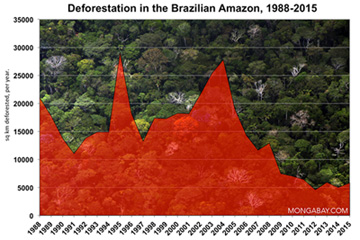 Future threats to the Amazon rainforest Future threats to the Amazon rainforest Rhett A. Butler, mongabay.com July 31, 2008 Between June 2000 and June 2008, more than 150,000 square kilometers of rainforest were cleared in the Brazilian Amazon. While deforestation rates have slowed since 2004, forest loss is expected to continue for the foreseeable future.Here […]
Future threats to the Amazon rainforest Future threats to the Amazon rainforest Rhett A. Butler, mongabay.com July 31, 2008 Between June 2000 and June 2008, more than 150,000 square kilometers of rainforest were cleared in the Brazilian Amazon. While deforestation rates have slowed since 2004, forest loss is expected to continue for the foreseeable future.Here […]
Facing criticism, biofuels industry forms new lobby group to influence lawmakers
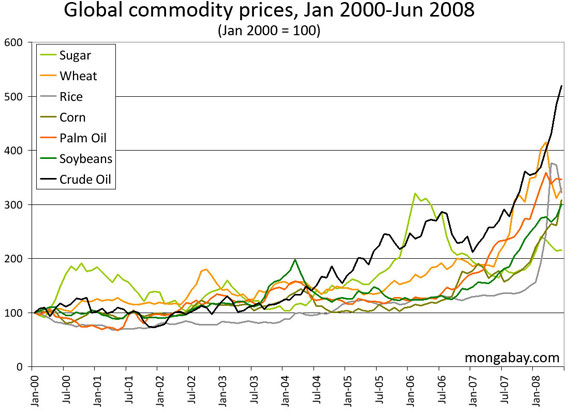 Facing criticism, biofuels industry forms new lobby group to influence lawmakers Facing criticism, biofuels industry forms new lobby group to influence lawmakers mongabay.com July 25, 2008 Under attack by politicians, aid groups, and environmentalists for driving up food prices and fueling destruction of ecologically sensitive habitats, some of the world’s largest agroindustrial firms have formed […]
Facing criticism, biofuels industry forms new lobby group to influence lawmakers Facing criticism, biofuels industry forms new lobby group to influence lawmakers mongabay.com July 25, 2008 Under attack by politicians, aid groups, and environmentalists for driving up food prices and fueling destruction of ecologically sensitive habitats, some of the world’s largest agroindustrial firms have formed […]
Biofuels can reduce emissions, but not when grown in place of rainforests
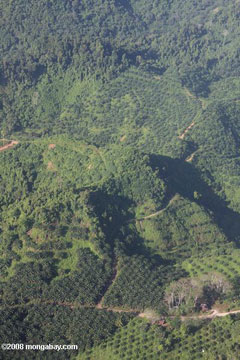 Biofuels can reduce emissions, but not when grown in place of rainforests Biofuels can reduce emissions, but not when grown in place of rainforests mongabay.com July 22, 2008 Biofuels meant to help alleviate greenhouse gas emissions may be in fact contributing to climate change when grown on converted tropical forest lands, warns a comprehensive study […]
Biofuels can reduce emissions, but not when grown in place of rainforests Biofuels can reduce emissions, but not when grown in place of rainforests mongabay.com July 22, 2008 Biofuels meant to help alleviate greenhouse gas emissions may be in fact contributing to climate change when grown on converted tropical forest lands, warns a comprehensive study […]
Beyond high food prices, little to show for $11B/yr in biofuel support, says OECD report
 Beyond high food prices, little to show for $11B/yr in biofuel support, says OECD report Beyond high food prices, little to show for $11B/yr in biofuel support, says OECD report mongabay.com July 17, 2008 Government support of biofuel production in rich countries is squandering vast amounts of amounts of money while exacerbating the global food […]
Beyond high food prices, little to show for $11B/yr in biofuel support, says OECD report Beyond high food prices, little to show for $11B/yr in biofuel support, says OECD report mongabay.com July 17, 2008 Government support of biofuel production in rich countries is squandering vast amounts of amounts of money while exacerbating the global food […]
Using farm waste for ethanol may hurt crop yields in some areas
Using farm waste for ethanol may hurt soil fertility in some areas Using farm waste for ethanol may hurt crop yields mongabay.com July 15, 2008 Cellulosic ethanol proponents have pushed the idea of using farm waste as a way to boost biofuel production without impacting food crops, but such conversion may carry a hidden cost […]
Biofuels, food demand may doom tropical forests
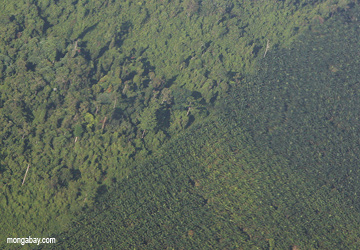 Biofuels, food demand may doom tropical forests Biofuels, food demand may doom tropical forests mongabay.com July 15, 2008 Rising demand for fuel, food, and wood products will take a heavy toll on tropical forests, warns a new report released by the Rights and Resources Initiative (RRI). The study, titled “Seeing People through the Trees, estimates […]
Biofuels, food demand may doom tropical forests Biofuels, food demand may doom tropical forests mongabay.com July 15, 2008 Rising demand for fuel, food, and wood products will take a heavy toll on tropical forests, warns a new report released by the Rights and Resources Initiative (RRI). The study, titled “Seeing People through the Trees, estimates […]
Palm oil industry moves into the Amazon rainforest
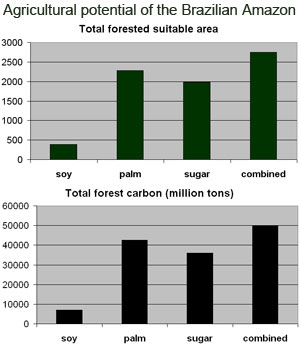 Palm oil industry moves into the Amazon rainforest Amazon palm oil:Palm oil industry moves into the Amazon rainforest Rhett Butler, mongabay.com July 9, 2008 Malaysia’s Land Development Authority FELDA has announced plans to immediately establish 100,000 hectares (250,000) of oil palm plantations in the Brazilian Amazon. The agency will partner with Braspalma, a local company, […]
Palm oil industry moves into the Amazon rainforest Amazon palm oil:Palm oil industry moves into the Amazon rainforest Rhett Butler, mongabay.com July 9, 2008 Malaysia’s Land Development Authority FELDA has announced plans to immediately establish 100,000 hectares (250,000) of oil palm plantations in the Brazilian Amazon. The agency will partner with Braspalma, a local company, […]
Britain urges ‘cautious approach’ on biofuels
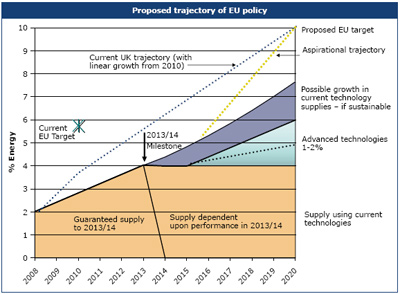 Britain urges ‘cautious approach’ on biofuels Britain urges ‘cautious approach’ on biofuels mongabay.com July 7, 2008 Britain and the E.U. should exercise caution in pushing for wider use of biofuels, warns a new study commissioned by the U.K. government. The report — dubbed the “Gallagher review” [PDF] for Ed Gallagher, the chair of the government’s […]
Britain urges ‘cautious approach’ on biofuels Britain urges ‘cautious approach’ on biofuels mongabay.com July 7, 2008 Britain and the E.U. should exercise caution in pushing for wider use of biofuels, warns a new study commissioned by the U.K. government. The report — dubbed the “Gallagher review” [PDF] for Ed Gallagher, the chair of the government’s […]
Clean energy gold rush in 2007
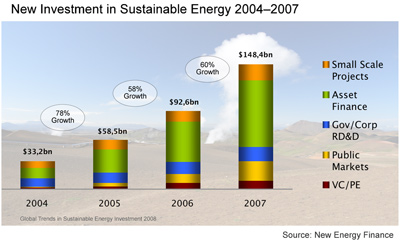 Clean energy investments rose 60% to $148 billion in 2007 Clean energy gold rush in 2007 mongabay.com July 1, 2008 New investment in renewables and energy efficiency surpassed $148 billion in 2007, rising 60 percent rise from 2006, according to an analysis issued Tuesday July 1 by the UN Environment Programme (UNEP). High oil prices […]
Clean energy investments rose 60% to $148 billion in 2007 Clean energy gold rush in 2007 mongabay.com July 1, 2008 New investment in renewables and energy efficiency surpassed $148 billion in 2007, rising 60 percent rise from 2006, according to an analysis issued Tuesday July 1 by the UN Environment Programme (UNEP). High oil prices […]
Brazil fines 24 ethanol producers for illegal forest clearing
Brazil fines 24 ethanol producers for illegal forest clearing Brazil fines 24 ethanol producers for illegal forest clearing mongabay.com July 1, 2008 Brazil fined two dozen ethanol producers accused of illegal clearing the country’s endangered Mata Atlântica or Atlantic rainforest, reports The Associated Press. The companies face 120 million reals (US$75 million) in fines for […]
Louisiana signs non-corn ethanol law to produce a better biofuel
Louisiana signs non-corn ethanol law to produce a better biofuel Louisiana signs non-corn ethanol law for to produce a better biofuel mongabay.com July 1, 2008 Louisiana has signed into law legislation to develop an advanced biofuel industry that excludes corn as a feedstock, reports Biopact. The Advanced Biofuel Industry Development Initiative will promote high yielding […]
Brazil signs sustainable ethanol deal with Sweden
Brazil signs sustainable ethanol deal with Sweden Brazil signs sustainable ethanol deal with Sweden mongabay.com June 27, 2008 A group of Brazilian ethanol producers has signed the first deal to export certified sustainable ethanol, reports Reuters. Four firms — Cosan, Guarani, NovAmerica and Alcoeste — will sell 115 million liters of anhydrous ethanol certified to […]
Kenya to convert 20,000 ha of key wetland for ethanol production
Kenya to convert 20,000 ha of key wetland for ethanol production Kenya to convert 20,000 ha of key wetland for ethanol production mongabay.com June 25, 2008 The Kenyan government will allow more than 20,000 ha (50,000 acres) of ecologically-sensitive wetland to be converted into a sugar cane plantation for biofuel production, reports The Guardian. Environmentalists […]
Biofuel production on abandoned lands could meet 8% of global energy needs
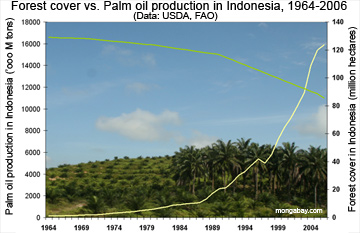 Biofuel production on abandoned lands could meet 20% of global oil demand Biofuel production on abandoned lands could meet 20% of global oil demand mongabay.com June 23, 2008 Using abandoned agricultural lands for biofuel production will meet only a small fraction of global energy needs without compromising food supplies or diminishing biologically-rich habitats, reports a […]
Biofuel production on abandoned lands could meet 20% of global oil demand Biofuel production on abandoned lands could meet 20% of global oil demand mongabay.com June 23, 2008 Using abandoned agricultural lands for biofuel production will meet only a small fraction of global energy needs without compromising food supplies or diminishing biologically-rich habitats, reports a […]
U.S. may allow corn farming on conservation land
U.S. may allow corn farming on conservation land U.S. may allow corn farming on conservation land mongabay.com June 23, 2008 The U.S. Department of Agriculture may allow farmers to plant corn on million of acres of conservation land to bolster the food supply in response to flooding in the Midwest and record high prices spurred […]
Rainforests face array of emerging threats
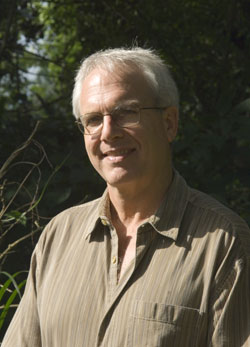 Emerging threats to rainforests Rainforests face array of emerging threats Rhett Butler, mongabay.com June 15, 2008 Tropical forests face a number of emerging threats said a leading biologist speaking at a scientific conference in Paramaribo, Suriname. William F. Laurance, a researcher at the Smithsonian Tropical Research Center (STRI), told the annual meeting of the Association […]
Emerging threats to rainforests Rainforests face array of emerging threats Rhett Butler, mongabay.com June 15, 2008 Tropical forests face a number of emerging threats said a leading biologist speaking at a scientific conference in Paramaribo, Suriname. William F. Laurance, a researcher at the Smithsonian Tropical Research Center (STRI), told the annual meeting of the Association […]
Nestle Chairman: Biofuels are “ethically indefensible”
 Is global drying a higher priority than global warming? Nestle Chairman: Biofuels are “ethically indefensible” mongabay.com June 14, 2008 The emergence and expansion of biofuels produced from food crops has exacerabted world’s agriculture and water crisis and is a bigger short-term threat than global warming, argued Peter Brabeck-Letmathe in an editorial published Thursday in the […]
Is global drying a higher priority than global warming? Nestle Chairman: Biofuels are “ethically indefensible” mongabay.com June 14, 2008 The emergence and expansion of biofuels produced from food crops has exacerabted world’s agriculture and water crisis and is a bigger short-term threat than global warming, argued Peter Brabeck-Letmathe in an editorial published Thursday in the […]
Cellulosic biofuels may be viable alternative to gas within 5 years
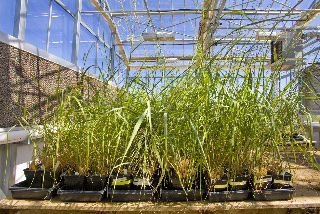 Cellulosic biofuels may be viable alternative to gas within 5 years High fuel prices to make cellulosic biofuels increasingly competitive with gas Madolyn Rogers, special to mongabay.com June 2, 2008 A new institute in the San Francisco Bay Area is seeking to make cellulosic biofuel an economically viable alternative to corn ethanol and gasoline within […]
Cellulosic biofuels may be viable alternative to gas within 5 years High fuel prices to make cellulosic biofuels increasingly competitive with gas Madolyn Rogers, special to mongabay.com June 2, 2008 A new institute in the San Francisco Bay Area is seeking to make cellulosic biofuel an economically viable alternative to corn ethanol and gasoline within […]
Biofuels expansion in Africa may impact rainforests, wetlands
Biofuels expansion in Africa may impact rainforests, wetlands Biofuels expansion in Africa may impact rainforests, wetlands mongabay.com May 28, 2008 Biofuel feedstock expansion in Africa will likely come at the expense of ecologically-sensitive lands, reports a new analysis presented by Wetlands International at the Convention of Biological Diversity in Bonn. The study, titled Biofuel production […]
Next gen biofuels could decimate rainforests
 Next gen biofuels could decimate rainforests Next gen biofuels could decimate rainforests mongabay.com May 27, 2008 Next generation biofuels could decimate tropical forests says a leading ecologist from the University of Minnesota. Speaking at Stanford University on May 15, Dr. David Tilman said cellulosic ethanol technologies that convert biomass directly into biofuels could put new […]
Next gen biofuels could decimate rainforests Next gen biofuels could decimate rainforests mongabay.com May 27, 2008 Next generation biofuels could decimate tropical forests says a leading ecologist from the University of Minnesota. Speaking at Stanford University on May 15, Dr. David Tilman said cellulosic ethanol technologies that convert biomass directly into biofuels could put new […]
Will consumers pay 10% premium for sustainable palm oil?
 Will consumers pay 10% premium for sustainable palm oil? 10% premium for sustainable palm oil? mongabay.com May 21, 2008 Will consumers pay a premium for a product that is less damaging to the environment? The palm oil industry intends to find out whether buyers will put their money where there mouth is. The first shipments […]
Will consumers pay 10% premium for sustainable palm oil? 10% premium for sustainable palm oil? mongabay.com May 21, 2008 Will consumers pay a premium for a product that is less damaging to the environment? The palm oil industry intends to find out whether buyers will put their money where there mouth is. The first shipments […]
Half of oil palm expansion in Malaysia, Indonesia occurs at expense of forests
 Half of oil palm expansion in Malaysia, Indonesia occurs at expense of forests Half of oil palm expansion in Malaysia, Indonesia occurs at expense of forests mongabay.com May 20, 2008 More than half of the oil palm expansion between 1990 and 2005 in Malaysia and Indonesia occurred at expense of forests, reports a new analysis […]
Half of oil palm expansion in Malaysia, Indonesia occurs at expense of forests Half of oil palm expansion in Malaysia, Indonesia occurs at expense of forests mongabay.com May 20, 2008 More than half of the oil palm expansion between 1990 and 2005 in Malaysia and Indonesia occurred at expense of forests, reports a new analysis […]
Global ban on biofuels would lead to immediate decline in food prices
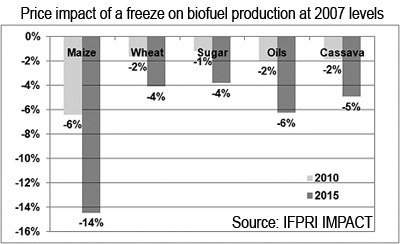 Global ban on biofuels would lead to immediate decline in food prices Global ban on biofuels would lead to immediate decline in food prices mongabay.com May 16, 2008 A global moratorium on biofuels produced from food crops would result in a significant decline in the price of corn, sugar, cassava and wheat by 2010, according […]
Global ban on biofuels would lead to immediate decline in food prices Global ban on biofuels would lead to immediate decline in food prices mongabay.com May 16, 2008 A global moratorium on biofuels produced from food crops would result in a significant decline in the price of corn, sugar, cassava and wheat by 2010, according […]
Indonesian palm oil firms pledge to stop clearing rainforests
 Palm oil firms pledge to stop clearing rainforests in Indonesia Palm oil firms pledge to stop clearing rainforests in Indonesia mongabay.com May 13, 2008 Palm oil companies operating in Indonesia pledged to stop clearing forests for new plantations, reports The Jakarta Post. The move is a response to growing criticism that oil palm expansion is […]
Palm oil firms pledge to stop clearing rainforests in Indonesia Palm oil firms pledge to stop clearing rainforests in Indonesia mongabay.com May 13, 2008 Palm oil companies operating in Indonesia pledged to stop clearing forests for new plantations, reports The Jakarta Post. The move is a response to growing criticism that oil palm expansion is […]
46% of Brazil’s energy comes from renewable sources
46% of Brazil’s energy comes from renewable sources 46% of Brazil’s energy comes from renewable sources mongabay.com May 13, 2008 Preliminary data from Brazil’s energy ministry shows that bioenergy derived from sugar cane surpassed hydroelectric power as Brazil’s secondary largest source of energy in 2007, reports Biopact. The annual National Energy Balance report produced by […]
Sustainability conference reveals a rift in the Malaysian Palm Oil Council
 Sustainability conference reveals a rift in the Malaysian Palm Oil Council Sustainability conference reveals a rift in the Malaysian Palm Oil Council Rhett Butler, mongabay.com May 1, 2008 Last month’s sustainability conference sponsored by the Malaysian Palm Oil Council (MPOC) revealed a rift between some planters and the industry marketing organization. Speaking on the condition […]
Sustainability conference reveals a rift in the Malaysian Palm Oil Council Sustainability conference reveals a rift in the Malaysian Palm Oil Council Rhett Butler, mongabay.com May 1, 2008 Last month’s sustainability conference sponsored by the Malaysian Palm Oil Council (MPOC) revealed a rift between some planters and the industry marketing organization. Speaking on the condition […]
High palm oil prices kill the biodiesel market for Asia
 High palm oil prices kill the biodiesel market for Asia High palm oil prices kill the biodiesel market for Asia mongabay.com May 1, 2008 High palm oil prices have forced investors to shelve plans for biodiesel refineries, according to The Wall Street Journal. With the feedstock accounting for as much as 80 percent of the […]
High palm oil prices kill the biodiesel market for Asia High palm oil prices kill the biodiesel market for Asia mongabay.com May 1, 2008 High palm oil prices have forced investors to shelve plans for biodiesel refineries, according to The Wall Street Journal. With the feedstock accounting for as much as 80 percent of the […]
Unilever calls for ban on rainforest destruction for palm oil
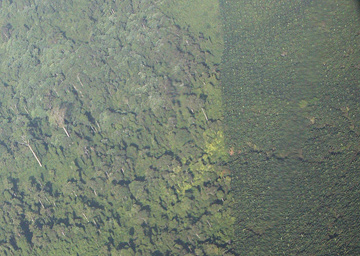 Unilever calls for ban on rainforest destruction for palm oil Unilever calls for ban on rainforest destruction for palm oil mongabay.com May 1, 2008 Unilever, the world’s largest consumer good company, will start using palm oil from certified sustainable sources this year and aims to have all its palm oil certified by 2015, according to […]
Unilever calls for ban on rainforest destruction for palm oil Unilever calls for ban on rainforest destruction for palm oil mongabay.com May 1, 2008 Unilever, the world’s largest consumer good company, will start using palm oil from certified sustainable sources this year and aims to have all its palm oil certified by 2015, according to […]
Unilever admits it can’t trace origin of palm oil used in its products
 Unilever admits it can’t trace origin of palm oil used in its products Unilever admits it can’t trace origin of palm oil used in its products mongabay.com April 21, 2008 Unilever has admitted to Greenpeace that it can’t trace the origin of palm oil supplied by firms operating in Indonesia. The revelation suggests that efforts […]
Unilever admits it can’t trace origin of palm oil used in its products Unilever admits it can’t trace origin of palm oil used in its products mongabay.com April 21, 2008 Unilever has admitted to Greenpeace that it can’t trace the origin of palm oil supplied by firms operating in Indonesia. The revelation suggests that efforts […]
Malaysian palm oil industry puts sustainability in the spotlight
 Malaysian palm oil industry puts sustainability in the spotlight Malaysian palm oil industry puts sustainability in the spotlight Rhett Butler, mongabay.com April 17, 2008 Seeking to differentiate its palm oil from that produced less responsibly in other countries, the Malaysian Palm Oil Council (MPOC) sponsored a three-day meeting this week in Kota Kinabalu, on the […]
Malaysian palm oil industry puts sustainability in the spotlight Malaysian palm oil industry puts sustainability in the spotlight Rhett Butler, mongabay.com April 17, 2008 Seeking to differentiate its palm oil from that produced less responsibly in other countries, the Malaysian Palm Oil Council (MPOC) sponsored a three-day meeting this week in Kota Kinabalu, on the […]
Amazon soy ban seems to be effective in reducing explicit deforestation
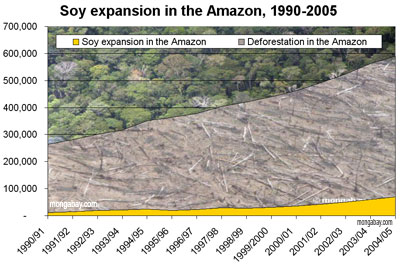 An industry-led ban on soy production in the Amazon appears to be proving effective at reducing new clearing for explicit soy production, according to a survey published Monday by Greenpeace and the Brazilian Vegetable Oils Industry Association. The moratorium, which was signed by some of the largest soy crushers in the Amazon in response to […]
An industry-led ban on soy production in the Amazon appears to be proving effective at reducing new clearing for explicit soy production, according to a survey published Monday by Greenpeace and the Brazilian Vegetable Oils Industry Association. The moratorium, which was signed by some of the largest soy crushers in the Amazon in response to […]
Global warming solutions are harming indigenous people, says U.N.
 Global warming solutions are hurting indigenous people, says U.N. Global warming solutions are hurting indigenous people, says U.N. mongabay.com April 2, 2008 Large-scale solutions intended to help mitigate global warming are harming the very indigenous people who are likely to bear the brunt of climate change, warned the United Nations University (UNU) at a conference […]
Global warming solutions are hurting indigenous people, says U.N. Global warming solutions are hurting indigenous people, says U.N. mongabay.com April 2, 2008 Large-scale solutions intended to help mitigate global warming are harming the very indigenous people who are likely to bear the brunt of climate change, warned the United Nations University (UNU) at a conference […]
Cellulosic energy may trigger dramatic collapse in the Amazon
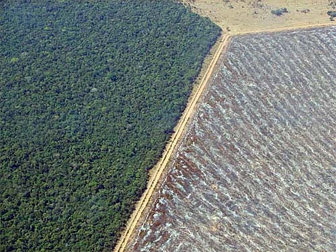 Cellulosic energy may trigger dramatic change in the Amazon Cellulosic energy may trigger dramatic collapse in the Amazon Rhett A. Butler, mongabay.com March 11, 2008 Next generation biofuels may trigger the ecological collapse of the Amazon frontier and could have profoundly unexpected economic consequences for the region, warns a paper published in Philosophical Transactions of […]
Cellulosic energy may trigger dramatic change in the Amazon Cellulosic energy may trigger dramatic collapse in the Amazon Rhett A. Butler, mongabay.com March 11, 2008 Next generation biofuels may trigger the ecological collapse of the Amazon frontier and could have profoundly unexpected economic consequences for the region, warns a paper published in Philosophical Transactions of […]
Corn ethanol is worsening the Gulf dead zone
 Corn ethanol is worsening the Gulf dead zone Corn ethanol is worsening the Gulf dead zone mongabay.com March 10, 2008 Proposed legislation that will expand corn-ethanol production in the United States will worsen the growing “dead zone” in the Gulf of Mexico and hurt marine fisheries, report researchers writing in the Proceedings of the National […]
Corn ethanol is worsening the Gulf dead zone Corn ethanol is worsening the Gulf dead zone mongabay.com March 10, 2008 Proposed legislation that will expand corn-ethanol production in the United States will worsen the growing “dead zone” in the Gulf of Mexico and hurt marine fisheries, report researchers writing in the Proceedings of the National […]
Record food prices to climb through 2010
 Record food prices to climb through 2010 Record food prices to climb through 2010 mongabay.com March 6, 2008 The U.N. expects record high food prices to continue through 2010, driving hunger and poverty in the world’s poorest countries, said a top U.N. official Thursday. Speaking in Brussels at a meeting with European Union officials, Josette […]
Record food prices to climb through 2010 Record food prices to climb through 2010 mongabay.com March 6, 2008 The U.N. expects record high food prices to continue through 2010, driving hunger and poverty in the world’s poorest countries, said a top U.N. official Thursday. Speaking in Brussels at a meeting with European Union officials, Josette […]
Half the Amazon rainforest will be lost within 20 years
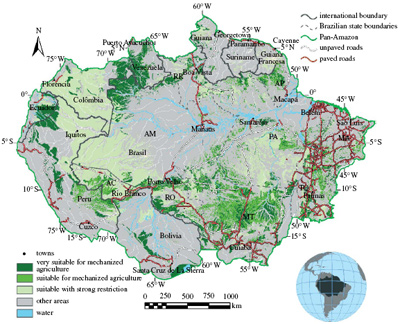 More than half the Amazon will be lost within 20 years Half the Amazon rainforest will be lost within 20 years Rhett Butler, mongabay.com February 27, 2008 More than half the Amazon rainforest will be damaged or destroyed within 20 years if deforestation, forest fires, and climate trends continue apace, warns a study published in […]
More than half the Amazon will be lost within 20 years Half the Amazon rainforest will be lost within 20 years Rhett Butler, mongabay.com February 27, 2008 More than half the Amazon rainforest will be damaged or destroyed within 20 years if deforestation, forest fires, and climate trends continue apace, warns a study published in […]
Private sector pumping hundreds of billions into cleantech
 Private sector pumping hundreds of billions into cleantech Private sector pumping hundreds of billions into cleantech mongabay.com February 21, 2008 The private sector is “pumping hundreds of billions of dollars” into cleaner and renewable energies, says a new publication released yesterday by the United Nations Environment Programme (UNEP). The report, The UNEP Year Book 2008, […]
Private sector pumping hundreds of billions into cleantech Private sector pumping hundreds of billions into cleantech mongabay.com February 21, 2008 The private sector is “pumping hundreds of billions of dollars” into cleaner and renewable energies, says a new publication released yesterday by the United Nations Environment Programme (UNEP). The report, The UNEP Year Book 2008, […]
World fertilizer prices surge 200% in 2007, hurting the poor
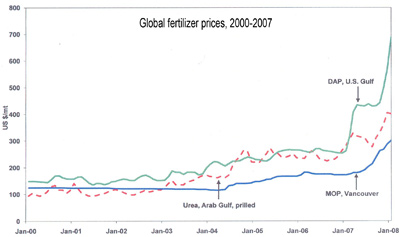 World fertilizer prices surge 200% in 2007, hurting the poor World fertilizer prices surge 200% in 2007 mongabay.com February 20, 2008 The world’s poor lose as fertilizer price rise World fertilizer prices surged by more than 200 percent in 2007, as farmers sought to maximize corn production for ethanol, according to the International Center for […]
World fertilizer prices surge 200% in 2007, hurting the poor World fertilizer prices surge 200% in 2007 mongabay.com February 20, 2008 The world’s poor lose as fertilizer price rise World fertilizer prices surged by more than 200 percent in 2007, as farmers sought to maximize corn production for ethanol, according to the International Center for […]
UN: biofuels are starving the poor by driving up food prices
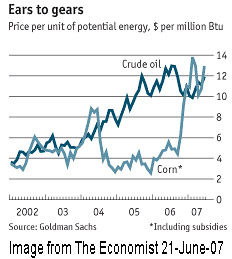 UN: biofuels are starving the poor by driving up food prices UN: biofuels are starving the poor by driving up food prices mongabay.com February 14, 2008 Echoing sentiments increasingly expressed by politicians, scientists, and advocates for the poor, the U.N. Food and Agriculture Organization warned that the world’s poorest people are suffering as a result […]
UN: biofuels are starving the poor by driving up food prices UN: biofuels are starving the poor by driving up food prices mongabay.com February 14, 2008 Echoing sentiments increasingly expressed by politicians, scientists, and advocates for the poor, the U.N. Food and Agriculture Organization warned that the world’s poorest people are suffering as a result […]
Malaysia announces $103B development plan for Borneo island
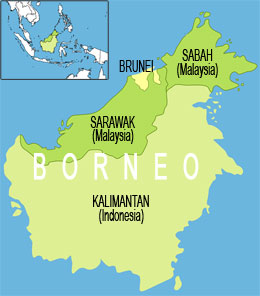 Malaysia announces $103B development plan for Borneo island state Malaysia announces $103B development plan for Borneo island mongabay.com February 13, 2008 Malaysia announced a $103 billion development plan for Sarawak, a state in northern Borneo. The initiative calls for massive investment in heavy industries, including biodiesel production in the form of jatropha and palm oil, […]
Malaysia announces $103B development plan for Borneo island state Malaysia announces $103B development plan for Borneo island mongabay.com February 13, 2008 Malaysia announced a $103 billion development plan for Sarawak, a state in northern Borneo. The initiative calls for massive investment in heavy industries, including biodiesel production in the form of jatropha and palm oil, […]
Bloomberg: global warming “just as lethal” as terrorism
Bloomberg: global warming “just as lethal” as terrorism Bloomberg: global warming “just as lethal” as terrorism mongabay.com February 12, 2008 New York City mayor Michael Bloomberg told reporters Monday that global warming is as big a threat to humanity as terrorism, according to Reuters. “Terrorists kill people, weapons of mass destruction have the potential to […]
Feeds: news | india | latam | brasil | indonesia
 A partnership with foreign investors aims to scale up the East African nation’s production of palm oil, but details on its implementation and possible consequences remain scarce. Plans for a 10,000-hectare oil palm project are underway in Tanzania, backed by a $111 million investment from a local industrialization organization and a foreign investment firm, reported […]
A partnership with foreign investors aims to scale up the East African nation’s production of palm oil, but details on its implementation and possible consequences remain scarce. Plans for a 10,000-hectare oil palm project are underway in Tanzania, backed by a $111 million investment from a local industrialization organization and a foreign investment firm, reported […] Rainforest cleared for oil palm plantations. Photo by: Rhett A. Butler. The European Parliament voted overwhelmingly today on a new cap on biofuels derived from edible crops, which critics say not only compete with feeding a growing global population but also contribute to deforestation and release unacceptably high levels of greenhouse gas emissions. The new […]
Rainforest cleared for oil palm plantations. Photo by: Rhett A. Butler. The European Parliament voted overwhelmingly today on a new cap on biofuels derived from edible crops, which critics say not only compete with feeding a growing global population but also contribute to deforestation and release unacceptably high levels of greenhouse gas emissions. The new […] A cornfield stretches as far as the eye can see. Photo by Rhett A. Butler. Corn and soybean cultivation soared in the late 2000s, as U.S. agribusiness rushed to respond to federal legislation rewarding biofuels production. Debate since the institution of the program has centered on the question of whether biofuel crop expansions have come […]
A cornfield stretches as far as the eye can see. Photo by Rhett A. Butler. Corn and soybean cultivation soared in the late 2000s, as U.S. agribusiness rushed to respond to federal legislation rewarding biofuels production. Debate since the institution of the program has centered on the question of whether biofuel crop expansions have come […] Scientists call for a ‘non-prejudiced’ judgment on nuclear power Nuclear power at times faces antagonism from the environmental community, with opponents arguing that it produces harmful radioactive waste, leads to the proliferation of nuclear arms, and brings forth lethal disasters. Scientists from Australia say it’s time to get past myths about nuclear; they suggest in […]
Scientists call for a ‘non-prejudiced’ judgment on nuclear power Nuclear power at times faces antagonism from the environmental community, with opponents arguing that it produces harmful radioactive waste, leads to the proliferation of nuclear arms, and brings forth lethal disasters. Scientists from Australia say it’s time to get past myths about nuclear; they suggest in […] Less than 10 percent of Ecuadorian Chocó forest remains, many endemic species under threat from development, logging A strip of rainforest running along the northwestern Ecuadorian coast and up through Colombia is one of the most biodiverse places in the world. Yet, less than 10 percent of Ecuador’s portion remains intact, with more forest lost […]
Less than 10 percent of Ecuadorian Chocó forest remains, many endemic species under threat from development, logging A strip of rainforest running along the northwestern Ecuadorian coast and up through Colombia is one of the most biodiverse places in the world. Yet, less than 10 percent of Ecuador’s portion remains intact, with more forest lost […] Biomass burning takes many forms: wildfires, slash-and-burn agriculture, clearing forests and other vegetation, and even industrialized burning for energy production. Yet this burning—mostly manmade but also natural—takes a massive toll both on human health and the environment, according to a new paper in Journal of Geophysical Research: Atmospheres. “We calculate that 5 to 10 percent […]
Biomass burning takes many forms: wildfires, slash-and-burn agriculture, clearing forests and other vegetation, and even industrialized burning for energy production. Yet this burning—mostly manmade but also natural—takes a massive toll both on human health and the environment, according to a new paper in Journal of Geophysical Research: Atmospheres. “We calculate that 5 to 10 percent […] Sugar cane in the tropics. Photo by Rhett A. Butler. If Brazil wants to respect its commitment to reducing greenhouse gas emissions it should target low productivity cattle pasture rather than native cerrado for biofuel crops like sugar cane, argues a new paper published in Nature Climate Change. Brazil already has the world’s largest fleet […]
Sugar cane in the tropics. Photo by Rhett A. Butler. If Brazil wants to respect its commitment to reducing greenhouse gas emissions it should target low productivity cattle pasture rather than native cerrado for biofuel crops like sugar cane, argues a new paper published in Nature Climate Change. Brazil already has the world’s largest fleet […] Trends in commodity certification markets Market share for certified commodities. All figures courtesy of IISD’s report The volume of commodities produced under various social and environmental certification standards jumped 41 percent in 2012, far outpacing the 2 percent growth across conventional commodity markets, finds a comprehensive new assessment of the global certification market. The report […]
Trends in commodity certification markets Market share for certified commodities. All figures courtesy of IISD’s report The volume of commodities produced under various social and environmental certification standards jumped 41 percent in 2012, far outpacing the 2 percent growth across conventional commodity markets, finds a comprehensive new assessment of the global certification market. The report […] The monarch butterfly population overwintering in Mexico this year has hit its lowest numbers ever, according to WWF-Mexico. Monarch butterflies covered just 0.67 hectares in Mexico’s forest, a drop of 44 percent from 2012 already perilously low population. To put this in perspective the average monarch coverage from 1994-2014 was 6.39 or nearly ten times […]
The monarch butterfly population overwintering in Mexico this year has hit its lowest numbers ever, according to WWF-Mexico. Monarch butterflies covered just 0.67 hectares in Mexico’s forest, a drop of 44 percent from 2012 already perilously low population. To put this in perspective the average monarch coverage from 1994-2014 was 6.39 or nearly ten times […] On Thursday, 17 October 2013 Mongabay.com and the Roundtable on Sustainable Palm Oil (RSPO) co-hosted a discussion on environmental issues related to palm oil. The discussion involved representatives from WWF, Greenpeace and the RSPO. Mongabay.com Founder Rhett A. Butler served as the moderator. The following is an approximate transcription of the discussion. The transcription was […]
On Thursday, 17 October 2013 Mongabay.com and the Roundtable on Sustainable Palm Oil (RSPO) co-hosted a discussion on environmental issues related to palm oil. The discussion involved representatives from WWF, Greenpeace and the RSPO. Mongabay.com Founder Rhett A. Butler served as the moderator. The following is an approximate transcription of the discussion. The transcription was […] Deforestation for palm oil production in Borneo. Photo by Rhett A. Butler Palm oil imports into Europe for use as car fuel increased by more than three-fold since 2006, raising concerns than renewable fuels targets may be contributing to deforestation, displacing marginalized communities, and driving greenhouse gas emissions in Southeast Asia, finds a new study […]
Deforestation for palm oil production in Borneo. Photo by Rhett A. Butler Palm oil imports into Europe for use as car fuel increased by more than three-fold since 2006, raising concerns than renewable fuels targets may be contributing to deforestation, displacing marginalized communities, and driving greenhouse gas emissions in Southeast Asia, finds a new study […] Logging in temperate zones may release more greenhouse gases than previously thought by destabilizing carbon stored in forest soils, argues a new paper published in the journal Global Change Biology-Bioenergy. The research involved analysis of carbon released from forest management practices in the northeastern United States. It found that while most models assume carbon stored […]
Logging in temperate zones may release more greenhouse gases than previously thought by destabilizing carbon stored in forest soils, argues a new paper published in the journal Global Change Biology-Bioenergy. The research involved analysis of carbon released from forest management practices in the northeastern United States. It found that while most models assume carbon stored […] In coming weeks Brazil will vote on a bill that would lift a ban on sugar cane mills across a large extent of the Amazon region, sparking fears that ethanol production could drive new deforestation and tarnish the country’s image as an attractive source biofuels for environmentally-conscious markets, reports Reuters. New cane plantations in the […]
In coming weeks Brazil will vote on a bill that would lift a ban on sugar cane mills across a large extent of the Amazon region, sparking fears that ethanol production could drive new deforestation and tarnish the country’s image as an attractive source biofuels for environmentally-conscious markets, reports Reuters. New cane plantations in the […] In order to meet the European Union’s goal of 20% renewables by 2020, some European utility companies are moving away from coal and replacing it with wood pellet fuel. The idea is simple: trees will regrow and recapture the carbon released in the burning of wood pellets, making the process supposedly carbon-neutral. But just like […]
In order to meet the European Union’s goal of 20% renewables by 2020, some European utility companies are moving away from coal and replacing it with wood pellet fuel. The idea is simple: trees will regrow and recapture the carbon released in the burning of wood pellets, making the process supposedly carbon-neutral. But just like […] Intensification of Brazil’s sugarcane industry in response to rising demand for sugar-based ethanol could have impacts on the regional climate reports a new study by researchers from Arizona State University, Stanford University and the Carnegie Institution for Science. Following the conversion of cerrado grasslands into sugarcane in Brazil, a recent study in Geophysical Research Letters […]
Intensification of Brazil’s sugarcane industry in response to rising demand for sugar-based ethanol could have impacts on the regional climate reports a new study by researchers from Arizona State University, Stanford University and the Carnegie Institution for Science. Following the conversion of cerrado grasslands into sugarcane in Brazil, a recent study in Geophysical Research Letters […] Indonesian palm oil companies would support land swaps as a means to reduce carbon emissions from deforestation while simultaneously expanding production, representatives from the country’s largest association of palm oil producers told mongabay.com in an interview last month. GAPKI General Secretary Joko Supriyono and Executive Director Fadhil Hasan said the Indonesian palm oil industry would […]
Indonesian palm oil companies would support land swaps as a means to reduce carbon emissions from deforestation while simultaneously expanding production, representatives from the country’s largest association of palm oil producers told mongabay.com in an interview last month. GAPKI General Secretary Joko Supriyono and Executive Director Fadhil Hasan said the Indonesian palm oil industry would […] Neste Oil, a Finnish energy giant, has announced a new “no deforestation” policy [PDF] for sourcing palm oil. The company, which is one of the world’s largest buyers of palm oil, had faced criticism from environmentalists for purchasing palm oil potentially linked to rainforest and peatland destruction in southeast Asia. Under the new policy, Neste […]
Neste Oil, a Finnish energy giant, has announced a new “no deforestation” policy [PDF] for sourcing palm oil. The company, which is one of the world’s largest buyers of palm oil, had faced criticism from environmentalists for purchasing palm oil potentially linked to rainforest and peatland destruction in southeast Asia. Under the new policy, Neste […] Though Obama has frequently spoken of the need for more “green jobs,” he has failed to acknowledge the inherent environmental advantages associated with a curious plant called hemp. One of the earliest domesticated crops, hemp is incredibly versatile and can be utilized for everything from food, clothing, rope, paper and plastic to even car parts. […]
Though Obama has frequently spoken of the need for more “green jobs,” he has failed to acknowledge the inherent environmental advantages associated with a curious plant called hemp. One of the earliest domesticated crops, hemp is incredibly versatile and can be utilized for everything from food, clothing, rope, paper and plastic to even car parts. […] Researchers have taken a step closer to using atmospheric carbon dioxide as a biofuel, potentially helping mitigate climate change while at the same time meeting rising energy demand, according to a study published in the Proceedings of the National Academy of Sciences. Scientists at the University of Georgia and the North Carolina State University are […]
Researchers have taken a step closer to using atmospheric carbon dioxide as a biofuel, potentially helping mitigate climate change while at the same time meeting rising energy demand, according to a study published in the Proceedings of the National Academy of Sciences. Scientists at the University of Georgia and the North Carolina State University are […] Deforestation in Borneo for palm oil production. British Parliament has approved new government subsidies for biofuel use in U.K. power stations. In a vote held yesterday, Parliament approved a Department of Energy and Climate Change (DECC) proposal to allow the burning of palm oil and wood pellets for power production. Controversially the new measure would […]
Deforestation in Borneo for palm oil production. British Parliament has approved new government subsidies for biofuel use in U.K. power stations. In a vote held yesterday, Parliament approved a Department of Energy and Climate Change (DECC) proposal to allow the burning of palm oil and wood pellets for power production. Controversially the new measure would […] Clearing of elephant habitat at the edge of Yala National Park in Sri Lanka. Photo courtesy of the Environmental Foundation Limited (EFL). A biofuel plantation near Yala National Park has landed Lanka Orex Leasing Company PLC (LOLC) in Sri Lanka’s highest court. Environmentalists say the company is illegally bulldozing Asian elephant habitat, including scrubland and […]
Clearing of elephant habitat at the edge of Yala National Park in Sri Lanka. Photo courtesy of the Environmental Foundation Limited (EFL). A biofuel plantation near Yala National Park has landed Lanka Orex Leasing Company PLC (LOLC) in Sri Lanka’s highest court. Environmentalists say the company is illegally bulldozing Asian elephant habitat, including scrubland and […] Not long ago biofuels were seen as one of the major tools to combat climate change, but a large number of studies in recent years have shown that many first generation biofuels may have little climate benefit—and some are actually harmful—and are also linked to rising food prices. Now, a new study in Nature Climate […]
Not long ago biofuels were seen as one of the major tools to combat climate change, but a large number of studies in recent years have shown that many first generation biofuels may have little climate benefit—and some are actually harmful—and are also linked to rising food prices. Now, a new study in Nature Climate […] Palm fruit. Photo by Rhett Butler. The European Commission has approved palm oil-based biodiesel for the renewable fuels standard provided it is certified under the Roundtable for Sustainable Palm Oil (RSPO), a body that sets social and environmental criteria for palm oil production. The move, which could dramatically boost sales of palm oil in Europe, […]
Palm fruit. Photo by Rhett Butler. The European Commission has approved palm oil-based biodiesel for the renewable fuels standard provided it is certified under the Roundtable for Sustainable Palm Oil (RSPO), a body that sets social and environmental criteria for palm oil production. The move, which could dramatically boost sales of palm oil in Europe, […] Girl in village in Madagascar. One of the world’s poorest countries, it has been estimated that about 70 percent of Malagasy people suffer from malnutrition. Photo by: Rhett A. Butler. In a world where technology has advanced to a point where I can instantly have a face-to-face conversation via online video with a friend in […]
Girl in village in Madagascar. One of the world’s poorest countries, it has been estimated that about 70 percent of Malagasy people suffer from malnutrition. Photo by: Rhett A. Butler. In a world where technology has advanced to a point where I can instantly have a face-to-face conversation via online video with a friend in […] The palm oil industry has been lobbying Europe to allow palm oil-based biofuels to qualify as a low carbon fuel. But environmentalists say substantial amounts of palm oil production occurs at the expense of tropical forests. Here rainforest in Borneo is being cleared and burned for an oil palm plantation. Photo taken in May 2012 […]
The palm oil industry has been lobbying Europe to allow palm oil-based biofuels to qualify as a low carbon fuel. But environmentalists say substantial amounts of palm oil production occurs at the expense of tropical forests. Here rainforest in Borneo is being cleared and burned for an oil palm plantation. Photo taken in May 2012 […] Palm oil facility in Sumatra, Indonesia. The palm oil industry has hired lobbying powerhouse Holland & Knight to help overturn the Environmental Protection Agency’s finding that palm oil-based biodiesel fails to meet greenhouse gas emissions targets under the country’s Renewable Fuels Standard, reports The Hill. “Lobbying disclosure records show that the Malaysian Palm Oil Council, […]
Palm oil facility in Sumatra, Indonesia. The palm oil industry has hired lobbying powerhouse Holland & Knight to help overturn the Environmental Protection Agency’s finding that palm oil-based biodiesel fails to meet greenhouse gas emissions targets under the country’s Renewable Fuels Standard, reports The Hill. “Lobbying disclosure records show that the Malaysian Palm Oil Council, […] Carbon remaining in storage 30 years after land clearance as a fraction of initial above-ground biomass. Courtesy of Earles et al 2012. Click image to enlarge. Carbon emissions from deforestation vary greatly depending on whether timber stocks are turned into finished wood products, converted into bioenergy feedstocks, or burned outright, reports a new study published […]
Carbon remaining in storage 30 years after land clearance as a fraction of initial above-ground biomass. Courtesy of Earles et al 2012. Click image to enlarge. Carbon emissions from deforestation vary greatly depending on whether timber stocks are turned into finished wood products, converted into bioenergy feedstocks, or burned outright, reports a new study published […] Deforestation for oil palm, which is used to produce palm oil, in Sumatra. PHoto by Rhett A. Butler Wilmar International, the world’s largest palm oil processor and trader, has hired a major lobbying firm to overturn the Environmental Protection Agency’s ruling that palm oil-based biodiesel will not meet greenhouse gas emissions standards under America’s Renewable […]
Deforestation for oil palm, which is used to produce palm oil, in Sumatra. PHoto by Rhett A. Butler Wilmar International, the world’s largest palm oil processor and trader, has hired a major lobbying firm to overturn the Environmental Protection Agency’s ruling that palm oil-based biodiesel will not meet greenhouse gas emissions standards under America’s Renewable […] Clearing for soy in the Brazilian Amazon Surging demand for vegetable oil has emerged as an important driver of tropical deforestation over the past two decades and is threatening biodiversity, carbon stocks, and other ecosystem functions in some of the world’s most critical forest areas, warns a report published last week by the Union of […]
Clearing for soy in the Brazilian Amazon Surging demand for vegetable oil has emerged as an important driver of tropical deforestation over the past two decades and is threatening biodiversity, carbon stocks, and other ecosystem functions in some of the world’s most critical forest areas, warns a report published last week by the Union of […] View Larger Map A campaign by NGO Nature Kenya has saved the Dakatcha Woodland Important Bird Area (IBA) from destruction for planting biofuel crops, reports BirdLife International. Located near Kenya’s eastern coastline, the forest is home to two IUCN Red List Endangered species, Clarke’s weaver (Ploceus golandi) and sokoke pipit (Anthus sokokensis), both of which […]
View Larger Map A campaign by NGO Nature Kenya has saved the Dakatcha Woodland Important Bird Area (IBA) from destruction for planting biofuel crops, reports BirdLife International. Located near Kenya’s eastern coastline, the forest is home to two IUCN Red List Endangered species, Clarke’s weaver (Ploceus golandi) and sokoke pipit (Anthus sokokensis), both of which […] Greenhouse gas emissions from palm oil-based biodiesel are the highest among major biofuels when the effects of deforestation and peatlands degradation are considered, according to calculations by the European Commission. The emissions estimates, which haven’t been officially released, have important implications for the biofuels industry in Europe. As reported by EurActiv, the data from the […]
Greenhouse gas emissions from palm oil-based biodiesel are the highest among major biofuels when the effects of deforestation and peatlands degradation are considered, according to calculations by the European Commission. The emissions estimates, which haven’t been officially released, have important implications for the biofuels industry in Europe. As reported by EurActiv, the data from the […] Scientists have devised a new way to produce ethanol directly from seaweed, offering the potential to generate biofuels that don’t compete with terrestrial food production and won’t suck up scarce freshwater, reports a study published today in Science. Researchers from the Bio Architecture Lab in Berkeley, California engineered E. coli bacterium to digest brown seaweed […]
Scientists have devised a new way to produce ethanol directly from seaweed, offering the potential to generate biofuels that don’t compete with terrestrial food production and won’t suck up scarce freshwater, reports a study published today in Science. Researchers from the Bio Architecture Lab in Berkeley, California engineered E. coli bacterium to digest brown seaweed […] Intensive palm oil production is expanding at the expense of biolologically-rich lowland rainforests in the Peruvian Amazon, reports a study published in Environmental Research Letters. The research indicates that enthusiasm for oil palm — one of the world’s most lucrative crops — is taking a toll on forests outside of Southeast Asia, where the vast […]
Intensive palm oil production is expanding at the expense of biolologically-rich lowland rainforests in the Peruvian Amazon, reports a study published in Environmental Research Letters. The research indicates that enthusiasm for oil palm — one of the world’s most lucrative crops — is taking a toll on forests outside of Southeast Asia, where the vast […] More than 40 million hectares of land has been acquired in developing countries for biofuel production in the past decade, reports a new study published by the International Land Coalition. The research looked exclusively at large land acquisitions between 2000 and 2010. These amounted to 200 million hectares of land, of which the authors were […]
More than 40 million hectares of land has been acquired in developing countries for biofuel production in the past decade, reports a new study published by the International Land Coalition. The research looked exclusively at large land acquisitions between 2000 and 2010. These amounted to 200 million hectares of land, of which the authors were […] Draining peatland in Indonesian Borneo. Photo by: Rhett A. Butler. It has long been known that biofuels release greenhouse gas emissions through land conversion like deforestation. But an innovative new study by the Center for International Forestry Research (CIFOR) published in Ecology and Society has computed how long it would take popular biofuel crops to […]
Draining peatland in Indonesian Borneo. Photo by: Rhett A. Butler. It has long been known that biofuels release greenhouse gas emissions through land conversion like deforestation. But an innovative new study by the Center for International Forestry Research (CIFOR) published in Ecology and Society has computed how long it would take popular biofuel crops to […] Biofuels produced from oil palm plantations established on tropical peatlands are a substantial source of greenhouse gas emissions, reports a comprehensive new assessment conducted for the International Council on Clean Transportation (ICCT). The research, based on a literature review and analysis of scientific methods used to derive emissions estimates, concludes that palm oil produced in […]
Biofuels produced from oil palm plantations established on tropical peatlands are a substantial source of greenhouse gas emissions, reports a comprehensive new assessment conducted for the International Council on Clean Transportation (ICCT). The research, based on a literature review and analysis of scientific methods used to derive emissions estimates, concludes that palm oil produced in […] Soy fields meet Amazon rainforest in Brazil. A new study argues that the destruction of rainforests for agriculture must stop. Photo by Rhett A. Butler. At the end of this month the UN predicts global population will hit 7 billion people, having doubled from 3.5 billion in less than 50 years. Yet even as the […]
Soy fields meet Amazon rainforest in Brazil. A new study argues that the destruction of rainforests for agriculture must stop. Photo by Rhett A. Butler. At the end of this month the UN predicts global population will hit 7 billion people, having doubled from 3.5 billion in less than 50 years. Yet even as the […] Europe’s biofuel push could exacerbate climate change unless policies are in place to accounts for emissions from indirect land use change, warns a letter signed by more than 100 scientists and economists. The letter, addressed to the European Commission, says the E.U. is deceiving itself and the public by asserting that biofuels are carbon neutral. […]
Europe’s biofuel push could exacerbate climate change unless policies are in place to accounts for emissions from indirect land use change, warns a letter signed by more than 100 scientists and economists. The letter, addressed to the European Commission, says the E.U. is deceiving itself and the public by asserting that biofuels are carbon neutral. […] To encourage uptake of palm oil that is less damaging to the environment, the European Union (EU) should lift the import duty on palm oil certified under Roundtable on Sustainable Palm Oil (RSPO), said a Dutch industry group. The Dutch Product Board for Margarine, Fats and Oils (MVO), a group that has already committed to […]
To encourage uptake of palm oil that is less damaging to the environment, the European Union (EU) should lift the import duty on palm oil certified under Roundtable on Sustainable Palm Oil (RSPO), said a Dutch industry group. The Dutch Product Board for Margarine, Fats and Oils (MVO), a group that has already committed to […] This article is a longer version of story that appeared at Yale e360: In Brazil, Palm Oil Plantations Could Help Preserve Amazon. For years now, environmentalists have become accustomed to associating palm oil with large-scale destruction of rainforests across Malaysia and Indonesia. Campaigners have linked palm oil-containing products like Girl Scout cookies and soap products […]
This article is a longer version of story that appeared at Yale e360: In Brazil, Palm Oil Plantations Could Help Preserve Amazon. For years now, environmentalists have become accustomed to associating palm oil with large-scale destruction of rainforests across Malaysia and Indonesia. Campaigners have linked palm oil-containing products like Girl Scout cookies and soap products […] By the numbers: UK palm kernel and palm oil use A new study for the U.K. government found that in 2009 Britain imported at least 1.65 million metric tons of palm oil-related products for production of food, fuel, and cosmetics. Notably, the study, which was conducted by Proforest for the Department for Environment, Food and […]
By the numbers: UK palm kernel and palm oil use A new study for the U.K. government found that in 2009 Britain imported at least 1.65 million metric tons of palm oil-related products for production of food, fuel, and cosmetics. Notably, the study, which was conducted by Proforest for the Department for Environment, Food and […] Progress over the past 25 years in recognizing indigenous peoples’ rights to land and resources has been interrupted by a worldwide commodity boom, argues a new report published by the Rights and Resources Initiative (RRI). The report, “Pushback: Local Power, Global Realignment,” says that surging food and energy prices—and associated appreciation of land values—have led […]
Progress over the past 25 years in recognizing indigenous peoples’ rights to land and resources has been interrupted by a worldwide commodity boom, argues a new report published by the Rights and Resources Initiative (RRI). The report, “Pushback: Local Power, Global Realignment,” says that surging food and energy prices—and associated appreciation of land values—have led […] Vale, a Brazilian mining giant, will buy palm oil producer Biopalma da Amazonia SA Reflorestamento Industria & Comercio, reports Bloomberg. The deal, valued at $173.5 million, will enable the mining company to run more of its operations on palm oil biodiesel. Vale began its palm oil push in 2009 when it formed a partnership with […]
Vale, a Brazilian mining giant, will buy palm oil producer Biopalma da Amazonia SA Reflorestamento Industria & Comercio, reports Bloomberg. The deal, valued at $173.5 million, will enable the mining company to run more of its operations on palm oil biodiesel. Vale began its palm oil push in 2009 when it formed a partnership with […] Program pembayaran karbon hutan seperti mekanisme pengurangan emisi dari penggundulan hutan dan degradasi (REDD) yang diajukan dapat memberikan tekanan pada teknik pertanian “ramah-alam liar” dengan meningkatkan kebutuhan untuk mengintensifkan produksi pertanian, sebuah makalah yang diterbitkan bulan Juni dalam Conservation Biology memperingatkan. Makalah tersebut, ditulis oleh Jaboury Ghazoul dan Lian Pin Koh of ETH Zurich dan […]
Program pembayaran karbon hutan seperti mekanisme pengurangan emisi dari penggundulan hutan dan degradasi (REDD) yang diajukan dapat memberikan tekanan pada teknik pertanian “ramah-alam liar” dengan meningkatkan kebutuhan untuk mengintensifkan produksi pertanian, sebuah makalah yang diterbitkan bulan Juni dalam Conservation Biology memperingatkan. Makalah tersebut, ditulis oleh Jaboury Ghazoul dan Lian Pin Koh of ETH Zurich dan […] Forest carbon payment programs like the proposed reducing emissions from deforestation and degradation (REDD) mechanism could put pressure on “wildlife-friendly” farming techniques by increasing the need to intensify agricultural production, warns a paper published this June in Conservation Biology. The paper, written by Jaboury Ghazoul and Lian Pin Koh of ETH Zurich and myself in […]
Forest carbon payment programs like the proposed reducing emissions from deforestation and degradation (REDD) mechanism could put pressure on “wildlife-friendly” farming techniques by increasing the need to intensify agricultural production, warns a paper published this June in Conservation Biology. The paper, written by Jaboury Ghazoul and Lian Pin Koh of ETH Zurich and myself in […] The European Union’s renewable fuels target is driving land grabs in Africa that threaten the environment and local communities, claims a new report from Friends of the Earth (FOE). Africa: up for grabs – The scale and impact of land grabbing for agrofuels [PDF] reviews a series of land deals signed across more than a […]
The European Union’s renewable fuels target is driving land grabs in Africa that threaten the environment and local communities, claims a new report from Friends of the Earth (FOE). Africa: up for grabs – The scale and impact of land grabbing for agrofuels [PDF] reviews a series of land deals signed across more than a […] Pengiriman pertama minyak kelapa yang tersertifikasi di bawah kriteria kebersinambungan telah tiba di Amerika Serikat, menurut Roundtable on Sustainable Palm Oil (RSPO). AAK, pabrik minyak dan lemak sayur berbasis di Malmo, Swedia, mengumumkan tibanya pengiriman pertama dari minyak kelapa tersertifikasi RSPO yang terpisah di tempat pengilangannya di Port Newark, New Jersey. Minyak kelapa tersertifikasi RSPO […]
Pengiriman pertama minyak kelapa yang tersertifikasi di bawah kriteria kebersinambungan telah tiba di Amerika Serikat, menurut Roundtable on Sustainable Palm Oil (RSPO). AAK, pabrik minyak dan lemak sayur berbasis di Malmo, Swedia, mengumumkan tibanya pengiriman pertama dari minyak kelapa tersertifikasi RSPO yang terpisah di tempat pengilangannya di Port Newark, New Jersey. Minyak kelapa tersertifikasi RSPO […] The first shipment of palm oil certified under sustainability criteria have arrived in the United States, according to the Roundtable on Sustainable Palm Oil (RSPO). AAK, a vegetable oils and fats manufacturer based in Malmo, Sweden, announced the arrival of the first shipment of segregated RSPO-certified palm oil to its refinery in Port Newark, New […]
The first shipment of palm oil certified under sustainability criteria have arrived in the United States, according to the Roundtable on Sustainable Palm Oil (RSPO). AAK, a vegetable oils and fats manufacturer based in Malmo, Sweden, announced the arrival of the first shipment of segregated RSPO-certified palm oil to its refinery in Port Newark, New […] Not surprisingly, a US report released last week which argued that saving forests abroad will help US agricultural producers by reducing international competition has raised hackles in tropical forest counties. The report, commissioned by Avoided Deforestation Partners, a US group pushing for including tropical forest conservation in US climate policy, and the National Farmers Union, […]
Not surprisingly, a US report released last week which argued that saving forests abroad will help US agricultural producers by reducing international competition has raised hackles in tropical forest counties. The report, commissioned by Avoided Deforestation Partners, a US group pushing for including tropical forest conservation in US climate policy, and the National Farmers Union, […] UE kini bergerak untuk membuat standar lingkungan untuk biofuel yang digunakan di Eropa, mensyaratkan biofuel untuk memberikan “pengurangan substansial” pada emisi gas rumah kaca dan tidak menghasilkan perubahan fungsi hutan atau lahan basah, menurut pernyataan dari Komisi Eropa. Rencana ini meminta industri, pemerintah, dan LSM untuk menyiapkan “skema sukarela” yang memberikan sertifikasi bahwa biofuel yang […]
UE kini bergerak untuk membuat standar lingkungan untuk biofuel yang digunakan di Eropa, mensyaratkan biofuel untuk memberikan “pengurangan substansial” pada emisi gas rumah kaca dan tidak menghasilkan perubahan fungsi hutan atau lahan basah, menurut pernyataan dari Komisi Eropa. Rencana ini meminta industri, pemerintah, dan LSM untuk menyiapkan “skema sukarela” yang memberikan sertifikasi bahwa biofuel yang […] Dengan seluruh perhatian dunia sedang mengarah pada bencana lingkungan di Teluk Meksiko, banyak yang mulai merenungkan kebenaran dari tidak hanya Amerika, tapi ketergantungan dunia akan bahan bakar fossil. Meski begitu proyek-proyek pengadaan energi berbahan bakar fosil skala besar terus berjalan maju, termasuk di kota Sabah, Malaysia di Borneo yang akan membangun 300 MW pembangkit listrik […]
Dengan seluruh perhatian dunia sedang mengarah pada bencana lingkungan di Teluk Meksiko, banyak yang mulai merenungkan kebenaran dari tidak hanya Amerika, tapi ketergantungan dunia akan bahan bakar fossil. Meski begitu proyek-proyek pengadaan energi berbahan bakar fosil skala besar terus berjalan maju, termasuk di kota Sabah, Malaysia di Borneo yang akan membangun 300 MW pembangkit listrik […] The E.U. today moved to establish environmental standards for biofuels used in Europe, requiring biofuels to deliver “substantial reductions” in greenhouse gas emissions and not result in conversion of forests or wetlands, according to a statement from the European Commission. The plan calls for industry, governments and NGOs to set up “voluntary schemes” which certify […]
The E.U. today moved to establish environmental standards for biofuels used in Europe, requiring biofuels to deliver “substantial reductions” in greenhouse gas emissions and not result in conversion of forests or wetlands, according to a statement from the European Commission. The plan calls for industry, governments and NGOs to set up “voluntary schemes” which certify […] Usaha minyak kelapa “yang berkesinambungan” dapat menekan Malaysia dan Indonesia dalam prestasi di area lingkungan hidup dari minyak sayur yang banyak digunakan. Presiden Brazil Lula da Silva, hari Kamis menjelaskan rencana untuk memperluas produksi minyak kelapa di Amazon sambil meminimalkan resiko di hutan hutan terbesar di dunia, lapor Globo dan Terra Brasil. Rencana ini, disebut […]
Usaha minyak kelapa “yang berkesinambungan” dapat menekan Malaysia dan Indonesia dalam prestasi di area lingkungan hidup dari minyak sayur yang banyak digunakan. Presiden Brazil Lula da Silva, hari Kamis menjelaskan rencana untuk memperluas produksi minyak kelapa di Amazon sambil meminimalkan resiko di hutan hutan terbesar di dunia, lapor Globo dan Terra Brasil. Rencana ini, disebut […] India mengalahkan Cina sebagai pembeli minyak kelapa terbesar di dunia pada tahun 2009, tulis Bloomberg. Berdasarkan angka-angka dari Solvent Extractors’ Association di India, kelompok prosesor berbasis di Mumbai, India mengimpor 7 juta metrik ton minyak kelapa pada tahun 2009. Cina mengimpor 6,4 juta ton tahun lalu. B.V Mehta, direktur eksekutif dari asosiasi, mengatakan bahwa kenaikan […]
India mengalahkan Cina sebagai pembeli minyak kelapa terbesar di dunia pada tahun 2009, tulis Bloomberg. Berdasarkan angka-angka dari Solvent Extractors’ Association di India, kelompok prosesor berbasis di Mumbai, India mengimpor 7 juta metrik ton minyak kelapa pada tahun 2009. Cina mengimpor 6,4 juta ton tahun lalu. B.V Mehta, direktur eksekutif dari asosiasi, mengatakan bahwa kenaikan […] With the world’s eyes on the environmental catastrophe in the Gulf of Mexico, many are beginning to ponder the rightness of not just America’s, but the world’s dependence on fossil fuels. Yet large-scale fossil-fuel energy projects continue to march ahead, including one in the Malaysian state of Sabah on Borneo to build a 300 MW […]
With the world’s eyes on the environmental catastrophe in the Gulf of Mexico, many are beginning to ponder the rightness of not just America’s, but the world’s dependence on fossil fuels. Yet large-scale fossil-fuel energy projects continue to march ahead, including one in the Malaysian state of Sabah on Borneo to build a 300 MW […] “Sustainable” palm oil effort may pressure Malaysia and Indonesia on environmental performance of widely used vegetable oil. Brazilian President Lula da Silva on Thursday laid out plans to expand palm oil production in the Amazon while minimizing risk to Earth’s largest rainforest, reports Globo and Terra Brasil. The plan, called the Program for Sustainable Production […]
“Sustainable” palm oil effort may pressure Malaysia and Indonesia on environmental performance of widely used vegetable oil. Brazilian President Lula da Silva on Thursday laid out plans to expand palm oil production in the Amazon while minimizing risk to Earth’s largest rainforest, reports Globo and Terra Brasil. The plan, called the Program for Sustainable Production […] Last week Nestle, the world’s largest food processor, was caught in a firestorm when it attempted to censor a Greenpeace campaign that targeted its use of palm oil sourced from a supplier accused of environmentally-damaging practices. The incident brought the increasingly raucous debate over palm oil into the spotlight and renewed questions over an industry-backed […]
Last week Nestle, the world’s largest food processor, was caught in a firestorm when it attempted to censor a Greenpeace campaign that targeted its use of palm oil sourced from a supplier accused of environmentally-damaging practices. The incident brought the increasingly raucous debate over palm oil into the spotlight and renewed questions over an industry-backed […] Pengembang minyak kelapa di bagian Indonesia dari Papua Nugini menandatangani perjanjian yang meragukan yang mengeksploitasi masyarakat lokal dan menempatkan ekosistem hutan yang cukup penting beresiko, menurut sebuah laporan baru dari Environmental Investigation Agency (EIA) dan Telapak. Laporan tersebut, “Up for Grabs”, memperingatkan bahwa lima juta hektar dari lahan Papua dan Papua Barat sedang menjadi target […]
Pengembang minyak kelapa di bagian Indonesia dari Papua Nugini menandatangani perjanjian yang meragukan yang mengeksploitasi masyarakat lokal dan menempatkan ekosistem hutan yang cukup penting beresiko, menurut sebuah laporan baru dari Environmental Investigation Agency (EIA) dan Telapak. Laporan tersebut, “Up for Grabs”, memperingatkan bahwa lima juta hektar dari lahan Papua dan Papua Barat sedang menjadi target […] Indonesia will not allow the conversion of natural forest for oil palm plantations, claimed the country’s Forestry Minister Zulkifli Hasan in comments reported by the Jakarta Post. Speaking at a hearing on forestry and agriculture, Hasan said he has no plan to draft a decree to incorporate plantations in the forestry sector. “There won’t be […]
Indonesia will not allow the conversion of natural forest for oil palm plantations, claimed the country’s Forestry Minister Zulkifli Hasan in comments reported by the Jakarta Post. Speaking at a hearing on forestry and agriculture, Hasan said he has no plan to draft a decree to incorporate plantations in the forestry sector. “There won’t be […] The European Union’s biofuel targets could starve up to 100 million people, warns a report from an anti-poverty charity. ActionAid estimates the E.U.’s plan to source 10 percent of transport fuels from biofuels would increase competition for agricultural lands, spurring a sharp rise in food prices. Dearer food would disproportionally affect the world’s poorest people. […]
The European Union’s biofuel targets could starve up to 100 million people, warns a report from an anti-poverty charity. ActionAid estimates the E.U.’s plan to source 10 percent of transport fuels from biofuels would increase competition for agricultural lands, spurring a sharp rise in food prices. Dearer food would disproportionally affect the world’s poorest people. […] Business-as-usual agricultural expansion to meet biofuel production targets for 2020 will take a heavy toll on Brazil’s Amazon rainforest in coming years, undermining the potential emissions savings of transitioning from fossil fuels to biofuels, warns a new paper published in the Proceedings of the National Academy of Sciences (PNAS). The research suggests that intensification of […]
Business-as-usual agricultural expansion to meet biofuel production targets for 2020 will take a heavy toll on Brazil’s Amazon rainforest in coming years, undermining the potential emissions savings of transitioning from fossil fuels to biofuels, warns a new paper published in the Proceedings of the National Academy of Sciences (PNAS). The research suggests that intensification of […] The European Union may be planning to classify oil palm plantations as forests, raising fears among environmental groups of expanded conversion of tropical rainforests for biofuel production, reports the EUobserver, which cites a leaked document from the European Commission. The draft document [PDF] shows that policymakers are considering language that would specifically allow use of […]
The European Union may be planning to classify oil palm plantations as forests, raising fears among environmental groups of expanded conversion of tropical rainforests for biofuel production, reports the EUobserver, which cites a leaked document from the European Commission. The draft document [PDF] shows that policymakers are considering language that would specifically allow use of […] Only 4 percent of biofuel imported for use in the UK — and 20 percent of biofuel used overall — meets the environmental sustainability standard set by the Renewable Transport Fuel Obligation (RFTO), reports a new assessment from the Renewable Fuels Agency. The report found Britain exceeded its overall biofuel target of 2.5 percent of […]
Only 4 percent of biofuel imported for use in the UK — and 20 percent of biofuel used overall — meets the environmental sustainability standard set by the Renewable Transport Fuel Obligation (RFTO), reports a new assessment from the Renewable Fuels Agency. The report found Britain exceeded its overall biofuel target of 2.5 percent of […] A company in Uganda is pressuring the environment ministry to allow it to log a protected forest reserve to establish a palm oil plantation, reports The New Vision. BIDCO, a Kenyan company, has been lobbying since 2006 to log the forest reserve on Bugala island in Lake Victoria, but has face stiff resistance due to […]
A company in Uganda is pressuring the environment ministry to allow it to log a protected forest reserve to establish a palm oil plantation, reports The New Vision. BIDCO, a Kenyan company, has been lobbying since 2006 to log the forest reserve on Bugala island in Lake Victoria, but has face stiff resistance due to […] India surpassed China as the world’s largest buyer of palm oil in 2009, reports Bloomberg. According to figures from the Solvent Extractors’ Association of India, a processor group based in Mumbai, India imported 7 million metric tons of palm oil in 2009. China imported 6.4 million tons last year. B.V. Mehta, executive director of the […]
India surpassed China as the world’s largest buyer of palm oil in 2009, reports Bloomberg. According to figures from the Solvent Extractors’ Association of India, a processor group based in Mumbai, India imported 7 million metric tons of palm oil in 2009. China imported 6.4 million tons last year. B.V. Mehta, executive director of the […] A version of this article appeared today in the Jakarta Post Palm oil is one of the world’s most traded and versatile agricultural commodities. It can be used as edible vegetable oil, industrial lubricant, raw material in cosmetic and skincare products and feedstock for biofuel production. Growing global demand for palm oil and the ensuing […]
A version of this article appeared today in the Jakarta Post Palm oil is one of the world’s most traded and versatile agricultural commodities. It can be used as edible vegetable oil, industrial lubricant, raw material in cosmetic and skincare products and feedstock for biofuel production. Growing global demand for palm oil and the ensuing […] Efforts to slow climate change are putting indigenous people at risk, warns a new report published by Survival International, an indigenous rights’ group. The report, ‘The most inconvenient truth of all: climate change and indigenous people,’ argues that lack of recognition of indigenous land use leaves them vulnerable to displacement and environmental harm by projects […]
Efforts to slow climate change are putting indigenous people at risk, warns a new report published by Survival International, an indigenous rights’ group. The report, ‘The most inconvenient truth of all: climate change and indigenous people,’ argues that lack of recognition of indigenous land use leaves them vulnerable to displacement and environmental harm by projects […] Oil palm developers in the Indonesian half of New Guinea are signing questionable deals that exploit local communities and put important forest ecosystems at risk, alleges a new report from Environmental Investigation Agency (EIA) and Telapak. The report, “Up for Grabs”, warns that five million hectares of land in Papua and West Papua are being […]
Oil palm developers in the Indonesian half of New Guinea are signing questionable deals that exploit local communities and put important forest ecosystems at risk, alleges a new report from Environmental Investigation Agency (EIA) and Telapak. The report, “Up for Grabs”, warns that five million hectares of land in Papua and West Papua are being […] Most European consumers of palm oil are failing to buy eco-certified palm oil, undermining efforts to encourage producers to reduce their impact on the environment, reports WWF. Analyzing 59 major corporate users of palm oil in Europe, WWF found that only 10 companies are “showing real progress on their commitments to buy and use sustainable […]
Most European consumers of palm oil are failing to buy eco-certified palm oil, undermining efforts to encourage producers to reduce their impact on the environment, reports WWF. Analyzing 59 major corporate users of palm oil in Europe, WWF found that only 10 companies are “showing real progress on their commitments to buy and use sustainable […] Carbon accounting used in the Kyoto Protocol and other climate legislation currently neglects CO2 emissions from the production of biofuels, a loophole that could drive large-scale destruction of tropical forests and exacerbate global warming, warned researchers writing last week in the journal Science. Jerry Melillo and a dozen co-authors noted that the Kyoto Protocol, the […]
Carbon accounting used in the Kyoto Protocol and other climate legislation currently neglects CO2 emissions from the production of biofuels, a loophole that could drive large-scale destruction of tropical forests and exacerbate global warming, warned researchers writing last week in the journal Science. Jerry Melillo and a dozen co-authors noted that the Kyoto Protocol, the […] An interview about orangutan conservation and the complexities of palm oil with Panut Hadisiswoyo and David Dellatore of the Orangutan Information Center and Helen Buckland of the Sumatran Orangutan Society. Of the world’s two species of orangutan, a great ape that shares 96 percent of man’s genetic makeup, the Sumatran orangutan is considerably more endangered […]
An interview about orangutan conservation and the complexities of palm oil with Panut Hadisiswoyo and David Dellatore of the Orangutan Information Center and Helen Buckland of the Sumatran Orangutan Society. Of the world’s two species of orangutan, a great ape that shares 96 percent of man’s genetic makeup, the Sumatran orangutan is considerably more endangered […] Fourth in a series of interviews with participants at the 2009 Association of Tropical Biology and Conservation (ATBC) conference. The Atlantic Forest may very well be the most imperiled tropical ecosystem in the world: it is estimated that seven percent (or less) of the original forest remains. Lining the coast of Brazil, what is left […]
Fourth in a series of interviews with participants at the 2009 Association of Tropical Biology and Conservation (ATBC) conference. The Atlantic Forest may very well be the most imperiled tropical ecosystem in the world: it is estimated that seven percent (or less) of the original forest remains. Lining the coast of Brazil, what is left […] Indonesian authorities are failing to prevent illegal logging and conversion of protected areas for oil palm cultivation used to supply the European market with supposedly “green” biofuels, alleges a new report from Milieudefensie (Friends of the Earth Netherlands) and WALHI KalBar (Friends of the Earth Indonesia, West Kalimantan). The report, “Failing governance – Avoiding responsibilities” […]
Indonesian authorities are failing to prevent illegal logging and conversion of protected areas for oil palm cultivation used to supply the European market with supposedly “green” biofuels, alleges a new report from Milieudefensie (Friends of the Earth Netherlands) and WALHI KalBar (Friends of the Earth Indonesia, West Kalimantan). The report, “Failing governance – Avoiding responsibilities” […] During the fiscal years of 2002-2008 the United States handed out subsidies to fossil fuel industries to a tune of 72 billion dollars, while renewable energy subsidies, during the same period, reached 29 billion dollars. Conducted by the Environmental Law Institute (ELI) in partnership with the Woodrow Wilson International Center for Scholars, the research shows […]
During the fiscal years of 2002-2008 the United States handed out subsidies to fossil fuel industries to a tune of 72 billion dollars, while renewable energy subsidies, during the same period, reached 29 billion dollars. Conducted by the Environmental Law Institute (ELI) in partnership with the Woodrow Wilson International Center for Scholars, the research shows […] Brazil will restrict sugarcane plantations for ethanol production from the Amazon, the Pantanal, and other ecologically-sensitive areas under a plan announced Thursday by President Luiz Inacio Lula da Silva’s administration, reports the Associated Press. Environment Minister Carlos Minc said the proposal, which will be voted on by Congress next year, would limit sugar growing to […]
Brazil will restrict sugarcane plantations for ethanol production from the Amazon, the Pantanal, and other ecologically-sensitive areas under a plan announced Thursday by President Luiz Inacio Lula da Silva’s administration, reports the Associated Press. Environment Minister Carlos Minc said the proposal, which will be voted on by Congress next year, would limit sugar growing to […] Britain’s Advertising Standards Authority (ASA), a group that regulates advertisements, has again banned a “misleading” ad by the palm oil industry, reports the Guardian. ASA ruled that a campaign run by the Malaysian Palm Oil Council (MPOC) makes dubious claims, including that palm oil is the “only product able to sustainably and efficiently meet a […]
Britain’s Advertising Standards Authority (ASA), a group that regulates advertisements, has again banned a “misleading” ad by the palm oil industry, reports the Guardian. ASA ruled that a campaign run by the Malaysian Palm Oil Council (MPOC) makes dubious claims, including that palm oil is the “only product able to sustainably and efficiently meet a […] As the world’s biggest cattle producer, Brazil braces for change While you’re browsing the mall for running shoes, the Amazon rainforest is probably the farthest thing from your mind. Perhaps it shouldn’t be. The globalization of commodity supply chains has created links between consumer products and distant ecosystems like the Amazon. Shoes sold in downtown […]
As the world’s biggest cattle producer, Brazil braces for change While you’re browsing the mall for running shoes, the Amazon rainforest is probably the farthest thing from your mind. Perhaps it shouldn’t be. The globalization of commodity supply chains has created links between consumer products and distant ecosystems like the Amazon. Shoes sold in downtown […]
 British motorists are unwittingly big consumers of palm oil produced on rainforest lands in southeast Asia, reports The Times. A dozen oil companies provided 123 million liters of palm oil to gas stations around Britain in the year ended April 2009, according to government figures obtained by The Times. 64 million liters came from from […]
British motorists are unwittingly big consumers of palm oil produced on rainforest lands in southeast Asia, reports The Times. A dozen oil companies provided 123 million liters of palm oil to gas stations around Britain in the year ended April 2009, according to government figures obtained by The Times. 64 million liters came from from […] In a Perspectives piece in Science, John R. Regalbuto argues that the world will soon see a revolution in biofuels, but not those made from corn. Instead Regalbuto, program director of Catalysis and Biocatalysis at the National Science Foundation, says that the future of biofuels is in substances that can be converted into liquid hydrocarbons, […]
In a Perspectives piece in Science, John R. Regalbuto argues that the world will soon see a revolution in biofuels, but not those made from corn. Instead Regalbuto, program director of Catalysis and Biocatalysis at the National Science Foundation, says that the future of biofuels is in substances that can be converted into liquid hydrocarbons, […] LUSH Cosmetics, a leading cosmetics-maker, will no longer use palm oil due to environmental concerns over its production. LUSH, which is now selling a palm oil-free soap, has launched a two-pronged campaign to make consumers aware of the impacts of palm cultivation on tropical forests and encourage other consumer-products companies, including Procter & Gamble, Unilever […]
LUSH Cosmetics, a leading cosmetics-maker, will no longer use palm oil due to environmental concerns over its production. LUSH, which is now selling a palm oil-free soap, has launched a two-pronged campaign to make consumers aware of the impacts of palm cultivation on tropical forests and encourage other consumer-products companies, including Procter & Gamble, Unilever […] A new study finds oil palm plantations store less carbon than previously believed, suggesting that palm oil produced through the conversion of tropical forests carries a substantial carbon debt. The study, conducted at two sites in Sumatra and Kalimantan by scientists at the World Agroforestry Centre (ICRAF), found that mature oil palm plantations store less […]
A new study finds oil palm plantations store less carbon than previously believed, suggesting that palm oil produced through the conversion of tropical forests carries a substantial carbon debt. The study, conducted at two sites in Sumatra and Kalimantan by scientists at the World Agroforestry Centre (ICRAF), found that mature oil palm plantations store less […] Sustainable biofuels can be a reality but only in combination with reductions in fuel demand and increased productivity on existing agricultural lands, argue researchers writing in the journal Science. Five years ago biofuels were seen as a panacea for the world’s energy hunger and the need to address climate change, but increased production of biofuels […]
Sustainable biofuels can be a reality but only in combination with reductions in fuel demand and increased productivity on existing agricultural lands, argue researchers writing in the journal Science. Five years ago biofuels were seen as a panacea for the world’s energy hunger and the need to address climate change, but increased production of biofuels […] Meeting food and energy demands in a world where human population is expected to reach 9 billion by mid-century will require a range of approaches that increase the sustainability of agricultural production, reports a new assessment from Deutsche Bank’s Climate Change Advisors (DBCCA). The report, titled “Investing in Agriculture: Far-Reaching Challenge, Significant Opportunity: An Asset […]
Meeting food and energy demands in a world where human population is expected to reach 9 billion by mid-century will require a range of approaches that increase the sustainability of agricultural production, reports a new assessment from Deutsche Bank’s Climate Change Advisors (DBCCA). The report, titled “Investing in Agriculture: Far-Reaching Challenge, Significant Opportunity: An Asset […] Vale, the world’s largest miner of iron ore, has signed a $500 million joint venture with Biopalma da Amazonia to produce 160,000 metric tons of palm oil-based biodiesel per year, reports Reuters. Vale says the deal will save $150 million in fuel costs starting in 2014, with palm oil biodiesel replacing up to 20 percent […]
Vale, the world’s largest miner of iron ore, has signed a $500 million joint venture with Biopalma da Amazonia to produce 160,000 metric tons of palm oil-based biodiesel per year, reports Reuters. Vale says the deal will save $150 million in fuel costs starting in 2014, with palm oil biodiesel replacing up to 20 percent […] Yesterday the Obama Administration established a Biofuels Interagency Working Group to oversee implementation of new rules and research regarding biofuels. On the group’s first day they would do well to look at a new study in Science Magazine comparing the efficacy of ethanol versus bioelectricity. Researchers compared ethanol and bioelectricity in terms of miles per […]
Yesterday the Obama Administration established a Biofuels Interagency Working Group to oversee implementation of new rules and research regarding biofuels. On the group’s first day they would do well to look at a new study in Science Magazine comparing the efficacy of ethanol versus bioelectricity. Researchers compared ethanol and bioelectricity in terms of miles per […] Sime Darby, a Malaysian palm oil producer, will invest $800 million in palm oil and rubber plantations in Liberia, reports Reuters. The deal will cover 200,000 hectares (500,000 acres) in the West African country. 80 percent of the investment would go towards development of Liberia’s palm oil industry, while the balance would be used to […]
Sime Darby, a Malaysian palm oil producer, will invest $800 million in palm oil and rubber plantations in Liberia, reports Reuters. The deal will cover 200,000 hectares (500,000 acres) in the West African country. 80 percent of the investment would go towards development of Liberia’s palm oil industry, while the balance would be used to […]
 More than half of cropland expansion between 1980 and 2000 occurred at the expense of natural forests, while another 30 percent of occurred in disturbed forests, reported a Stanford University researcher presenting Saturday at the annual meeting of the American Association for the Advancement of Science (AAAS) in Chicago. Holly Gibbs, formerly of the University […]
More than half of cropland expansion between 1980 and 2000 occurred at the expense of natural forests, while another 30 percent of occurred in disturbed forests, reported a Stanford University researcher presenting Saturday at the annual meeting of the American Association for the Advancement of Science (AAAS) in Chicago. Holly Gibbs, formerly of the University […] Prairie grass ethanol will kill fewer people and foul the environment less than corn ethanol
Prairie grass ethanol will kill fewer people and foul the environment less than corn ethanol The growing concerns about climate change have brought biochar, a charcoal produced from biomass combustion, into limelight.
The growing concerns about climate change have brought biochar, a charcoal produced from biomass combustion, into limelight. Finland, Sweden push for loophole that would drive destruction of peatlands around the world Finland, Sweden push for loophole that would drive destruction of peatlands around the world mongabay.com December 9, 2008
Finland, Sweden push for loophole that would drive destruction of peatlands around the world Finland, Sweden push for loophole that would drive destruction of peatlands around the world mongabay.com December 9, 2008 Degraded grasslands best for palm oil biofuel production, finds study Degraded grasslands better option for palm oil production relative to rainforests, finds study Rhett A. Butler, mongabay.com December 3, 2008
Degraded grasslands best for palm oil biofuel production, finds study Degraded grasslands better option for palm oil production relative to rainforests, finds study Rhett A. Butler, mongabay.com December 3, 2008 Fall in palm oil price may lead to industry consolidation Fall in palm oil price may lead to industry consolidation Rhett A. Butler, mongabay.com December 2, 2008
Fall in palm oil price may lead to industry consolidation Fall in palm oil price may lead to industry consolidation Rhett A. Butler, mongabay.com December 2, 2008 Scientists should not compare biodiversity of rainforests with oil palm plantations says palm oil council chief Biodiversity of rainforests should not be compared with oil palm plantations says palm oil council chief mongabay.com November 11, 2008 Dr. Yusof Basiron, the controversial CEO of the Malaysian Palm Oil Council (MPOC), blogs about the sustainability of palm […]
Scientists should not compare biodiversity of rainforests with oil palm plantations says palm oil council chief Biodiversity of rainforests should not be compared with oil palm plantations says palm oil council chief mongabay.com November 11, 2008 Dr. Yusof Basiron, the controversial CEO of the Malaysian Palm Oil Council (MPOC), blogs about the sustainability of palm […] First RSPO-certified (“eco-friendly”) palm oil shipment to arrive in Europe First RSPO-certified (“eco-friendly”) palm oil shipment to arrive in Europe mongabay.com November 10, 2008
First RSPO-certified (“eco-friendly”) palm oil shipment to arrive in Europe First RSPO-certified (“eco-friendly”) palm oil shipment to arrive in Europe mongabay.com November 10, 2008 EU’s sustainable biofuels push angers Malaysia, Brazil EU’s sustainable biofuels push angers Malaysia, Brazil mongabay.com November 7, 2008
EU’s sustainable biofuels push angers Malaysia, Brazil EU’s sustainable biofuels push angers Malaysia, Brazil mongabay.com November 7, 2008 Air travel may be powered by biofuels in 3-5 years Air travel may be powered by biofuels in 3-5 years mongabay.com October 27, 2008 Boeing says biofuel-powered planes are only three-to-five years away from being a reality, reports The Guardian. “The certification will happen much sooner than anybody thought,” Darrin Morgan, Boeing’s director of environmental […]
Air travel may be powered by biofuels in 3-5 years Air travel may be powered by biofuels in 3-5 years mongabay.com October 27, 2008 Boeing says biofuel-powered planes are only three-to-five years away from being a reality, reports The Guardian. “The certification will happen much sooner than anybody thought,” Darrin Morgan, Boeing’s director of environmental […] Cellulosic biofuels endanger old-growth forests in the southern U.S. An interview with Scot Quandra of the Dogwood Alliance:Cellulosic biofuels endanger old-growth forests in the southern U.S. Jeremy Hance, mongabay.com October 16, 2008
Cellulosic biofuels endanger old-growth forests in the southern U.S. An interview with Scot Quandra of the Dogwood Alliance:Cellulosic biofuels endanger old-growth forests in the southern U.S. Jeremy Hance, mongabay.com October 16, 2008 Palm oil industry relies on greenwashing to mislead consumers, alleges report Palm oil industry relies on greenwashing to mislead consumers, alleges report mongabay.com October 8, 2008
Palm oil industry relies on greenwashing to mislead consumers, alleges report Palm oil industry relies on greenwashing to mislead consumers, alleges report mongabay.com October 8, 2008 U.S. needs environmental standards for biofuels U.S. needs environmental standards for biofuels mongabay.com October 2, 2008
U.S. needs environmental standards for biofuels U.S. needs environmental standards for biofuels mongabay.com October 2, 2008 11 species of monkeys discovered in West African biodiversity hotspot 11 species of monkeys discovered in West African biodiversity hotspot mongabay.com September 15, 2008 Urgent conservation measures are needed to protect some of the world's most endangered primates from the hunting, logging, and oil palm development in a region that has only recently emerged from […]
11 species of monkeys discovered in West African biodiversity hotspot 11 species of monkeys discovered in West African biodiversity hotspot mongabay.com September 15, 2008 Urgent conservation measures are needed to protect some of the world's most endangered primates from the hunting, logging, and oil palm development in a region that has only recently emerged from […] Threatened forest in Kenya home to a diversity of bird life Threatened forest in Kenya home to a diversity of bird life mongabay.com September 15, 2008 The Tana River forest in coastal Kenya is home to a diverse array of bird species but is increasingly under threat from logging, agricultural expansion, and unsustainable harvesting of […]
Threatened forest in Kenya home to a diversity of bird life Threatened forest in Kenya home to a diversity of bird life mongabay.com September 15, 2008 The Tana River forest in coastal Kenya is home to a diverse array of bird species but is increasingly under threat from logging, agricultural expansion, and unsustainable harvesting of […] Malaysian palm oil industry accused of child slavery by Indonesia Malaysian palm oil industry accused of child slavery by Indonesia mongabay.com September 17, 2008 Indonesia’s Commission for Child Protection has accused Malaysia’s oil palm planters of enslaving migrant workers and their children at plantations in the state of Sabah on the island of Borneo, reports […]
Malaysian palm oil industry accused of child slavery by Indonesia Malaysian palm oil industry accused of child slavery by Indonesia mongabay.com September 17, 2008 Indonesia’s Commission for Child Protection has accused Malaysia’s oil palm planters of enslaving migrant workers and their children at plantations in the state of Sabah on the island of Borneo, reports […] Rainforest conversion to oil palm causes 83% of wildlife to disappear Rainforest conversion to oil palm causes 83% of wildlife to disappear mongabay.com September 15, 2008 Conversion of primary rainforest to an oil palm plantation results in a loss of more than 80 percent of species, reports a new comprehensive review of the impacts of […]
Rainforest conversion to oil palm causes 83% of wildlife to disappear Rainforest conversion to oil palm causes 83% of wildlife to disappear mongabay.com September 15, 2008 Conversion of primary rainforest to an oil palm plantation results in a loss of more than 80 percent of species, reports a new comprehensive review of the impacts of […] Europe cuts biofuel targets to 4% in 2015, 6% in 2020 Europe cuts biofuel targets to 4% in 2015, 6% in 2020 mongabay.com September 12, 2008 The European Union significantly reduces targets for biofuels produced from food sources, while boosting goals for other renewables The E.U. voted to relax biofuels targets following widespread criticism of […]
Europe cuts biofuel targets to 4% in 2015, 6% in 2020 Europe cuts biofuel targets to 4% in 2015, 6% in 2020 mongabay.com September 12, 2008 The European Union significantly reduces targets for biofuels produced from food sources, while boosting goals for other renewables The E.U. voted to relax biofuels targets following widespread criticism of […] Falling palm oil price makes palm biodiesel viable, may offer target for NGOs Falling palm oil price makes palm biodiesel viable, may offer target for NGOs Commentary Rhett A. Butler, mongabay.com September 10, 2008 Plunging palm oil prices are increasing its attractiveness as a biofuel feedstock and thereby helping buoy demand for the oilseed, reports […]
Falling palm oil price makes palm biodiesel viable, may offer target for NGOs Falling palm oil price makes palm biodiesel viable, may offer target for NGOs Commentary Rhett A. Butler, mongabay.com September 10, 2008 Plunging palm oil prices are increasing its attractiveness as a biofuel feedstock and thereby helping buoy demand for the oilseed, reports […] Palm oil producers in Indonesia reject moratorium on forest destruction Palm oil producers in Indonesia reject moratorium on forest destruction mongabay.com August 28, 2008 Palm oil companies operating in Indonesia have rejected a proposed moratorium on clearing forests and peatlands for oil palm plantations, reports the Jakarta Post. The Indonesian Palm Oil Producers Association (GAPKI) […]
Palm oil producers in Indonesia reject moratorium on forest destruction Palm oil producers in Indonesia reject moratorium on forest destruction mongabay.com August 28, 2008 Palm oil companies operating in Indonesia have rejected a proposed moratorium on clearing forests and peatlands for oil palm plantations, reports the Jakarta Post. The Indonesian Palm Oil Producers Association (GAPKI) […] Two large populations of endangered monkeys discovered in Cambodia Two large populations of endangered monkeys discovered in Cambodia mongabay.com August 28, 2008 Conservationists have discovered “surprisingly large populations” of two globally threatened primates in a protected area in Cambodia. The yellow-cheeked crested gibbon (top) [Credit: Matt Hunt] and the black-shanked douc langur (bottom) [Credit: Allan […]
Two large populations of endangered monkeys discovered in Cambodia Two large populations of endangered monkeys discovered in Cambodia mongabay.com August 28, 2008 Conservationists have discovered “surprisingly large populations” of two globally threatened primates in a protected area in Cambodia. The yellow-cheeked crested gibbon (top) [Credit: Matt Hunt] and the black-shanked douc langur (bottom) [Credit: Allan […] Biofuels up to 200 times more expensive than forest conservation for global warming mitigation Biofuels 200 times more expensive than forest conservation for global warming mitigation mongabay.com August 27, 2008 The British government should end subsidies for biofuels and instead use the funds to slow destruction of rainforests and tropical peatlands argues a new report […]
Biofuels up to 200 times more expensive than forest conservation for global warming mitigation Biofuels 200 times more expensive than forest conservation for global warming mitigation mongabay.com August 27, 2008 The British government should end subsidies for biofuels and instead use the funds to slow destruction of rainforests and tropical peatlands argues a new report […] Malaysia targets Africa, the Amazon for oil palm expansion Malaysia targets Africa and the Amazon for palm oil expansion mongabay.com August 25, 2008 Facing land scarcity at home and environmental complaints, Malaysian palm oil producers should look overseas to expand operations, a high-ranking Malaysian agricultural minister said Monday. Speaking to reporters in Kuala Lumpur, Malaysian […]
Malaysia targets Africa, the Amazon for oil palm expansion Malaysia targets Africa and the Amazon for palm oil expansion mongabay.com August 25, 2008 Facing land scarcity at home and environmental complaints, Malaysian palm oil producers should look overseas to expand operations, a high-ranking Malaysian agricultural minister said Monday. Speaking to reporters in Kuala Lumpur, Malaysian […] Brazil to establish oil palm plantations on degraded Amazon rainforest lands Brazil to establish oil palm plantations on degraded Amazon rainforest lands mongabay.com August 20, 2008 Brazil to compete with Malaysia in palm oil production but environmentalists worry redrawing of forest reserve law will hurt biodiversity conservation efforts. Brazil will allow the establishment of oil […]
Brazil to establish oil palm plantations on degraded Amazon rainforest lands Brazil to establish oil palm plantations on degraded Amazon rainforest lands mongabay.com August 20, 2008 Brazil to compete with Malaysia in palm oil production but environmentalists worry redrawing of forest reserve law will hurt biodiversity conservation efforts. Brazil will allow the establishment of oil […] Brazil may ban new sugar cane cultivation in the Pantanal Brazil may ban new sugar cane cultivation in the Pantanal mongabay.com August 6, 2008 Brazil would restrict sugar cane cultivation in the world’s largest tropical wetland under a proposed plan to protect the Pantanal, reports Reuters. The proposal would ban new ethanol plants in the […]
Brazil may ban new sugar cane cultivation in the Pantanal Brazil may ban new sugar cane cultivation in the Pantanal mongabay.com August 6, 2008 Brazil would restrict sugar cane cultivation in the world’s largest tropical wetland under a proposed plan to protect the Pantanal, reports Reuters. The proposal would ban new ethanol plants in the […] Future threats to the Amazon rainforest Future threats to the Amazon rainforest Rhett A. Butler, mongabay.com July 31, 2008 Between June 2000 and June 2008, more than 150,000 square kilometers of rainforest were cleared in the Brazilian Amazon. While deforestation rates have slowed since 2004, forest loss is expected to continue for the foreseeable future.Here […]
Future threats to the Amazon rainforest Future threats to the Amazon rainforest Rhett A. Butler, mongabay.com July 31, 2008 Between June 2000 and June 2008, more than 150,000 square kilometers of rainforest were cleared in the Brazilian Amazon. While deforestation rates have slowed since 2004, forest loss is expected to continue for the foreseeable future.Here […] Facing criticism, biofuels industry forms new lobby group to influence lawmakers Facing criticism, biofuels industry forms new lobby group to influence lawmakers mongabay.com July 25, 2008 Under attack by politicians, aid groups, and environmentalists for driving up food prices and fueling destruction of ecologically sensitive habitats, some of the world’s largest agroindustrial firms have formed […]
Facing criticism, biofuels industry forms new lobby group to influence lawmakers Facing criticism, biofuels industry forms new lobby group to influence lawmakers mongabay.com July 25, 2008 Under attack by politicians, aid groups, and environmentalists for driving up food prices and fueling destruction of ecologically sensitive habitats, some of the world’s largest agroindustrial firms have formed […] Biofuels can reduce emissions, but not when grown in place of rainforests Biofuels can reduce emissions, but not when grown in place of rainforests mongabay.com July 22, 2008 Biofuels meant to help alleviate greenhouse gas emissions may be in fact contributing to climate change when grown on converted tropical forest lands, warns a comprehensive study […]
Biofuels can reduce emissions, but not when grown in place of rainforests Biofuels can reduce emissions, but not when grown in place of rainforests mongabay.com July 22, 2008 Biofuels meant to help alleviate greenhouse gas emissions may be in fact contributing to climate change when grown on converted tropical forest lands, warns a comprehensive study […] Beyond high food prices, little to show for $11B/yr in biofuel support, says OECD report Beyond high food prices, little to show for $11B/yr in biofuel support, says OECD report mongabay.com July 17, 2008 Government support of biofuel production in rich countries is squandering vast amounts of amounts of money while exacerbating the global food […]
Beyond high food prices, little to show for $11B/yr in biofuel support, says OECD report Beyond high food prices, little to show for $11B/yr in biofuel support, says OECD report mongabay.com July 17, 2008 Government support of biofuel production in rich countries is squandering vast amounts of amounts of money while exacerbating the global food […] Biofuels, food demand may doom tropical forests Biofuels, food demand may doom tropical forests mongabay.com July 15, 2008 Rising demand for fuel, food, and wood products will take a heavy toll on tropical forests, warns a new report released by the Rights and Resources Initiative (RRI). The study, titled “Seeing People through the Trees, estimates […]
Biofuels, food demand may doom tropical forests Biofuels, food demand may doom tropical forests mongabay.com July 15, 2008 Rising demand for fuel, food, and wood products will take a heavy toll on tropical forests, warns a new report released by the Rights and Resources Initiative (RRI). The study, titled “Seeing People through the Trees, estimates […] Palm oil industry moves into the Amazon rainforest Amazon palm oil:Palm oil industry moves into the Amazon rainforest Rhett Butler, mongabay.com July 9, 2008 Malaysia’s Land Development Authority FELDA has announced plans to immediately establish 100,000 hectares (250,000) of oil palm plantations in the Brazilian Amazon. The agency will partner with Braspalma, a local company, […]
Palm oil industry moves into the Amazon rainforest Amazon palm oil:Palm oil industry moves into the Amazon rainforest Rhett Butler, mongabay.com July 9, 2008 Malaysia’s Land Development Authority FELDA has announced plans to immediately establish 100,000 hectares (250,000) of oil palm plantations in the Brazilian Amazon. The agency will partner with Braspalma, a local company, […] Britain urges ‘cautious approach’ on biofuels Britain urges ‘cautious approach’ on biofuels mongabay.com July 7, 2008 Britain and the E.U. should exercise caution in pushing for wider use of biofuels, warns a new study commissioned by the U.K. government. The report — dubbed the “Gallagher review” [PDF] for Ed Gallagher, the chair of the government’s […]
Britain urges ‘cautious approach’ on biofuels Britain urges ‘cautious approach’ on biofuels mongabay.com July 7, 2008 Britain and the E.U. should exercise caution in pushing for wider use of biofuels, warns a new study commissioned by the U.K. government. The report — dubbed the “Gallagher review” [PDF] for Ed Gallagher, the chair of the government’s […] Clean energy investments rose 60% to $148 billion in 2007 Clean energy gold rush in 2007 mongabay.com July 1, 2008 New investment in renewables and energy efficiency surpassed $148 billion in 2007, rising 60 percent rise from 2006, according to an analysis issued Tuesday July 1 by the UN Environment Programme (UNEP). High oil prices […]
Clean energy investments rose 60% to $148 billion in 2007 Clean energy gold rush in 2007 mongabay.com July 1, 2008 New investment in renewables and energy efficiency surpassed $148 billion in 2007, rising 60 percent rise from 2006, according to an analysis issued Tuesday July 1 by the UN Environment Programme (UNEP). High oil prices […] Biofuel production on abandoned lands could meet 20% of global oil demand Biofuel production on abandoned lands could meet 20% of global oil demand mongabay.com June 23, 2008 Using abandoned agricultural lands for biofuel production will meet only a small fraction of global energy needs without compromising food supplies or diminishing biologically-rich habitats, reports a […]
Biofuel production on abandoned lands could meet 20% of global oil demand Biofuel production on abandoned lands could meet 20% of global oil demand mongabay.com June 23, 2008 Using abandoned agricultural lands for biofuel production will meet only a small fraction of global energy needs without compromising food supplies or diminishing biologically-rich habitats, reports a […] Emerging threats to rainforests Rainforests face array of emerging threats Rhett Butler, mongabay.com June 15, 2008 Tropical forests face a number of emerging threats said a leading biologist speaking at a scientific conference in Paramaribo, Suriname. William F. Laurance, a researcher at the Smithsonian Tropical Research Center (STRI), told the annual meeting of the Association […]
Emerging threats to rainforests Rainforests face array of emerging threats Rhett Butler, mongabay.com June 15, 2008 Tropical forests face a number of emerging threats said a leading biologist speaking at a scientific conference in Paramaribo, Suriname. William F. Laurance, a researcher at the Smithsonian Tropical Research Center (STRI), told the annual meeting of the Association […] Is global drying a higher priority than global warming? Nestle Chairman: Biofuels are “ethically indefensible” mongabay.com June 14, 2008 The emergence and expansion of biofuels produced from food crops has exacerabted world’s agriculture and water crisis and is a bigger short-term threat than global warming, argued Peter Brabeck-Letmathe in an editorial published Thursday in the […]
Is global drying a higher priority than global warming? Nestle Chairman: Biofuels are “ethically indefensible” mongabay.com June 14, 2008 The emergence and expansion of biofuels produced from food crops has exacerabted world’s agriculture and water crisis and is a bigger short-term threat than global warming, argued Peter Brabeck-Letmathe in an editorial published Thursday in the […] Cellulosic biofuels may be viable alternative to gas within 5 years High fuel prices to make cellulosic biofuels increasingly competitive with gas Madolyn Rogers, special to mongabay.com June 2, 2008 A new institute in the San Francisco Bay Area is seeking to make cellulosic biofuel an economically viable alternative to corn ethanol and gasoline within […]
Cellulosic biofuels may be viable alternative to gas within 5 years High fuel prices to make cellulosic biofuels increasingly competitive with gas Madolyn Rogers, special to mongabay.com June 2, 2008 A new institute in the San Francisco Bay Area is seeking to make cellulosic biofuel an economically viable alternative to corn ethanol and gasoline within […] Next gen biofuels could decimate rainforests Next gen biofuels could decimate rainforests mongabay.com May 27, 2008 Next generation biofuels could decimate tropical forests says a leading ecologist from the University of Minnesota. Speaking at Stanford University on May 15, Dr. David Tilman said cellulosic ethanol technologies that convert biomass directly into biofuels could put new […]
Next gen biofuels could decimate rainforests Next gen biofuels could decimate rainforests mongabay.com May 27, 2008 Next generation biofuels could decimate tropical forests says a leading ecologist from the University of Minnesota. Speaking at Stanford University on May 15, Dr. David Tilman said cellulosic ethanol technologies that convert biomass directly into biofuels could put new […] Will consumers pay 10% premium for sustainable palm oil? 10% premium for sustainable palm oil? mongabay.com May 21, 2008 Will consumers pay a premium for a product that is less damaging to the environment? The palm oil industry intends to find out whether buyers will put their money where there mouth is. The first shipments […]
Will consumers pay 10% premium for sustainable palm oil? 10% premium for sustainable palm oil? mongabay.com May 21, 2008 Will consumers pay a premium for a product that is less damaging to the environment? The palm oil industry intends to find out whether buyers will put their money where there mouth is. The first shipments […] Half of oil palm expansion in Malaysia, Indonesia occurs at expense of forests Half of oil palm expansion in Malaysia, Indonesia occurs at expense of forests mongabay.com May 20, 2008 More than half of the oil palm expansion between 1990 and 2005 in Malaysia and Indonesia occurred at expense of forests, reports a new analysis […]
Half of oil palm expansion in Malaysia, Indonesia occurs at expense of forests Half of oil palm expansion in Malaysia, Indonesia occurs at expense of forests mongabay.com May 20, 2008 More than half of the oil palm expansion between 1990 and 2005 in Malaysia and Indonesia occurred at expense of forests, reports a new analysis […] Global ban on biofuels would lead to immediate decline in food prices Global ban on biofuels would lead to immediate decline in food prices mongabay.com May 16, 2008 A global moratorium on biofuels produced from food crops would result in a significant decline in the price of corn, sugar, cassava and wheat by 2010, according […]
Global ban on biofuels would lead to immediate decline in food prices Global ban on biofuels would lead to immediate decline in food prices mongabay.com May 16, 2008 A global moratorium on biofuels produced from food crops would result in a significant decline in the price of corn, sugar, cassava and wheat by 2010, according […] Palm oil firms pledge to stop clearing rainforests in Indonesia Palm oil firms pledge to stop clearing rainforests in Indonesia mongabay.com May 13, 2008 Palm oil companies operating in Indonesia pledged to stop clearing forests for new plantations, reports The Jakarta Post. The move is a response to growing criticism that oil palm expansion is […]
Palm oil firms pledge to stop clearing rainforests in Indonesia Palm oil firms pledge to stop clearing rainforests in Indonesia mongabay.com May 13, 2008 Palm oil companies operating in Indonesia pledged to stop clearing forests for new plantations, reports The Jakarta Post. The move is a response to growing criticism that oil palm expansion is […] Sustainability conference reveals a rift in the Malaysian Palm Oil Council Sustainability conference reveals a rift in the Malaysian Palm Oil Council Rhett Butler, mongabay.com May 1, 2008 Last month’s sustainability conference sponsored by the Malaysian Palm Oil Council (MPOC) revealed a rift between some planters and the industry marketing organization. Speaking on the condition […]
Sustainability conference reveals a rift in the Malaysian Palm Oil Council Sustainability conference reveals a rift in the Malaysian Palm Oil Council Rhett Butler, mongabay.com May 1, 2008 Last month’s sustainability conference sponsored by the Malaysian Palm Oil Council (MPOC) revealed a rift between some planters and the industry marketing organization. Speaking on the condition […] High palm oil prices kill the biodiesel market for Asia High palm oil prices kill the biodiesel market for Asia mongabay.com May 1, 2008 High palm oil prices have forced investors to shelve plans for biodiesel refineries, according to The Wall Street Journal. With the feedstock accounting for as much as 80 percent of the […]
High palm oil prices kill the biodiesel market for Asia High palm oil prices kill the biodiesel market for Asia mongabay.com May 1, 2008 High palm oil prices have forced investors to shelve plans for biodiesel refineries, according to The Wall Street Journal. With the feedstock accounting for as much as 80 percent of the […] Unilever calls for ban on rainforest destruction for palm oil Unilever calls for ban on rainforest destruction for palm oil mongabay.com May 1, 2008 Unilever, the world’s largest consumer good company, will start using palm oil from certified sustainable sources this year and aims to have all its palm oil certified by 2015, according to […]
Unilever calls for ban on rainforest destruction for palm oil Unilever calls for ban on rainforest destruction for palm oil mongabay.com May 1, 2008 Unilever, the world’s largest consumer good company, will start using palm oil from certified sustainable sources this year and aims to have all its palm oil certified by 2015, according to […] Unilever admits it can’t trace origin of palm oil used in its products Unilever admits it can’t trace origin of palm oil used in its products mongabay.com April 21, 2008 Unilever has admitted to Greenpeace that it can’t trace the origin of palm oil supplied by firms operating in Indonesia. The revelation suggests that efforts […]
Unilever admits it can’t trace origin of palm oil used in its products Unilever admits it can’t trace origin of palm oil used in its products mongabay.com April 21, 2008 Unilever has admitted to Greenpeace that it can’t trace the origin of palm oil supplied by firms operating in Indonesia. The revelation suggests that efforts […] Malaysian palm oil industry puts sustainability in the spotlight Malaysian palm oil industry puts sustainability in the spotlight Rhett Butler, mongabay.com April 17, 2008 Seeking to differentiate its palm oil from that produced less responsibly in other countries, the Malaysian Palm Oil Council (MPOC) sponsored a three-day meeting this week in Kota Kinabalu, on the […]
Malaysian palm oil industry puts sustainability in the spotlight Malaysian palm oil industry puts sustainability in the spotlight Rhett Butler, mongabay.com April 17, 2008 Seeking to differentiate its palm oil from that produced less responsibly in other countries, the Malaysian Palm Oil Council (MPOC) sponsored a three-day meeting this week in Kota Kinabalu, on the […] An industry-led ban on soy production in the Amazon appears to be proving effective at reducing new clearing for explicit soy production, according to a survey published Monday by Greenpeace and the Brazilian Vegetable Oils Industry Association. The moratorium, which was signed by some of the largest soy crushers in the Amazon in response to […]
An industry-led ban on soy production in the Amazon appears to be proving effective at reducing new clearing for explicit soy production, according to a survey published Monday by Greenpeace and the Brazilian Vegetable Oils Industry Association. The moratorium, which was signed by some of the largest soy crushers in the Amazon in response to […] Global warming solutions are hurting indigenous people, says U.N. Global warming solutions are hurting indigenous people, says U.N. mongabay.com April 2, 2008 Large-scale solutions intended to help mitigate global warming are harming the very indigenous people who are likely to bear the brunt of climate change, warned the United Nations University (UNU) at a conference […]
Global warming solutions are hurting indigenous people, says U.N. Global warming solutions are hurting indigenous people, says U.N. mongabay.com April 2, 2008 Large-scale solutions intended to help mitigate global warming are harming the very indigenous people who are likely to bear the brunt of climate change, warned the United Nations University (UNU) at a conference […] Cellulosic energy may trigger dramatic change in the Amazon Cellulosic energy may trigger dramatic collapse in the Amazon Rhett A. Butler, mongabay.com March 11, 2008 Next generation biofuels may trigger the ecological collapse of the Amazon frontier and could have profoundly unexpected economic consequences for the region, warns a paper published in Philosophical Transactions of […]
Cellulosic energy may trigger dramatic change in the Amazon Cellulosic energy may trigger dramatic collapse in the Amazon Rhett A. Butler, mongabay.com March 11, 2008 Next generation biofuels may trigger the ecological collapse of the Amazon frontier and could have profoundly unexpected economic consequences for the region, warns a paper published in Philosophical Transactions of […] Corn ethanol is worsening the Gulf dead zone Corn ethanol is worsening the Gulf dead zone mongabay.com March 10, 2008 Proposed legislation that will expand corn-ethanol production in the United States will worsen the growing “dead zone” in the Gulf of Mexico and hurt marine fisheries, report researchers writing in the Proceedings of the National […]
Corn ethanol is worsening the Gulf dead zone Corn ethanol is worsening the Gulf dead zone mongabay.com March 10, 2008 Proposed legislation that will expand corn-ethanol production in the United States will worsen the growing “dead zone” in the Gulf of Mexico and hurt marine fisheries, report researchers writing in the Proceedings of the National […] Record food prices to climb through 2010 Record food prices to climb through 2010 mongabay.com March 6, 2008 The U.N. expects record high food prices to continue through 2010, driving hunger and poverty in the world’s poorest countries, said a top U.N. official Thursday. Speaking in Brussels at a meeting with European Union officials, Josette […]
Record food prices to climb through 2010 Record food prices to climb through 2010 mongabay.com March 6, 2008 The U.N. expects record high food prices to continue through 2010, driving hunger and poverty in the world’s poorest countries, said a top U.N. official Thursday. Speaking in Brussels at a meeting with European Union officials, Josette […] More than half the Amazon will be lost within 20 years Half the Amazon rainforest will be lost within 20 years Rhett Butler, mongabay.com February 27, 2008 More than half the Amazon rainforest will be damaged or destroyed within 20 years if deforestation, forest fires, and climate trends continue apace, warns a study published in […]
More than half the Amazon will be lost within 20 years Half the Amazon rainforest will be lost within 20 years Rhett Butler, mongabay.com February 27, 2008 More than half the Amazon rainforest will be damaged or destroyed within 20 years if deforestation, forest fires, and climate trends continue apace, warns a study published in […] Private sector pumping hundreds of billions into cleantech Private sector pumping hundreds of billions into cleantech mongabay.com February 21, 2008 The private sector is “pumping hundreds of billions of dollars” into cleaner and renewable energies, says a new publication released yesterday by the United Nations Environment Programme (UNEP). The report, The UNEP Year Book 2008, […]
Private sector pumping hundreds of billions into cleantech Private sector pumping hundreds of billions into cleantech mongabay.com February 21, 2008 The private sector is “pumping hundreds of billions of dollars” into cleaner and renewable energies, says a new publication released yesterday by the United Nations Environment Programme (UNEP). The report, The UNEP Year Book 2008, […] World fertilizer prices surge 200% in 2007, hurting the poor World fertilizer prices surge 200% in 2007 mongabay.com February 20, 2008 The world’s poor lose as fertilizer price rise World fertilizer prices surged by more than 200 percent in 2007, as farmers sought to maximize corn production for ethanol, according to the International Center for […]
World fertilizer prices surge 200% in 2007, hurting the poor World fertilizer prices surge 200% in 2007 mongabay.com February 20, 2008 The world’s poor lose as fertilizer price rise World fertilizer prices surged by more than 200 percent in 2007, as farmers sought to maximize corn production for ethanol, according to the International Center for […] UN: biofuels are starving the poor by driving up food prices UN: biofuels are starving the poor by driving up food prices mongabay.com February 14, 2008 Echoing sentiments increasingly expressed by politicians, scientists, and advocates for the poor, the U.N. Food and Agriculture Organization warned that the world’s poorest people are suffering as a result […]
UN: biofuels are starving the poor by driving up food prices UN: biofuels are starving the poor by driving up food prices mongabay.com February 14, 2008 Echoing sentiments increasingly expressed by politicians, scientists, and advocates for the poor, the U.N. Food and Agriculture Organization warned that the world’s poorest people are suffering as a result […] Malaysia announces $103B development plan for Borneo island state Malaysia announces $103B development plan for Borneo island mongabay.com February 13, 2008 Malaysia announced a $103 billion development plan for Sarawak, a state in northern Borneo. The initiative calls for massive investment in heavy industries, including biodiesel production in the form of jatropha and palm oil, […]
Malaysia announces $103B development plan for Borneo island state Malaysia announces $103B development plan for Borneo island mongabay.com February 13, 2008 Malaysia announced a $103 billion development plan for Sarawak, a state in northern Borneo. The initiative calls for massive investment in heavy industries, including biodiesel production in the form of jatropha and palm oil, […]